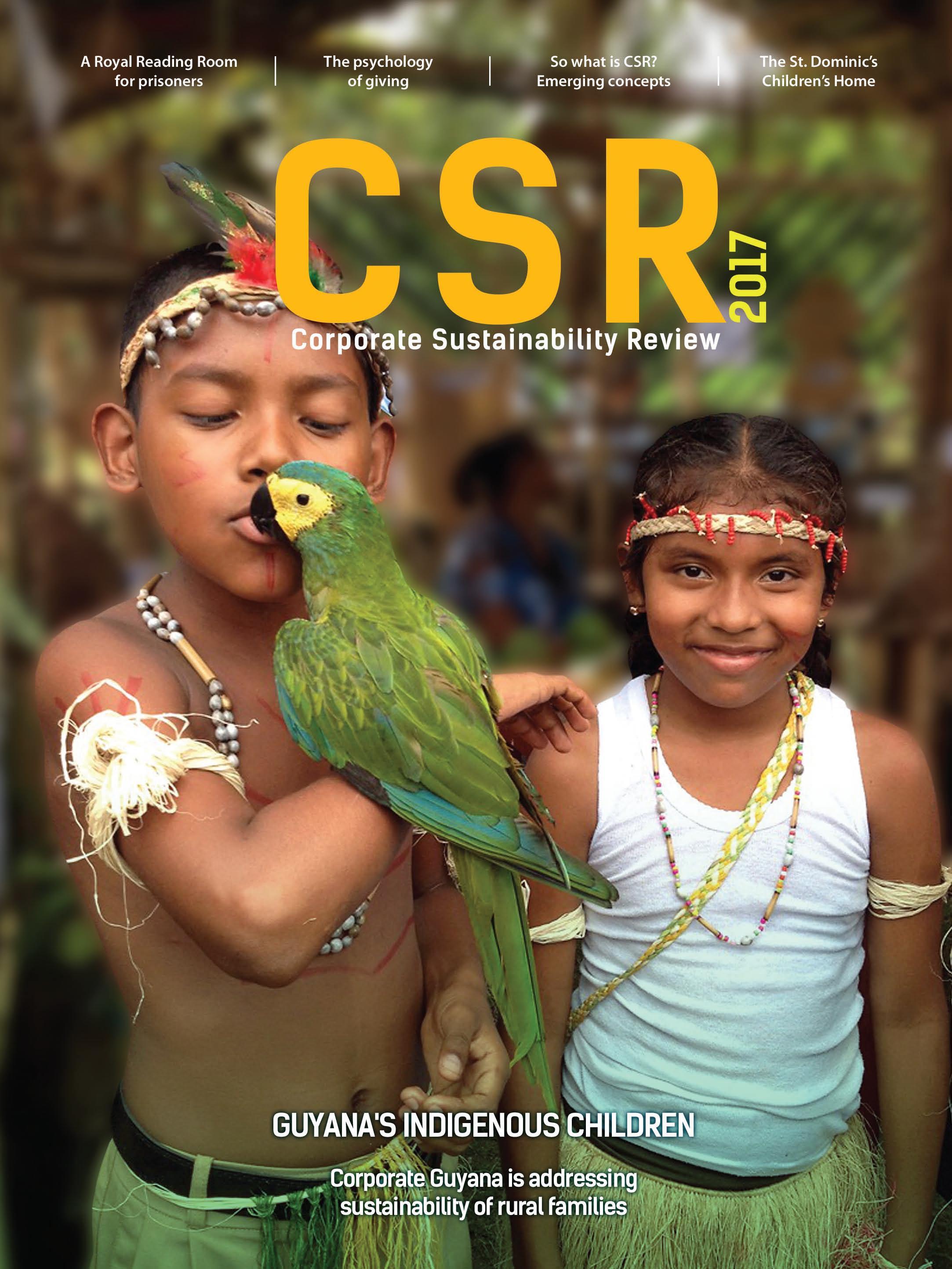

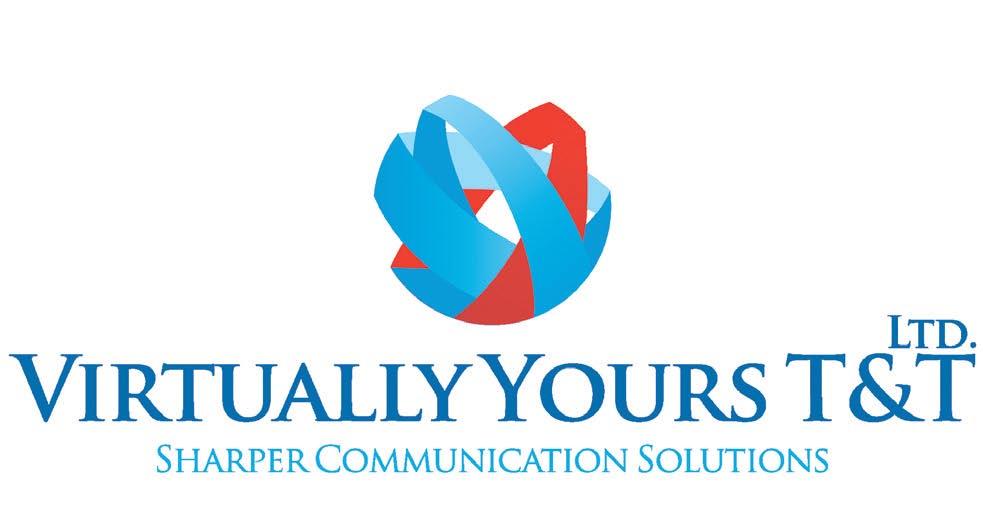
Tel: 1 (868) 622-2663 or 1 (868) 687-3318 Email: team@virtual-tt.com www.virtual-tt.com VYTT’s globally established practices in ethical PR help clients achieve objectives in ways that are good for business and good for communities. Communications Strategies & Audits Reputation & Relationship Management Executive Coaching & Culture Change Publications & Editing Services Media & Stakeholder Relations Corporate Social Responsibility
Corporate Sustainability Review 1 Contents Editorial 3 CSR Stories BPTT’s Beyond Borders The journey to self reliance 4 First Citizens Aligning CSR for relevance 7 Nestlé Driven by purpose, guided by values 9 NGC Engaging the steelband community 12 PETROTRIN Volunteering by numbers 16 RBC RBC employees give back to youth 18 POWERGEN Living in community 20 RBL The power to make things happen 23 SAGICOR Strengthening the brand inside out 26 Conscious Leader First Citizen’s Jason Julien 30 Caribbean Perspectives How CSR is thriving in Guyana 34 New GPC Building shared-value through health and well being 35 Guyana Distillers Limited Poverty alleviation through investment in education 37 SCOTIABANK Focus on indigenous communities 39 Feature Stories The Sterling Stewart Royal Reading Room Prisoners find solace in books 42 The St Dominic’s Children’s Home Corporate voices are needed to help legislate change 45 Opinions Creating Shared Value Can CSR enhance competitiveness? 47 Owning your FUTURE Knowing the mindset, gaining the knowledge 50
The Corporate Sustainability Review features the unique social programmes and experiences of companies from a wide range of sectors including Energy, Finance, Manufacturing, Telecommunication Services, Retail and others as they strengthen communities and transform lives across the Caribbean region.
www.virtual-tt.com
Editor-in-Chief
Donna P. Ramsammy
Deputy Editor
Wendy Singh
Contributing Editor
Joann Carrington
Art Director
Lynn Designs Limited (868-789-0351)
Advertising
Virtually Yours T&T (VYTT)
Production Coordinator
Valery Marin
Publisher VYTT
Photography
PIPS Photography
Photos for CSR stories supplied by the featured company Shutterstock.com
Printers
Office Authority Ltd., Trinidad and Tobago
Contributing Writers
Jaysen Francis
Joann Carrington
Kyle Santos
Monique Mata
Pat Ganase
Robert Clarke
Saarah Khan
Wendy Singh
Publisher:
Virtually Yours T&T Ltd; Francis Lau Street, Woodbrook, POS
Phone/Fax 1.868.622.2663
Email: team@virtual-tt.com
On the cover: Guyana’s Amerindian Heritage celebration where the kids brought their pet parrots to school! - Photo credited to Gabriella Miyares
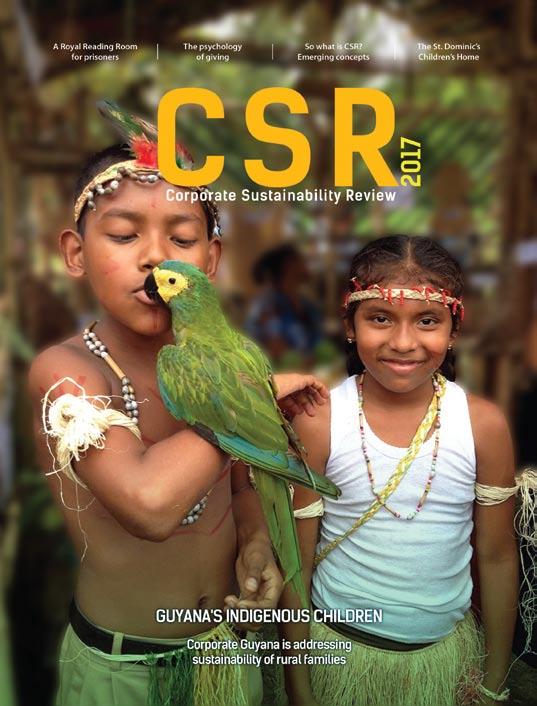
2 Corporate Sustainability Review
No. 1 | 2017
from Garbage: The case for a material recovery facility 53
Role Models
wall of fame 56
Corporate heart & soul 58 A Giving Employee May be a Happy Employee
psychology of prosocial goals and employee happiness 60 So You Call This CSR 62 Corporate CSR Directory 64
Gold
Football
Carenage’s
Volunteerism
The
It’s hard to believe that five years have gone by since we launched the T&T Corporate Social Responsibility Review. This edition is now our fifth in an annual series which examines and profiles the contribution of business to society and how those initiatives are creating shared value and driving sustainability.
James Epstein-Reeves, a Chicago-based expert on corporate social responsibility, philanthropy and cause-marketing who talks about his struggle to describe his work with the constant changes in terms used in the discipline.
Consultant Kyle Santos, who chaired a series of breakfast chats at VYTT in February, also addresses this in his feature on Shared Value and how important it is for CSR strategies to be more fully aligned to business objectives. His firm, Kyle Santos Consulting believes that public/private partnerships can build a better future for all. Santos’ vision is that “T&T’s largest companies will be recognised as the most responsible/ socially relevant in the region, acting as exemplars for others to follow and using their influence to catalyse positive change.”
We also have contributions from young professionals, Monique Mata, Saarah Khan and James Francis, who provide perspectives on environmental issues. Our contributing writer Robert Clarke explores the world of life behind bars and what it takes to reintegrate into society once offenders have served their time. His story is a timely follow up to our interview last year on the TT Archbishop’s call for an amnesty in Remand Yard.
In our very first 2012/2013 issue, we looked at the correlation between CSR and Brand – the Triple Bottom Line. Our second issue (2013/2014) focused on Corporate Governancestrengthening local capability and capacity through education, training and knowledge transfer. In 2014/2015, we examined Citizen Safety and Security and the role of business in supporting programmes that mitigate crime and violence in society. Last year in our 2015/2016 issue we highlighted Investments in Sports to mark the Olympic year. This issue explores the Value of Volunteerism – to business and society.
In this publication, we have made some changes to our name and look. We have modified our name to broaden our remit and refreshed our cover design. Instead of the T&T Corporate Social Responsibility Review (TTCSR), we have renamed ourselves The Corporate Sustainability Review (CSR) to include some of the work being done in neighbouring territories and also to reflect the evolution in terminology from social responsibility towards sustainability and shared-value. It is with this in mind that we have reproduced a humorous article by
As we travelled through the Caribbean this year to see how CSR is being interpreted and delivered, there were common themes of concern being echoed – the breakdown in family life, increase in violence against women and children, drugs and gun crime, institutional corruption, failed leadership, graduates without work and the growing intra-regional migration for food and jobs. In this issue we give you a glimpse of corporate responsibility at work in Guyana.
If we wish to see stronger, sustainable communities, it is clear that we can’t simply depend on governments. Collaboration and partnership are needed to drive change. If we want a better world for our children, we can’t sit on the side-lines. We must get involved by giving of ourselves and our resources. We must volunteer to make a difference.
Our team of writers were inspired by the generous people across the Caribbean who are volunteering to make change possible.
Donna Ramsammy EDITOR-IN-CHIEF

Corporate Sustainability Review 3
Editorial
BEYOND BORDERS
The Journey to Self Reliance
Energy giant BP Trinidad and Tobago (BPTT) is working with The Rose Foundation and the Inter-Agency Task Force of the Ministry of National Security, through the Beyond Borders Programme, to mend divides in society by improving the opportunities available to disadvantaged citizens living in marginalized communities.

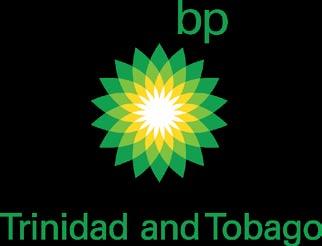
The ‘at risk’ population has been a concern of BP Trinidad and Tobago for some time. With an aspiration to positively impact the lives of every citizen, the company has committed to making strategic interventions that help to improve the development outcomes of this segment of the national population. One such strategic intervention is the Beyond Borders Programme.
The Beyond Borders Programme was developed in 2010 through a partnership between BP Trinidad and Tobago, The Rose Foundation and the Ministry of National Security through its Citizen Security Programme. The programme strives to provide communities with the training and resources to create an enabling environment that is stable, safe and conducive for investments, business development and socioeconomic growth. Beyond Borders has been implemented in some of the poorest, most stigmatized communities in the country and stretches across Trinidad from Moruga in the south-east, to Covigne, Diego Martin in the north-west. Since 2012, BP Trinidad and Tobago and the Rose Foundation are the principal partners with on the ground support from the Inter Agency Task Force.
About The Beyond Borders Programme
Beyond Borders is not the first socio-economic intervention into deprived communities in Trinidad, but evidence suggests that it may be one of the most successful. Speaking with Sterling Belgrove, who heads the Rose Foundation it is clear that his understanding of disadvantaged communities has allowed him to design a programme that delivers results. He said: “Beyond Borders was conceptualized on the understanding that you have a community and in this community you have streets and each street is a separate
zone, normally referred to as blocks or turfs. These zones represent countries in themselves; they represent sovereign spaces. In a contrary way, these turfs/blocks and gang wars arise out of a sense of alienation. So citizens of the country feel like aliens in their own country.”
He further explains that “marginalized communities often create alternate systems and frameworks of governance, administration and justice. Social systems and economies emerge, which are not compatible with acceptable national systems. The deviant structures trigger the formation of ‘gangs’ or ‘cliques’, and other appellations as are specific. While these sub-institutional frameworks mimic formal structures, they are void of the values which drive those structures.”
It is this knowledge and understanding that has allowed the Rose Foundation to develop a unique methodology to guide their work in the communities targeted by the Beyond Borders Programme. Marcia Belgrove, co-founder of The Rose Foundation said of their methodology: “In the first instance we identify the organizations working in the community. So, you get an assessment from those persons who are already working in the community. Then, you do an informal walkabout, speaking to the community. You are introduced. From that conversation you can extract information from the things that are said and the things that are unsaid…building respect along the way. The other thing is you begin the process of legitimizing these organizations, so that’s training and development.”
4 Corporate Sustainability Review
CSR Story
Mrs. Giselle Thompson, Vice President Corporate Operations, BPTT and Mr. Sterling Belgrove, Founder of the Rose Foundation
Sterling Belgrove adds, “The training addresses social issues, legal issues, skill issues, capacity issues, it does mapping of the community, looking at the resources within the community and how they can be harnessed and channeled into resource mobilization.” Training is carried out in conjunction with the Ministry of National Security Inter-Agency Task Force (IATF) and funded by BP Trinidad and Tobago.
Since the start of the training initiative in 2010, thirty-five organisations have been formed across the communities enrolled in the Beyond Borders Programme, resulting in community-based business start-ups in the areas of bottled water, construction, graphic arts, photography/videography, transportation and catering. Twelve experiential work sessions were conducted with nineteen organizations.
Spotlight on Beetham Gardens
One of the first communities to benefit from the Beyond Borders Programme was the Beetham Gardens. During the first phase of the intervention launched in 2010, the Rose Foundation and its partners focused intensely on the training of community residents. Residents were enrolled in classes that instructed them in the formation of nongovernmental organisations (NGOs) that could help develop their community. In the Beetham, five NGOs were formed.
In 2013, the sustainability phase of the programme was launched. In this second phase, the residents developed their entrepreneurial skills using the business incubator model. Several businesses were formed, including but not limited to, photography and videography services, environmental and sports organisations and catering. It is the goal that the training provided in phase one and two will allow residents to add a for-profit element to the already established NGOs that could help to sustain them.
Due to the success of the programme in the Beetham, in 2014 the Chairman of the BP Group, Carl-Henric Svanberg visited the community on his first ever official visit to Trinidad. Svanberg had personally requested to visit communities touched by the intervention. He said that “from the first time I heard about this programme, I wanted to come to see it. There is nothing more important than helping others to find their way.” When the Chairman arrived in the Beetham on April 30, 2014, he buried a time capsule of aspirations for the Beetham community. The time capsule is to be opened in 10 years, after which residents can assess the Beetham’s progress towards its transformation goals.
Two years later, as part of the fulfilment of the community’s vision for the Beetham, as recorded in the time capsule, residents benefitted from a special Beyond Borders project
entitled the Beetham Gardens Beautification Competition. For the competition, each Phase of the Beetham was divided into five distinctive gardens, residents of each Phase were encouraged to participate in a friendly competitive community process of beautification and enhancement to rebrand the community as a safe and welcoming place.
As a prelude to its initiative to transform Beetham Gardens, the Rose Foundation started with a clean-up campaign that removed some 40 tons of garbage in the area. The competition was launched on the 30th of November, 2016, after which, 12,000 seedlings (flowers and food crops), tools and soil were distributed to households and the five NGOs formed through the Beyond Borders Project.
The competition was extremely successful. Approximately 200 residents participated in the project. Kerwin Alexander, Chairman of One Call Foundation, and pioneer of the Beetham Gardens’ Beyond Borders coordinating group said the competition was like,“…a breath of fresh air blowing in the community.” Not only was the community beautified but food crops were sown and residents like Tifari Sobers started a business selling the vegetables grown during the competition at his roadside stand. The competition ended on 15 March, 2016 and over 40 residents were awarded prizes for their efforts.
Nineteen organizations participated in experiential workshops.
1. All Mansions of Rastafari
2. Mon Repos Development Foundation
3. Upper Cemetery Street Residents Association
4. Each One Teach One Children’s Foundation
5. First Touch Football Association
6. Positive Impact Foundation
7. With God All Things Are Possible (WGATAP) Foundation
8. Amethyst Family Foundation
9. St. Barb’s Transformation Foundation
10. St. Barb’s Reformation Foundation
11. KV Lifeline Foundation
12. Gonzales Advocacy Partnership
13. Inter-Agency Task Force Hearts and Minds Programme
14. Excel Government Primary School
15. St. Joseph Government Primary School Parent Teachers Association
16. D’vine Care Foundation
17. Friends of St. Barb’s Community Council
18. Choice Solutions
19. MARY Foundation
Corporate Sustainability Review 5
The Way Forward
Sustainable change resulting in transformation requires consistent and repeated activities. Sterling Belgrove is convinced that engagement over the next three to five years will produce transformation among the residents in the focus communities from the current reality to hopeful and productive lifestyles. Although the current downturn in the national economy inhibits business returns among the startup entrepreneurs, it challenges all participants to do more, and to do so creatively.
Some of the projects in the programme that will ensure sustainability include:

• Establishing a Grassroots Chamber of Commerce and Carnival Vendors Association;

• Operationalising of three water plants, one of which is in Beetham Gardens;
• Establishment of alternative energy labs;
• Pigeon Peas product development, including testing and certification; CARIRI
• Operationalising the Positive Impact Foundation sewing facility;
• Setting up offices for start-up NGOs;
• Continuous training for newly established organisations in focus areas;
• Development of more enterprises in each focus area, through recruitment and on-going training of residents.
BPTT will continue to support the Beyond Borders Programme because, according to the company’s Manager, Corporate
Responsibility, Ronda Francis “Targeting ‘at risk’ youth remains one of the main pillars of our corporate responsibility strategy. We depend on the ‘know how’ of NGOs like the Rose Foundation to understand the ‘bottom up’ approach and we depend on the political will of the government through its agencies to reach out to communities like Laventille and the Beetham. This is why Beyond Borders is now considered one of our signature CSR programmes and we are looking forward to its continued success and the transformation of disadvantaged communities in Trinidad.”
Incorporated for-profit companies arising out of the Beyond Borders Intervention have received technical support in the preparation and submission of prequalification packages for state contracts as follows:
1. JDK Contractors Limited, St. Barbs
2. J. Craigwell Maintenance and Construction Services Limited, Gonzales
3. Trilogy Transport and General Services Company Limited, Mt. D’or
4. El Luengo Development Company Limited, El Luengo
5. St. George East Development Company Limited, St. George East
6. Jeremiah and Bernadette Company Limited, Mt. D’or
7. Far Eyes Security Company Limited, Laventille
6 Corporate Sustainability Review
Community, Rose Foundation and BPTT representatives view recently cultivated land on the Beetham
Mr. Sterling Belgrove, Founder of the Rose Foundation, Mrs. Ronda Francis, Manager Corporate Responsibility and Senator the Hon. Clarence Rambharat, Minister of Agriculture, Land and Fisheries
Beyond Borders: The Journey o Self-Reliance (continued)
Aligning CSR for relevance
“We are restructuring our externally facing teams to better serve our communities and customers.” So says Dexter Charles, Manager - Group Corporate Communications at First Citizens Trinidad & Tobago. Charles referenced the addition of a fourth strategic pillar to the Group’s CSR agenda.” In addition to the three existing pillars, Community Relations, Sport and Youth Development & Education, we now have four areas of focus with the inclusion of Women’s Issues”, he explains.

The new structure will also mean that Charles’ team can redesign its CSR programmes to be more fully aligned to business objectives. Charles is fixed on the notion of shared value – that projects must reflect a symbiosis between customers’ needs and the business of the Group. Already, many of the CSR activities are targeted towards women.
well as giving them a voice. The idea had its genesis with former Deputy CEO Sharon Christopher who saw the value in addressing gender-based interventions in favour of the Group’s predominant customer base.
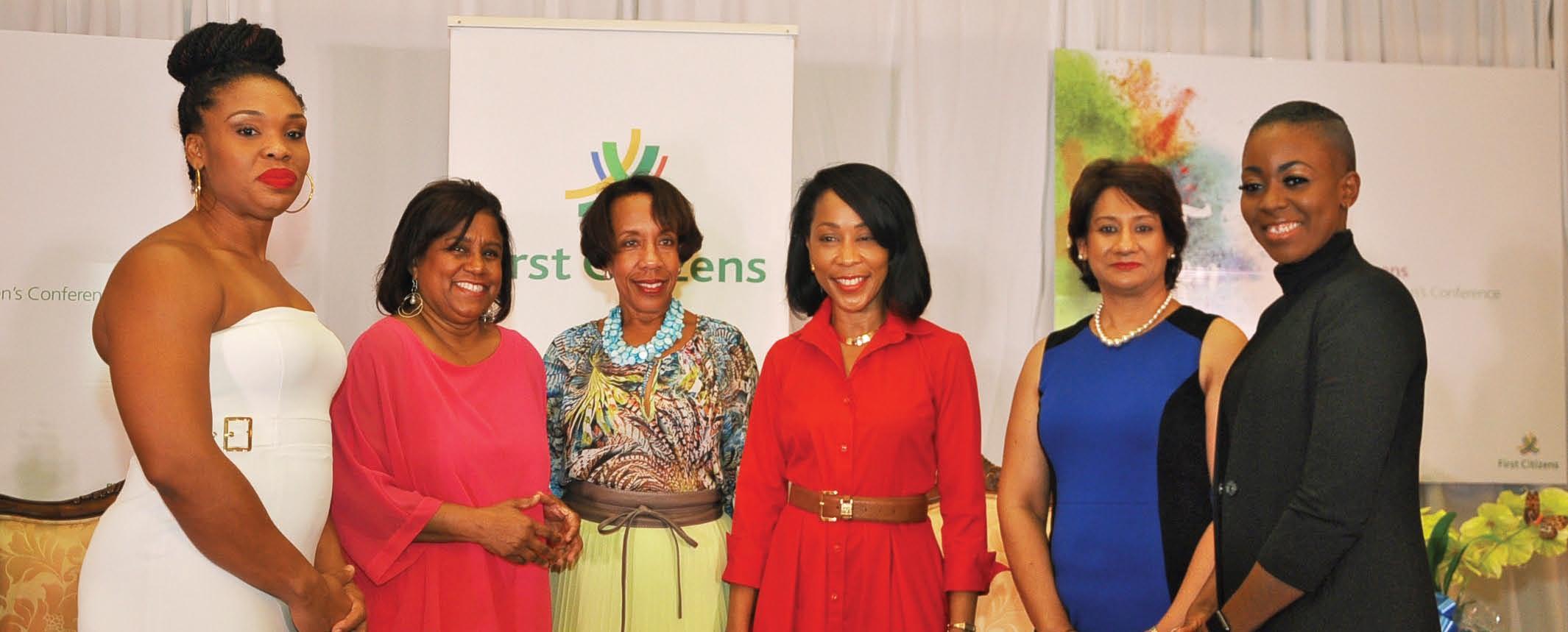
Fighting violence with the Pink Card
In a separate interview, Deputy CEO Jason Julien acknowledged that 80% of the Group’s employees were female. This thrust towards alignment of needs and interventions is referred to by the Group as ‘social harmony’.
Women’s Issues
Under the umbrella of women’s issues, a number of interventions have been undertaken by the Group – all aimed at improving the lives and wellbeing of women as
The Group’s flagship programme, ‘The First Citizens PINK Credit Card’ which was launched in 2011, is the first such credit card for a cause in the local market. Funds raised through monthly contributions by card holders go towards projects aimed at “Ending Violence Against Women”. Monthly debits of $25 to $100 are agreed during the application process and monies are disbursed bi-annually, in April and November, to established Non-Governmental Organisations (NGOs), to assist in the funding of their operations and programmes. Beneficiaries of the PINK Card are the Coalition Against Domestic Violence, the Rape Crisis Society of Trinidad and Tobago and the Couva Children’s Home in central Trinidad. The First Citizens Group also seeds $200,000 into the Pink fund annually.
In terms of monitoring and evaluation, the First Citizens PINK Card Fund is managed by a PINK Fund Committee which provides oversight and assures transparency. The committee is comprised of five members - two senior First Citizens staff and three independent members. In addition there are two accountants assigned to the committee – one internal, a First Citizens member and another independent member.
Corporate Sustainability Review 7
“This feels right”, says Charles, “since over 60% of our customers are female.”
CSR Story
L-R: Cleopatra Borel, Minister of Trade & Industry Hon. Paula Gopee-Scoon, Ms. Sharon Christopher, Mrs. Sharon Rowley, First Citizens CEO Ms. Karen Darbasie and Ms. Faye Ann Lyons
Annual Women’s Conference
2017 marks five years since First Citizens launched its Annual Women’s Conference. The event is marked in three of its operating territories – St. Vincent & the Grenadines, Barbados and of course Trinidad & Tobago. The objective is to strengthen networks among female professionals, “aimed at bringing about constructive change and building stronger relationships,” according to the Group.
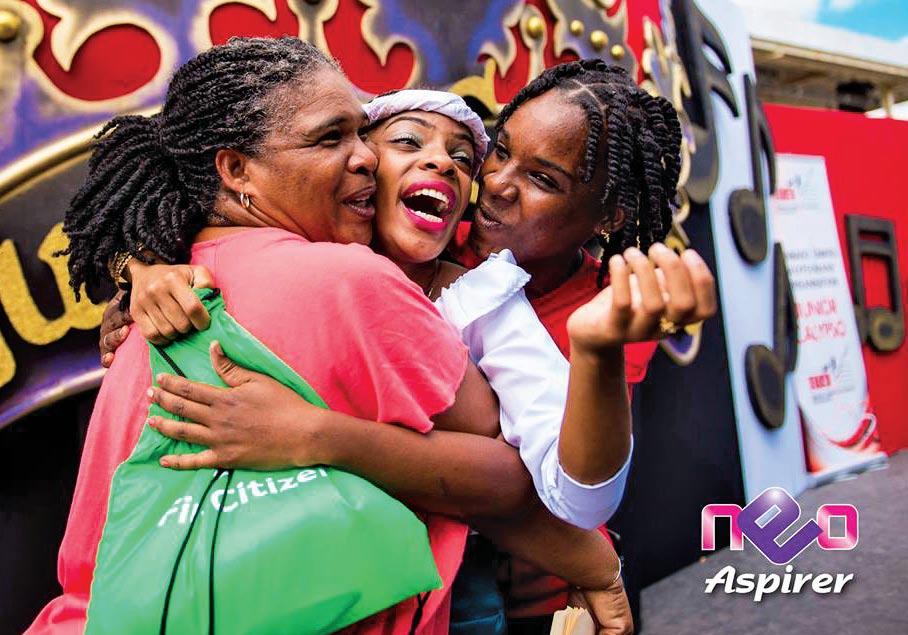
In June of this year, over one hundred women attended the First Citizens Investment Services (FCIS) Women’s Conference in St. Vincent. Themed ‘Boldly Live a Life You Love’, a formidable line of up speakers included Trinidad’s Ms. Sharon Christopher and First Citizen’s Country Manager-FCIS, Ms. Norlan Gabriel, Country Manager.
Christopher, gave a one-hour presentation on, ‘Life: Make it Happen vs Let it Happen’. She outlined strategies to guide women towards setting goals and doing the necessary to achieve them.
With topics aimed at empowering women such as “Ten Characteristics of Bold Women”, Gabriel said that the conference was designed to help women evaluate and make changes in their lives. Gabriel also led a panel discussion, called “Woman to Woman –Issues and Answers”, which delved deeply into workplace issues and ideological and psychological shifts needed to navigate success.
Central to the St. Vincent event was empowerment through financial independence which was masterfully delivered by Ms. Brenda Pope.
Says Group CEO Karen Darbasie, “We at First Citizens acknowledge women as the caregivers of this country. We are giving women the opportunity to have that space to develop
and grow.”The proceeds from this event are channelled into the First Citizens Pink Credit Card Fund.
Youth engagement
Dexter Charles speaks with excitement about the work his organisation does with youth. Most notably are the Spoken Word which has become an important calendar item at the annual Bocas Lit Fest; and calypso competitions delivered in partnership with the Trinidad United Calypsonians Organisation (TUCO). The Bocas Lit Fest and the Steelpan and Jazz Festival are among the more popular programmes First Citizens sponsors. While the investments in arts and culture are rewarding, so too are the schools programmes which the staff take on voluntarily and the Group’s long association with sport.
This year the First Citizens Sports Foundation will hold its 55th annual Sports Awards Ceremony to celebrate Trinidad & Tobago’s professional athletes in more than 30 disciplines. The company also works with clubs and national organisations to promote cricket, football and chess as well as a number of other outdoor and indoor sports. First Citizens is also a key sponsor of the UWI Half Marathon.
The First Citizens staff are passionate about sport. Every year they turn out in numbers at the Carifin Games. The organisation is Gold Sponsor of the event in which participants compete in cricket, football, aerobics burnout and all-fours. This is all built around a Family Day aimed at making the event fun.
Staff also work with United Way of Trinidad & Tobago in their annual Day of Caring through Habitat for Humanity or creating vegetable grow-boxes with various primary schools. Says Charles, “Volunteerism is part of the First Citizen DNA and we are working on developing a more structured volunteer programme that will see a bigger engagement of staff in social issues – from the boardroom to the counter.”
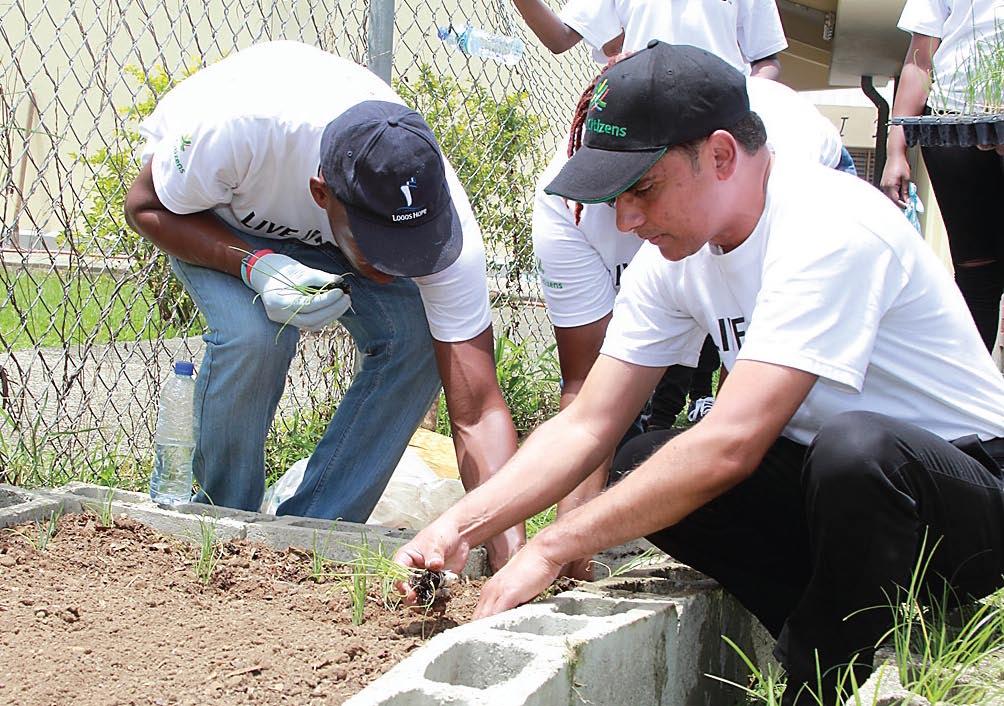
8 Corporate Sustainability Review
Calypsonian Shervon Rodney cerebrates her win with her mother and twin sister
First Citizens Castara Project - Deputy CEO Operations and Administration Mr. Sterling Frost works alongside a team of First Citizens staff on planting grow boxes at Castara Government Primary School, Tobago
In May 2017, the employees of Nestlé Trinidad and Tobago came together at a special Open House for the internal launch of the “Nestlé Purpose.” It’s part of a global initiative that will guide Nestlé, the world’s largest food and beverage company, across the 189 countries in which it operates.
Grounded in Nestlé’s 150-year tradition of social responsibility, The Nestlé Purpose can be summed up in one simple sentence: “Enhancing quality of life and contributing to a healthier future.”
For Nestlé, this is not a communications exercise. “The Nestlé Purpose is the reason we exist,” says Corporate Communications Manager, Denise d’Abadie, “it is what motivates us and gives meaning to what we do - it articulates our desired impact on the world.”
“We believe a clear purpose defines why the world is a better place with Nestlé. It explains how we make life better for those who enjoy our products and services, and better also for all those with whom we interact — our partners, our communities, our environment,” she says.
A Compass for Employees: The new Nestlé Purpose will be the compass for the company’s 328,000 employees around the world, providing them with direction and clarity. It will drive and guide Nestlé at three levels:
1. As Nestlé inspires individuals and families to live healthier and happier lives, through its products, educational programmes and more.
2. As Nestlé helps improve livelihoods and develop thriving communities through education programmes, employment opportunities and commitments to human rights.
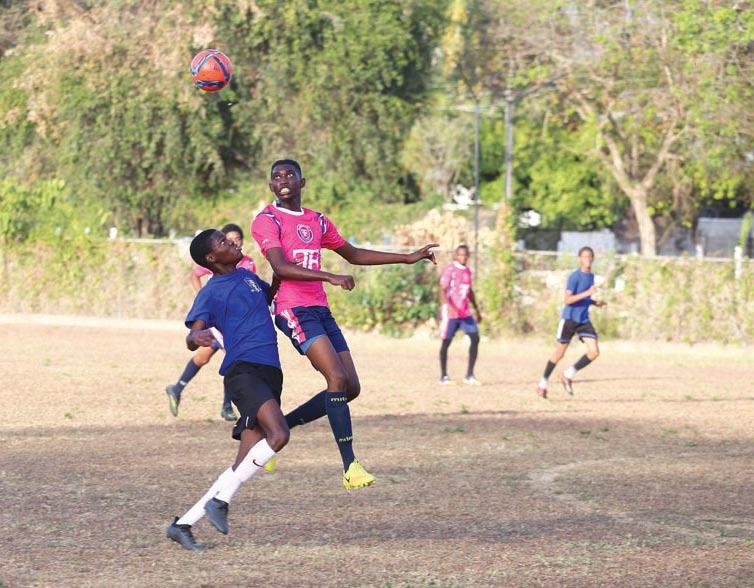
3. As Nestlé strives to ensure the wellbeing of the planet by stewarding resources for future generations. “At each of these levels — how we make an impact on individuals and families, the community and the environment — Nestlé has specific and measurable commitments,” says Mrs. d’Abadie.
Individuals and Families: At the individual and family level, Nestlé will fulfill its purpose by further improving its products
to offer tastier and healthier choices. When you consider that Nestlé delivers more than 1 billion servings of foods and beverages every day worldwide, it is clear that the company is uniquely positioned to drive optimal health and improved wellness.
In fact, Nestlé was the first company in the world to make a formal pledge to reduce sugar, salt and trans-fat in all of its products. Internationally, in just ten years, Nestlé has reduced the sugar content of its products by more than 30%, and the company continues to reduce the sodium content of its products to help consumers achieve a sodium intake of 2g per day, in line with World Health Organization (WHO) guidelines.
Here in Trinidad and Tobago this focus on product improvement has seen the introduction of innovations like ORCHARD® Calorie Conscious, developed to help consumers seeking to live a healthier lifestyle through weight management, as well as those who are diabetic and need to control their sugar intake. Meanwhile, breakfast cereals sold in Trinidad and Tobago have been improved to include more
“Here at Nestlé, we are driven by a simple purpose: enhancing quality of life and contributing to a healthier future.”
Corporate Sustainability Review 9
Driven by purpose, guided by values
CSR Story
Football Factory Football players
Whole grain than any other ingredient, with total sugars reduced to 9g or less per serving, and salt to 135mg or less per serving.
party audits to maintain that certification, Nestlé is already the Caribbean leader in recycling, waste reduction, water stewardship and waste-water management (Nestlé’s internal waste-water treatment plant was the first of its kind in the Caribbean). In line with the Nestlé Purpose, the company will maintain challenging targets in these areas as it demonstrates its care for these resources and its respect for the future.
Nestlé’s brands have already embraced the Nestlé purpose through programmes that enhance the quality of life of individuals, families and communities. The MILO Jumpstart Programme, for example, promotes healthy living by encouraging physical activity, while the MAGGI Power of a Meal programme teaches families the basics of nutrition on a tight budget and provides them with information and seedlings so that they can grow their own food.
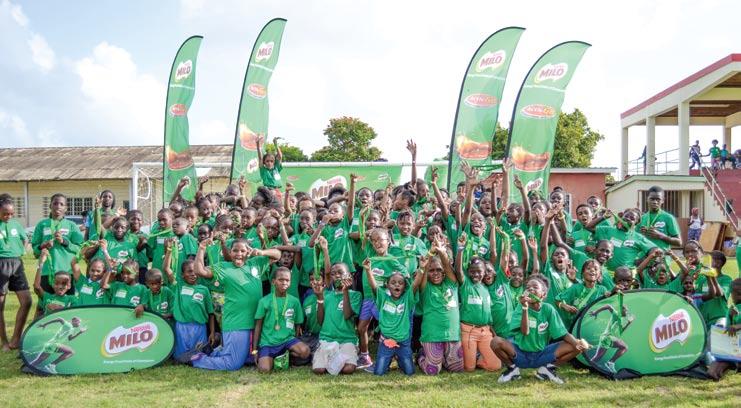
The Community: In terms of the community, the Nestlé Purpose will be expressed at several levels, for instance through the company’s commitments to promote decent employment and diversity, and via special community initiatives such as Nestlé’s recent partnership with the Football Factory, a football academy which helps at-risk children learn life skills. Nestlé will also continue its effort to build stronger communities through its Dairy Development Programme which helps farmers improve productivity, save money and create sustainable operations.
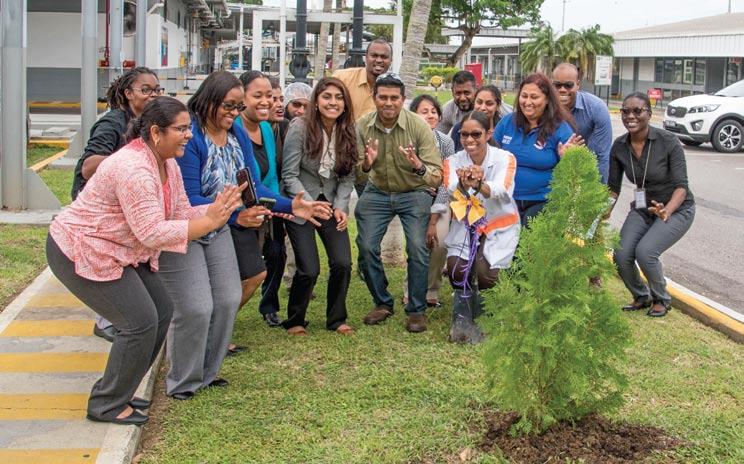
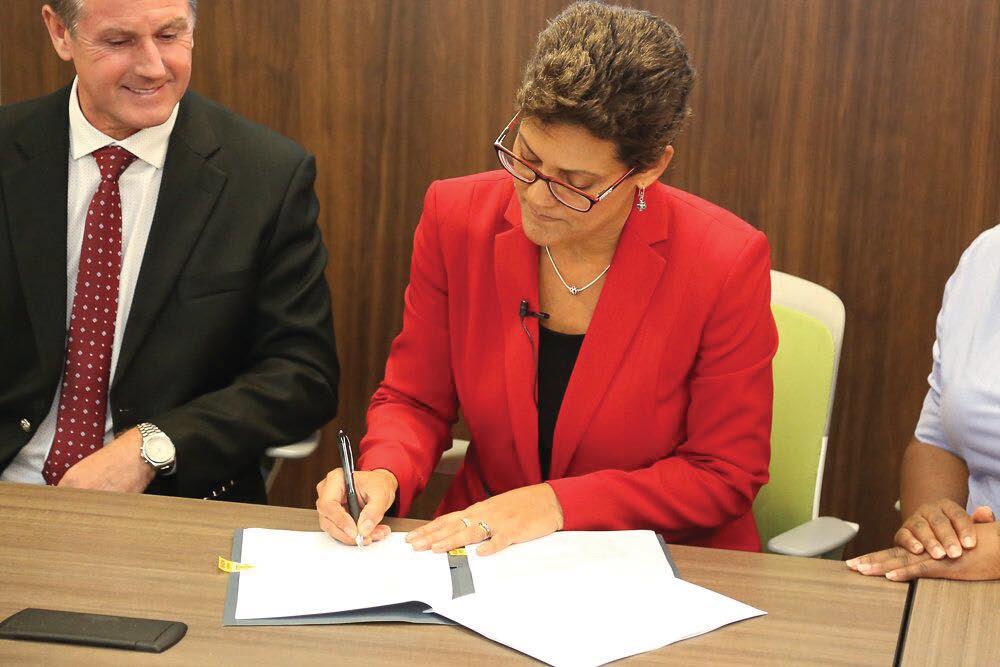
The Environment: ISO14001-certified in safety and environmental systems, with regular independent third
“Aligning ourselves and our operations to the Nestlé Purpose means we can offer many good arguments to convince consumers that when they choose one of our brands they don’t just enjoy a tastier and healthier product, they also help make the world a little better,” says Mrs. d’Abadie, “Nestlé is a large company and because we are large we can make a big positive impact. When we string all our projects, initiatives and activities together it becomes clear what a tremendous difference we can really make.”
Nestlé’s purpose is enhancing quality of life and contributing to a healthier future. We want to help shape a better and healthier world. We also want to inspire people to live healthier lives. This is how we contribute to society while ensuring the long-term success of our company. Our values are reflected in the way we do business, always acting legally and honestly with respect both for our own people and those with whom we do business.
2.
3.
4.
5.
10 Corporate Sustainability Review
“Our values are rooted in Respect: respect for ourselves, respect for others, respect for diversity, and respect for the future.”
Nestlé Employees commemorating World Environment
Day
Milo Jumpstart Programme in Tobago
Football Factory Sponsorship Signing
Nestlé lives its values
We serve with passion
How
1.
We build for the long term
We are inspired to innovate
We always strive to do better
We grow and succeed together
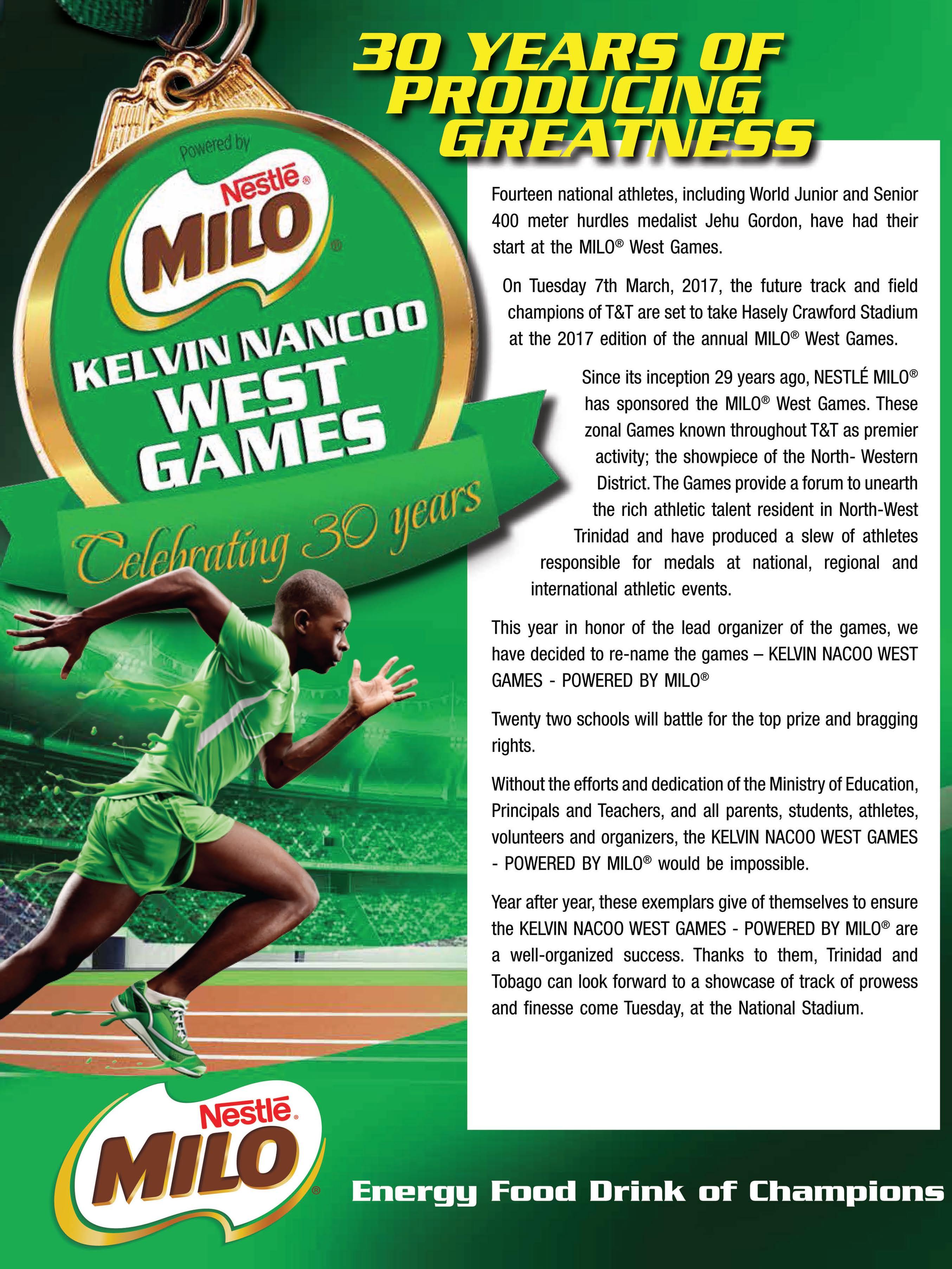
Engaging the steelband community
The late Rt. Honourable Dr. Eric E. Williams, the first Prime Minister of Trinidad and Tobago, said in his 1970 Budget Speech:
“It is for us to utilize these assets for the national benefit, so that by the end of the decade we can look back upon an era of unprecedented economic and social development”.
The rest is history. Our natural assets have provided the backbone of our social, economic and cultural development. Specifically, in recent times, a lot of our social development has been supported by the Corporate Social Responsibility (CSR) Programmes of locally operating and local companies. NGC has been a leader in this development, designing programmes that influence a wide variety of fields, from the Arts to Sport and Youth Development, and also in projects that build solidarity and empowerment in many communities throughout the country.
NGC’s stated policy of Corporate Social Responsibility (CSR) is to “integrate social, environmental and economic concerns into values, culture, decision-making and strategy and to contribute to the economic, social and environmental sustainability of the communities in which we operate.” In short, to create shared value for its multiple stakeholders across the nation.
NGC began its national steelband assistance programme in 1992, specifically to support bands that were without sponsors. Over time, with the realisation that the traditional ‘pan round de neck’ bands were receiving very little support from corporate Trinidad and Tobago, NGC concentrated its support on that segment of the fraternity.

Ever since the invention of the steelpan and the start of organized groups coming together to make music, steelband entities have attracted youths, creative individuals and whole communities in support of our local culture. Mindful of this, there was indeed a natural fit for NGC, a national company, to assist in the continued development of our national instrument, the steelpan. It is with this potential that The National Gas Company of Trinidad and Tobago Limited (NGC) deepened its involvement in the national instrument
by making calculated investments, using four community steelbands as models.
In 2012, a more structured approach to steelbands was adopted through full sponsorship of:
• NGC La Brea Nightingalesa large band from La Brea
• NGC Couva Joylandersa medium band from Couva
• NGC Steel Xplosiona medium band from Carnbee, Tobago
Gonzales Sheikers Steelband a single pan band from Gonzales in POS, was also supported under a designated agreement.
NGC La Brea Nightingales Steel Orchestra
The band has continued to perform creditably in the Panorama Competitions and qualified for the finals of the Steelband Music Festival 2014. The band is featured regularly in Point Fortin Borough Day celebrations, Pan in the Countryside and several other engagements.

The NGC sponsored Music Literacy Programme was well received by the band and has attracted growing interest from the wider community. Over 250 persons have participated in the four years (2013-2016) of its existence.
Also capacity building initiatives have been well received with all members of the band’s management being exposed to training. A new constitution was crafted in 2015. This fosters greater transparency and positions the organization
12 Corporate Sustainability Review
CSR Story
NGC La Brea Nightingales Steel Orchestra practices for Panorama
to be a leader in the community. The La Brea Nightingales Steelband has used the funds from the wealth generation investment to purchase computers for a training centre and a flat-bed truck for transportation services. The current economic situation has, however, limited the ability to achieve projected returns in the short-term. However the future remains very bright despite challenges.
NGC Couva Joylanders Steel Orchestra
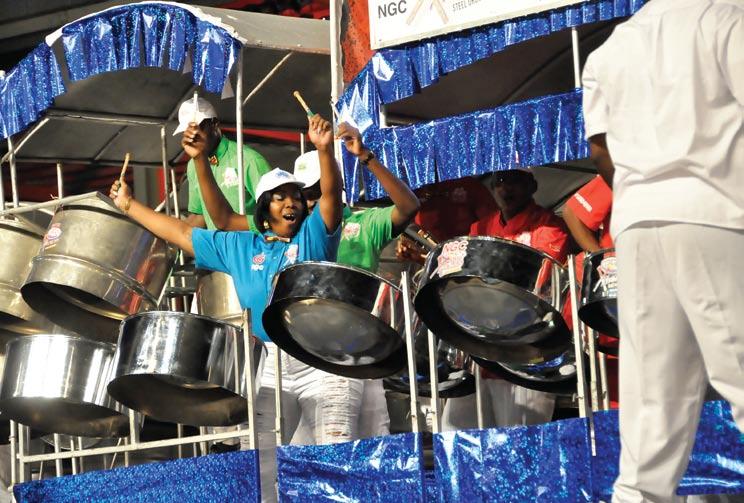
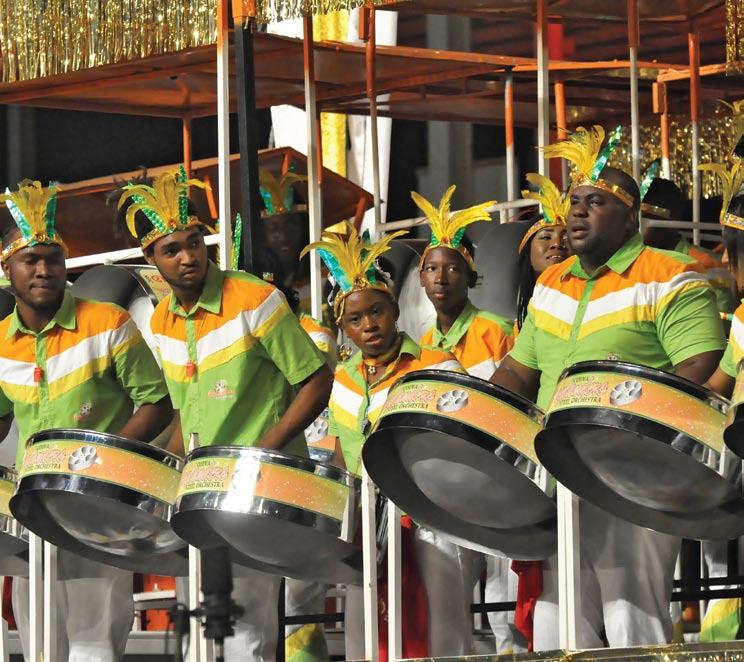
This band is blessed with arguably one of the best pan theatres in the country having been the recipient of brand new premises provided by NGC in 2012. The pan theatre called NGC Couva Joylanders House of Steel supports a range of activities in the Couva community and fosters NGC’s youth development activities with the NGC-sponsored Couva Police Youth Club.
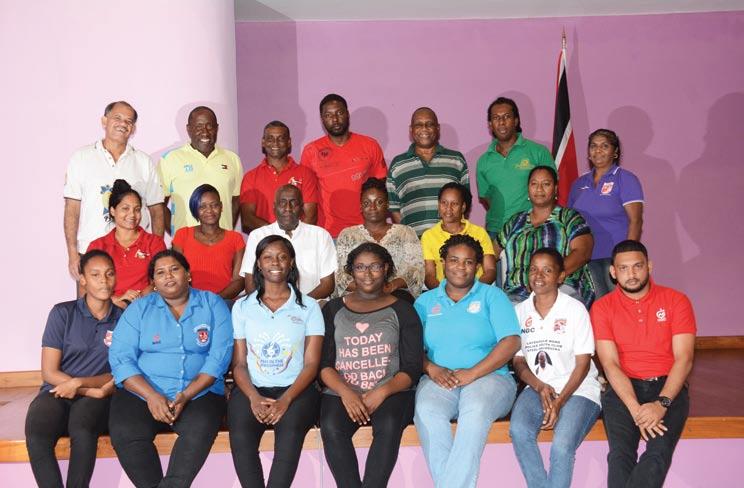
The NGC Joylanders Band also continues to improve the skills of its members in various percussive instruments through the company sponsored Music Literacy Programme. Fourteen stage side members graduated from the programme in 2015. Another programme, capacity building workshops provide the band with much needed management skills that focus on Process Management and Systems; Facilities Management; Marketing and Social Media; Image Management; Accounting; Event Planning; Etiquette and Protocol; Team Building and Leadership and Communication.
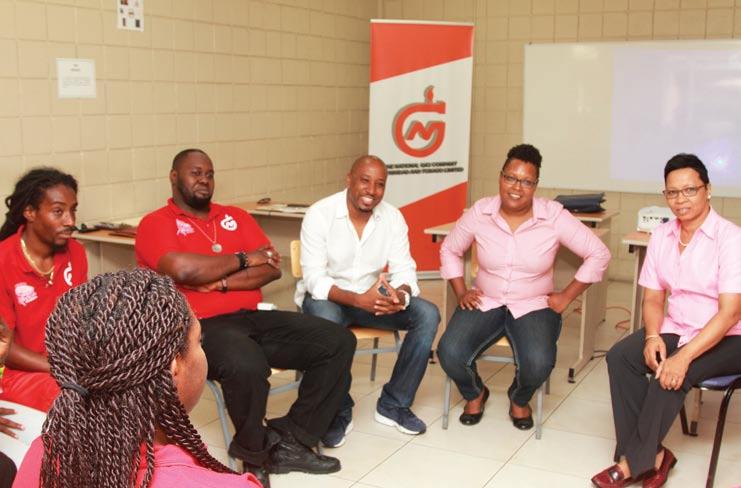
During the carnival season, the NGC Joylanders usually delivers admirable performances at the National Panorama Competition they placed:
• 5th in the medium band category and 1st place in the People’s Choice Award in the medium category in 2016; and
• 3rd place in the People’s Choice Award in the medium category in 2017.
NGC Steel Xplosion Steel Orchestra
NGC Steel Xplosion’s participation in the National Panorama Competition has been noteworthy. The band placed 3rd in the medium band size category and won the Tobago House
Corporate Sustainability Review 13
NGC Steel Explosion attends capacity building training. At centre is Myles Lewis, Community Relations Officer - NGC
NGC Couva Joylanders Steel Orchestra
NGC Steel Xplosion Steel Orchestra
NGC sponsored groups attend Capacity Building Graduation
of Assembly (THA) Pan Champs title in 2015. The 3rd place finish qualified the band to participate in the inaugural International Panorama Competition hosted in Trinidad and Tobago in August 2015 which featured bands from around the globe.
In 2016, the NGC Steel Xplosion placed creditably at the National Panorama Finals and at the THA Pan Champs. Later that year, the Band completed an organizational strengthening exercise out of which a constitution and a three-year strategic plan were completed and an executive board elected.
NGC Steel Xplosion has also capitalized on capacity building to improve the skills and abilities of its members. This augurs well in a community that has unique opportunities for tourism. They selected skills training programmes aimed at strengthening internal competencies such as: Fundamentals of Management Principles and Practices; Financial Management and Marketing; The Business of Music and Intellectual property and Facilities Management.
Gonzales Sheikers
The band made up mostly of children and young adults continues to excel in community outreach efforts. A music literacy programme is being initiated along with a Pan Family Day and Emancipation Community Awards hosted annually. During the period 2013 to 2016, 85 persons participated in the Music Literacy Programme.
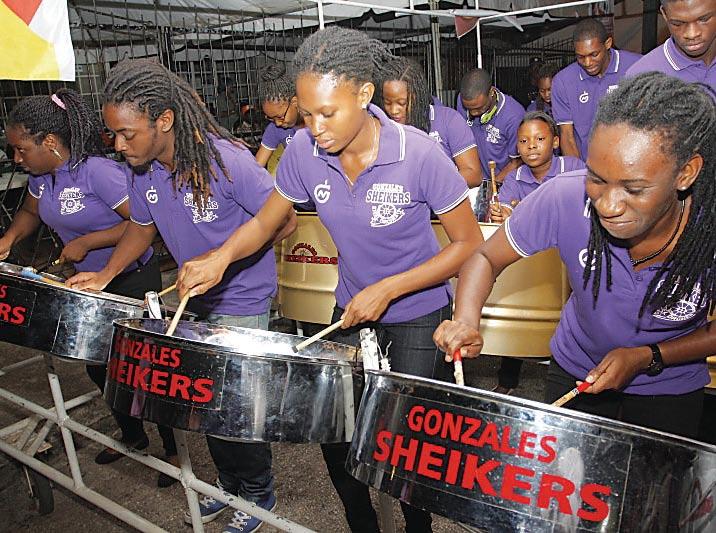
In response to training received, the band also revised its operations procedures and has utilized the funds provided from its wealth generation venture to supplement the cost of hosting fundraising projects (social events). In 2015, NGC refurbished a pan theatre for the band and this has served to enable further entrepreneurial activities and to provide a “safe space” for the youth. The band has developed an association with the neighbouring, Escallier A.C. Primary School to provide new players and also to keep the youngsters engaged in positive activities, such as a dance programme. There are plans to support the school by providing a music tutor.
A corporate tradition of investment in sustainability
NGC’s extensive involvement with the national instrument and the development of the steelband is consistent with its CSR thrust in promoting national culture. This however, is just one area of strategic intervention in NGC’s social investment programme. Over the years the Company has invested heavily in key areas of sustainability – namely, Arts and Culture, Sport, Education Empowerment and Youth Development and Environmental Preservation.
14 Corporate Sustainability Review
The Gonzales Sheikers Steelband perform at Panorama
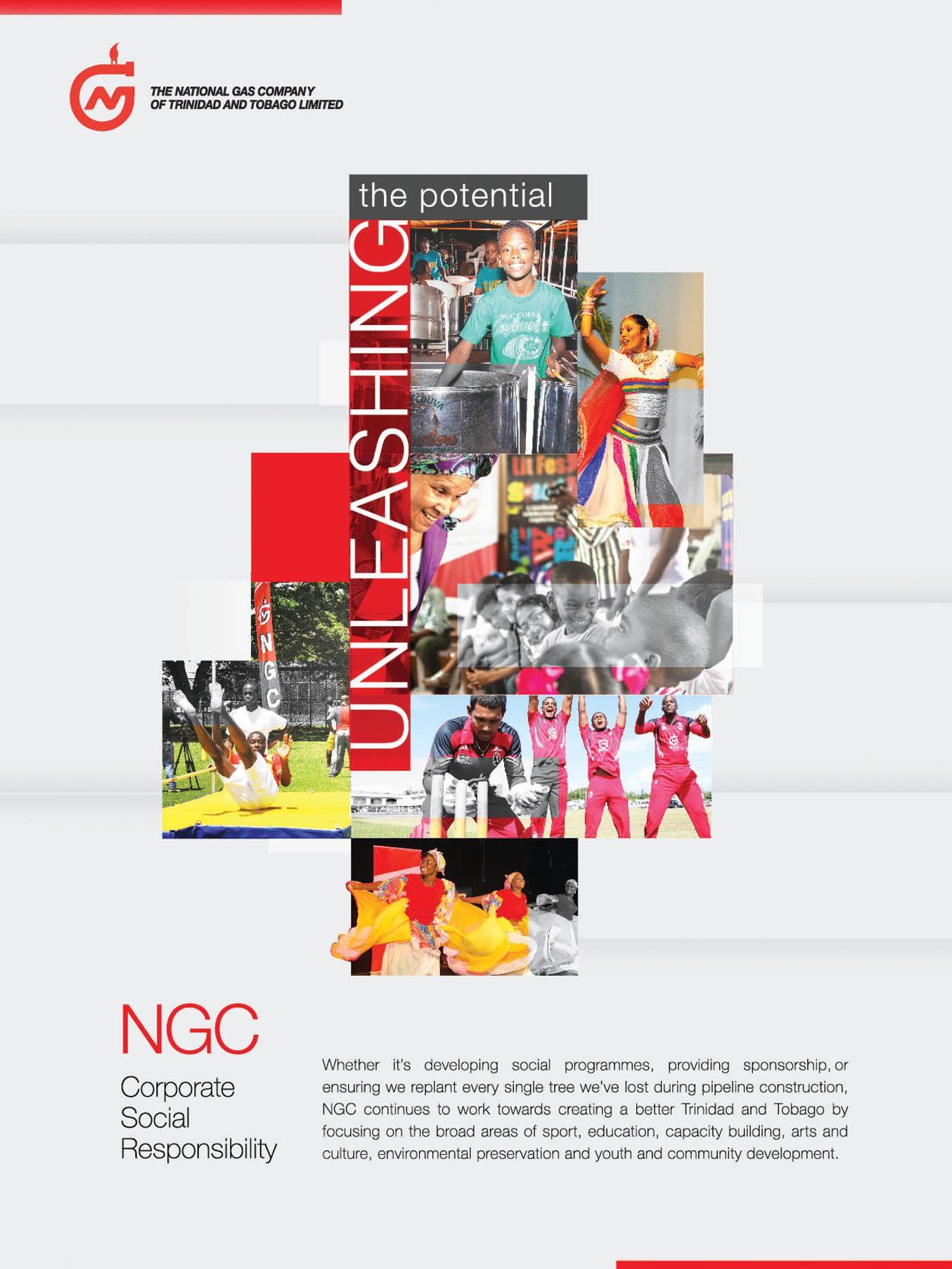
Volunteering by numbers
The numbers have been logged: 716 employees strode and sweated to raise awareness of prevalent diseases, $165,000 was donated to foundations that support people with those diseases, and 10,000 food items have been supplied to children in need of nutritional support.
In 2012, Petrotrin’s Corporate Communications department created a simple framework for tracking employee engagement. It was an acknowledgement that longstanding volunteer projects in their neighbouring “fence-line communities” weren’t quite as cohesive as they’d have liked, and it soon became a priority to assemble a disparate array of initiatives into an organised volunteerism agenda that focused on Education, Sport and Culture, and Community Empowerment.

The new agenda meant promoting events that could turn out staff in large numbers — an annual walkathon to promote disease awareness, a Christmas toy drive, a July/August Vacation food drive — and challenging themselves to match or surpass attendance and fundraising benchmarks.
The 2017 walkathon, for example, turned out 100 staff members, which didn’t quite equal the high of the first walkathon in 2013, but also contributed $40,000 to the violence and suicide hotline, Lifeline, which was more than they’d ever raised in the event’s five year history.
The figures are a good gauge of employee engagement, but they don’t show the full picture of an ongoing commitment to ratcheting up volunteerism across the government-owned oil and gas company. Statistics (always dry and impassive) hardly convey the camaraderie and inter-departmental bonding that is especially important for a large, sprawling company with a diverse staff.
At Christmas, you’ll find Petrotrin employees handing out gifts and overstuffed hampers to residents of the Train Line community at the Marabella Family Crisis Centre. At the same time, some will be slapping cards with senior citizens, or revving it up with the parang side.
The Marabella Family Crisis Centre (MFCC) is a non-profit social change agency that has been involved in the process
of transformation within the Marabella community and environs. MFCC chief executive Terrence Boissiere says his NGO’s partnership with Petrotrin stretches back two decades, and began with the company donating containers for its Meals on Wheels feeding programme. Since then, MFCC has come to rely on its corporate neighbour for an office administration subvention, uniforms for budding football players from atrisk communities like the Train Line, and majority funding for the “Blue Ribbon Event” — the big Christmas bash. “Even at short notice, we could go to them for any kind of emergency or eventuality,” says Boissiere.
As Petrotrin tries to develop a cadre of competent tradespeople, its craft apprentices have also been mandated to get involved in the communities close to company facilities. In 2015, equipped with rotary saws and paint brushes and looking smart in “Proud to be a Petrotrin volunteer” t-shirts, 72 trainees marched into the Ferndean’s Place Children’s Home in Point Fortin.
By the time the kids returned from their mandatory Fun Day out, the home for abused and abandoned children had been transformed with fresh paint and newly installed cupboards and chests of drawers. The home helps children of all ages in every respect. Children from infant stage to 18 years stay at this home, many of whom come from dire circumstances. Trauma and neglect have resulted in many of the children having severe learning disabilities that require special care. That care relies heavily on social investment from companies like Petrotrin. “I’m one of those who is very happy to be

16 Corporate Sustainability Review
CSR Story
Perfect finish by the Petrotrin volunteers
contributing,” said trainee David Khan through a haze of sawdust. “It’s actually a nice feeling to see that you could do this much from so little.”
During the long school holiday, when the national school feeding program is on hiatus, Petrotrin employees have made a habit of assembling hampers for distribution to families who need support. Eighty-five children from 15 schools have benefited for the past three years, and the plan is to double that number. It’s the kind of project that engages staff (60 employees from seven departments in 2016) as well as the extended Petrotrin community of spouses and friends.
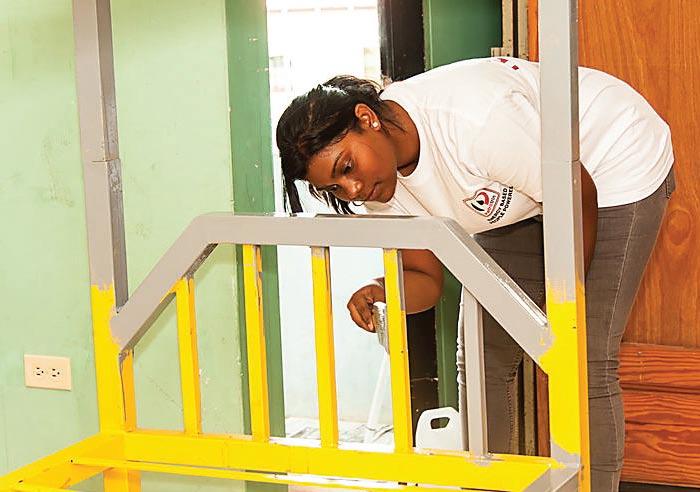
“Petrotrin really has a culture of giving,” says Sarah Hamel-Smith of the Corporate Communications Department. Even though resources are stretched due to the depressed oil price, the company maintains support where it can.
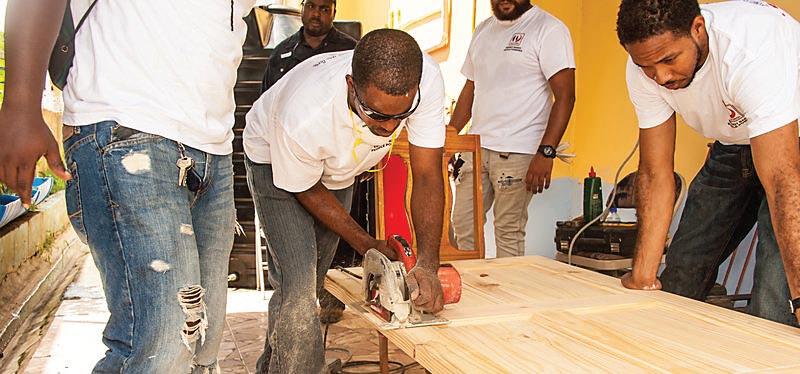
And with a little ingenuity, a bit of perspiration and the will to make a difference, it’ll keep doing just that.
By the numbers
For the 2016 Annual Employee Christmas Toy Drive, 117 volunteers took part and 553 toys were donated.
That year, 127 walkers participated in the Walkathon for Heart Disease Awareness, which raised $38,600 for the Trinidad and Tobago Heart Foundation.
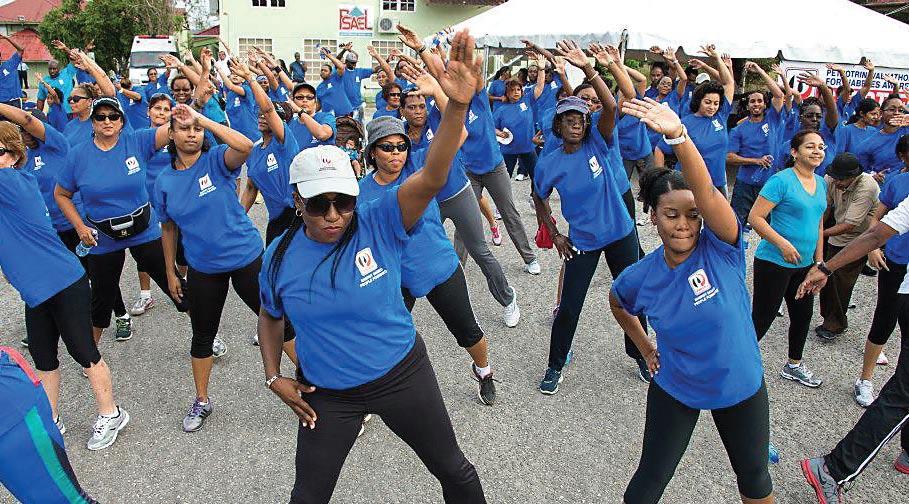
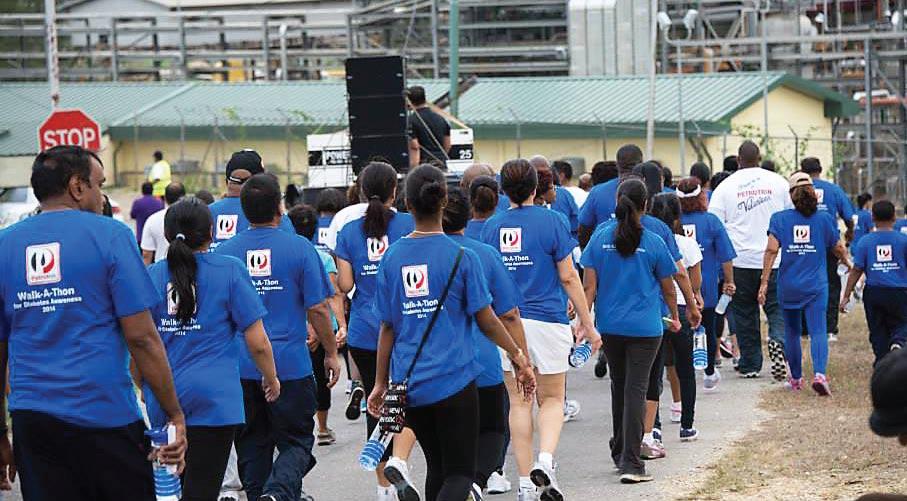
Corporate Sustainability Review 17
Petrotrin employees warm up for the Diabetes Awareness walkathon in 2014
Striding past the refinery
Petrotrin craft apprentices cut a door down to size
This Petrotrin employee applies colour at Ferndean
RBC employees give back to Youth
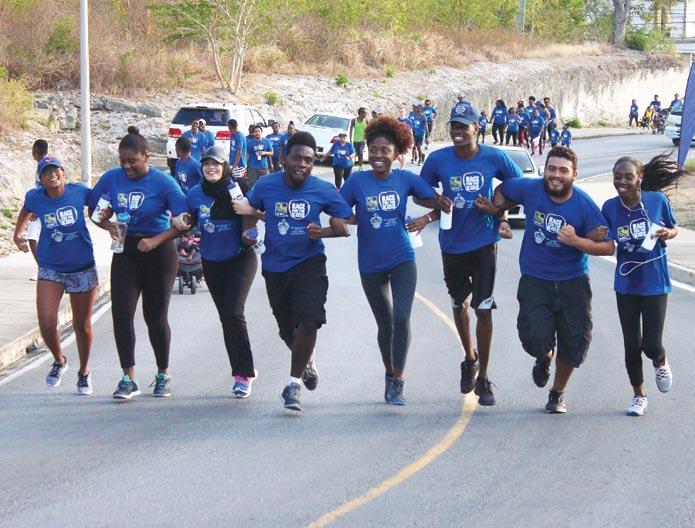
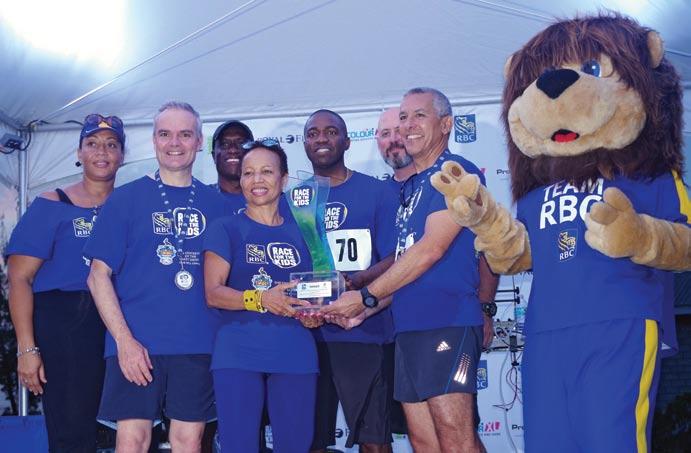
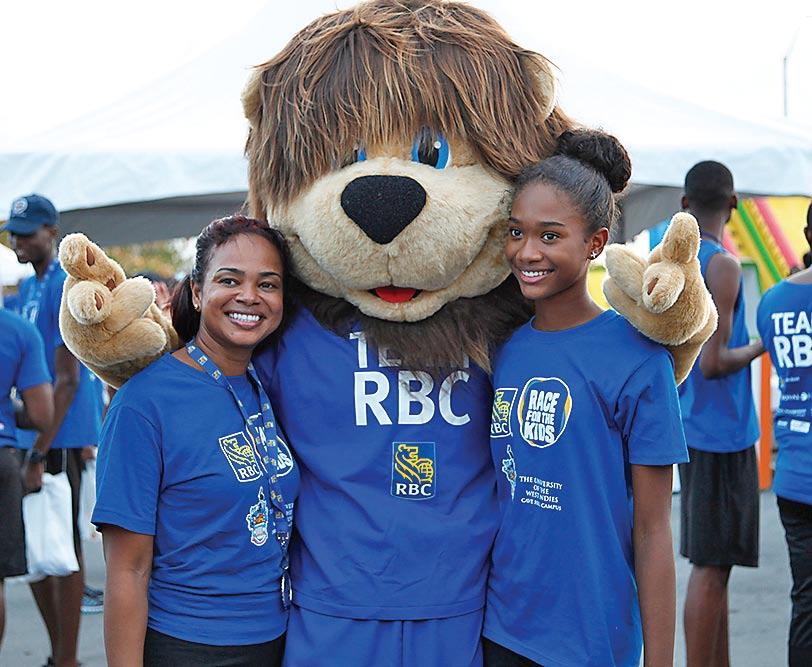
In 2015, 15-year-old Kristohn Lewis fell ill. He’d had a fever off and on for some time, but it kept climbing and his mother couldn’t get it down. Now it was accompanied by a searing headache.
Not long after, Kristohn was diagnosed with Hodgkin’s lymphoma – a cancer of the lymphatic system – at the Eric Williams Medical Sciences Complex at Mt Hope. His treatment began but the public health system didn’t have all the tools necessary – in particular a scanning machine that could show what was happening with his lymph nodes as he underwent chemotherapy and radiation. He would have to go to Miami.
That’s where the RBC Caribbean Children’s Cancer Fund came in, paying for the diagnostic test and ensuring that his family was as comfortable as possible while he was in hospital. “You are already going through a stressful time,” says Lisa Francis-Mc Carthy, who administers the cancer fund on behalf of RBC and the Cancer Society. “You don’t need to be worrying about… you know, things that could be handled for you.”
Lisa is a hand-holder of sorts. She helps families through the visa process, tells them how to get around while their child is hospitalized in Florida, even sets up their phones so they can keep in touch via messaging services. “I call her my angel,” says Marlene Lewis, Kristohn’s Mom.
Since 2012, 85 children from birth to 16 have benefited from the fund, many of them with cancers of the blood that require specialized diagnostic testing that isn’t available locally. That support was made possible by the volunteerism of thousands of RBC employees who have helped raise the money to fill the fund’s coffers.
A notable portion of the fundraising is done through RBC’s Race for the Kids, a global RBC proprietary event that raises money to support various children and youth charities all over the worldThe annual 5K event has shown that volunteerism can be a very competitive affair. Some staff members compete vigorously to see who can raise the most, while others seem most interested in getting to the finish line ahead of their colleagues.
Recently, the bank has agreed, through the Caribbean Children’s Cancer Fund, to buy a critical piece of diagnostic equipment for Mt Hope’s paediatric department. The flow cytometer, which will
18 Corporate Sustainability Review
RBC Barbados staff team up at the “Race for Kids Barbados”
RBC’s Mascot inspires
CSR Story
“Race for Kids Barbados”: UWI Cave Hill Principal, Prof. Eudine Barriteau, presents a prize after RBC Barbados’s inaugural Race for the Kids, 2017
be used to analyse blood samples that are currently sent to the United States, could be installed by the end of 2017, pending agreement between the bank and health authorities.
Since it was established in 2008, 95% of the families accessing the Fund have been referred by pediatric oncologists at Mt Hope. However, it isn’t limited to residents of Trinidad and Tobago. In fact, citizens from any Caribbean country where RBC operates are eligible.
In Grenada, a young couple living on the 21-year-old father’s slender earnings has accessed the fund for diagnostic tests for their 2-year-old daughter who has a cancer of the blood. The girl’s mother lost her job for taking too much time-off from work to care for her child.
RBC Barbados hosted its inaugural Race for the Kids in April 2017. Those funds went towards the University of the West Indies Cave Hill campus First Year Experience which helps incoming students to navigate the challenges of university life by ‘peering’ them up with student mentors who’ve been through it all. This initiative follows a decision by the government of Barbados to reduce its subsidies for university students in 2013. This has resulted in a decline in enrolment.

“We are in a severe financial crisis,” says Sonia Johnson, Business Development Officer at Cave Hill, “so partnership is essential if we are to have students. Scholarships are key and we need private support for that.” The university currently receives 1,000 applications for fewer than 100 scholarships.
The team in Barbados is a highly motivated, high-energy group. They have successfully launched numerous fund-raising activities including an Art, Cheese and Jazz event which raised funds through ticket sales; a Top Chef cook-off, and book sales and registration drives. “We didn’t need to offer them anything to be a part of it,” says Keri Mapp of RBC Royal Bank Barbados’ Marketing Department. “It was just the pride of knowing that RBC is involved in the community.”
The first race turned out 1,300 participants from RBC Barbados, its affiliates and members of the public. There was a good turnout from UWI too, with Principal Eudine Barriteau throwing down the gauntlet in a video shared with staff. “She threw out a challenge to four students in particular and said she was going to beat them,” says Johnson. (She didn’t, but it wasn’t for lack of energy.)
As for Kristohn, he’s just graduated from Caribbean Union College and seems in good health and spirits. . He has also been inspired to become a doctor so he can do his part to give back to persons facing similar medical challenges as he once did. Marlene Lewis says her son has been “a very brave soul” through
The RBC Caribbean Children’s Cancer Fund covers treatment and pathology – essentially any testing that can’t be done locally because the equipment isn’t available.
Applications are considered on financial need and the fund encourages families to participate in defraying expenses through fundraising of their own.
“A lot of people don’t know about the fund,” says Wendy Alleyne, RBC Financial (Caribbean) Limited’s Senior Manager, Brand & Sponsorships. “We would like the Caribbean public to know you can apply for funding, as well as contribute.”
More information on accessing or donating to the fund is available on the RBC website at: www.rbcroyalbank.com/caribbean/give-hopesave-lives/
all the treatment. “Mummy,” he said, “It’s a good thing it’s me and not my other brothers. They would not have been able to cope with that.”
Kristohn will soon face the prospect of another trip to Florida for another PET scan. The RBC Caribbean Children’s Cancer Fund will be there to support.
Corporate Sustainability Review 19
I’m on Team RBC
Living in community
There’s an old Trini adage that says, “Is who live in the house know where it leaking”. A quick translation in the PowerGen context means, “Those who live in a community would best know its needs.”
This is why PowerGen’s CSR principles of employee volunteerism creates relevance for its communities and creates a deep sense of commitment to the company and its values. The company encourages its employees to identify projects and programmes in their own communities to improve and enhance lives.
From building and maintaining a much needed bus shed for residents of Cedros, to repairing the ceiling of a home for autistic children in Tunapuna, possible projects and programmes all over the country are submitted for consideration and special funding. Employees both select and direct which projects will get the nod each year.
PowerGen has a CSR committee composed of 10-12 employees who meet formally once a month to review and decide on proposals presented by their colleagues. A needs analysis is then carried out and a site visit undertaken to verify information submitted before any disbursements are made.
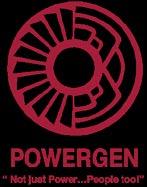
It is this kind of employee initiative that has guided the formation of the PowerGen Penal Table Tennis Club. Sookdeo Tankoo, the club’s current manager is based at the Penal plant and shares his story.
Tankoo takes on table tennis
Somewhere around 2005/2006, former national table tennis player Billy Abdool, who lives in the community, approached a member of the Penal Sports Club committee through a family member, for permission to use the PowerGen Sports Club’s facilities for table tennis training. Together with Billy were Selwyn Singh a former National and Caribbean Champion, Bob Roopnarine who is currently the honorary Secretary of the Caribbean Table Tennis Federation, and Technical Director,
and whose son Arun Roopnarine is currently a highly ranked player.
A proposal was submitted to the club’s Management Committee, which immediately gave approval for use of the facilities, as it made sense to expand to activities beyond the traditional cricket. The decision also meant increased community participation and encouraged youth development.
Tankoo was appointed to work with these players and to formulate a plan to establish a team. A committee was set up to run the affairs of table tennis.
Some of the club’s achievements include being able to attract and train many players who are now A1 players, and participate in all national tournaments. These include Catherine Spicer, a member of the National table tennis team and ranked #3 of the country’s female players. Brothers Sarvesh and Amresh Mungal are ranked in the top ten, Uzair Omerdeen represented the country at Caribbean U15, Sarvesh represented the country at Cadet and Junior. The club is proud to have won the A2 Team tournament held in 2014/2015. A profile of Catherine Spicer appears on this
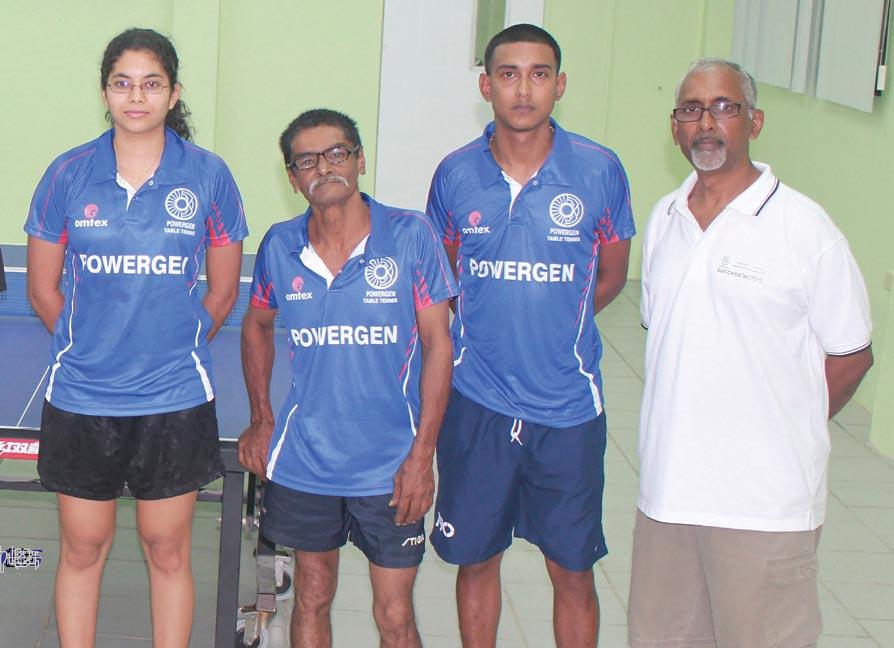
20 Corporate Sustainability Review
CSR Story
PowerGen’s Sookdeo Tankoo and his A Team
page. Tankoo is proud that PowerGen was able to contribute to this success.
In 2016 in an effort to ensure continuity and to encourage more youths to get involved in sports, a coaching programme was established and 12 young children are currently benefiting from these free training sessions which are held on Sundays from 2pm.
Tankoo says, “I have a natural love for sports and seeing young people make positive steps in life. Sports is a way of combatting idleness and keeping kids away from some of the harmful things going on in the society.” Tankoo is happy to seize the opportunity to catch the youth before they go astray and groom them to develop their talents and to “steer them in the right direction.”
Asked about why he volunteers he says “It’s not about the “thanks” for what you are doing; actually it’s a privilege just to be able to do something for my community.”
Tankoo is also among the many PowerGen employees who distribute vouchers for books and school supplies to less fortunate families and deliver annual Christmas Hampers.
Investing in talent
PowerGen’s volunteerism efforts are paying big dividends. Its contribution in cricket is well documented. But here, throughout the community, very quietly, new heroes are being forged.
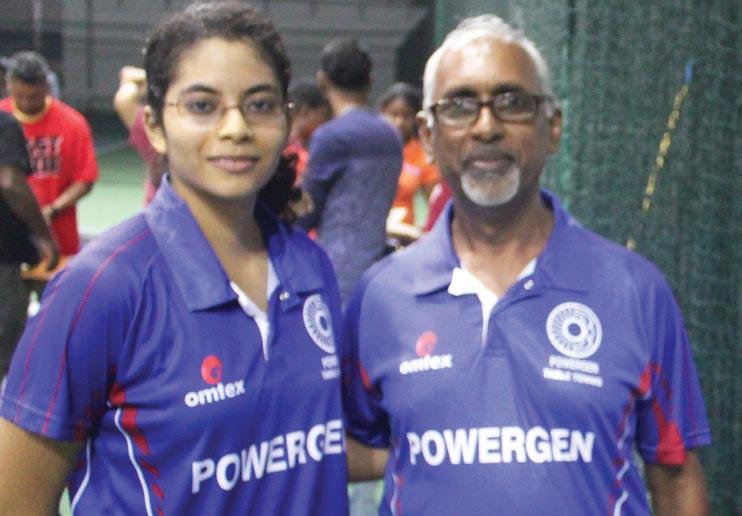
Senior Team Gold in French Guyana for the second year in a row plus bronze in the U21 Singles. She had also been named FCB Junior nominee for table tennis in that same year.
Since then, among her many accomplishments, Catherine Spicer, now just 20 years old, has represented the country at the Youth Olympic Qualifier in El Salvador and Venezuela; earned the title of first WJC Singles Medal - Cadet Bronze in Venezuela; was the highest ranking Cadet at the International Table Tennis Federation and ranked #1 Female in three categories U15, U18 and Women in 2010. Among her many annual nominee awards locally with PowerGen and First Citizens Bank, she has also won Cadet Gold at The World Junior Circuit Teams in Guatemala and at the World Junior Circuit Doubles in El Salvador teaming up with Mexico to play Hong Kong in the finals.
Her athletic prowess is well matched by her academic acumen. In 2011 she completed nine CSEC O’Level subjects including eight Grade 1 awards. She later went on to secure eight subjects at CAPE A’Level – six at Grade 1 and two at Grade 2. She has since completed her BSc in Economics from UWI.
Between 2012 and 2015, Spicer has made further strides in her sporting career. Among her recent achievements is that of being a member of the women National Elite team which placed third in (Division 4) which translated to 75th overall, in the world, at the LIBRERR World Team Championships held in Dortmund, Germany 2012. This is the third highest spot that was possible for Trinidad and Tobago having not entered this competition for 20 years. This result may lead to promotion to Division 3, where they would now be able to vie for a higher spot of 48th to 72nd overall at the next World Team Championships held every two years.
Under 18 junior National Singles Champion for third year in a row. Spicer is also the holder of a Junior Caribbean Gold medal in mixed doubles Bronze in junior singles; Silver bowl 2nd U21 Girls Singles; has won the National Championships U21 Girls Singles; represented Trinidad and Tobago at the Common Wealth Games 2014 in Glasgow Scotland; successfully represented Trinidad and Tobago at the CAC qualifier in El Salvador; and represented Trinidad and Tobago at the Central American and Caribbean Games in Mexico.
Catherine Simone Spicer was the first Trinidadian to win a medal at a World Junior Circuit Event in 2009 when she earned two bronze medals in Canada. At the time she was unbeaten in all National Ranking Tournaments in the Girls under 15 and under 18 Singles, and had won the Caribbean
Spicer medaled bronze at the Martinique Caribbean Games 2015 and retained U21 National Singles Title and Mixed Doubles Title. Selected to represent Trinidad & Tobago at the Commonwealth Table Tennis India and won the women and under 21 titles in the Tobago Open Championships in that same year.
Corporate Sustainability Review 21
TT’s No. 3 Catherine Spicer at the PowerGen Penal Club
Samaroo supports schools
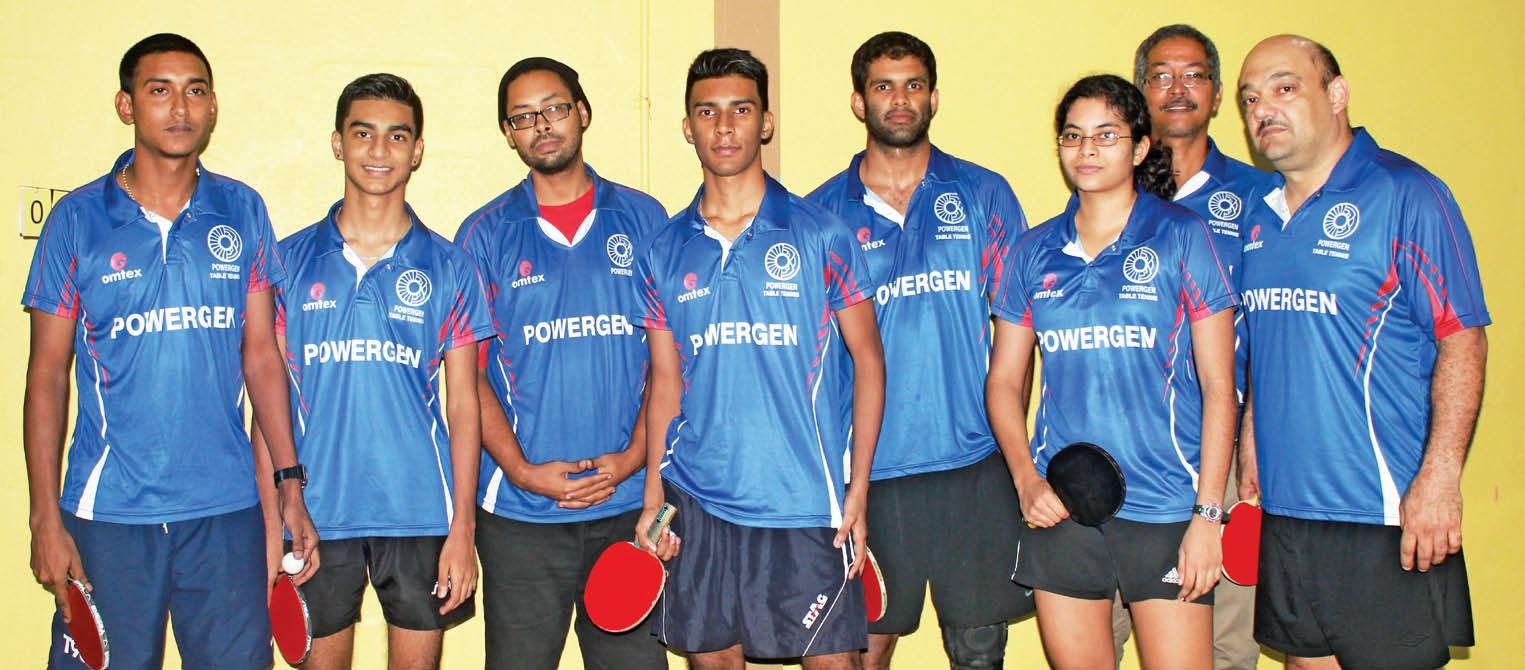
Samson Samaroo is based in the Point Lisas plant and is the CSR Committee Coordinator for the Point Lisas area. He mainly coordinates the primary school donations on behalf of PowerGen, working with schools all over the country regardless of denomination or geographical location.
Samaroo and other employees who support the programme, distribute vouchers for school books and bags – targeting children from several schools including the Cedros Government Primary, the San Juan Presbyterian, and a range of other primary schools. The process for selection is again an inclusive employee approach. Employees serve as scouts to assess and identify needy families. After site visit verification, the names of recommended families are submitted to the committee assigned to prioritize and select.
So why does he volunteer in his spare time? Samaroo admits to coming from very humble beginnings and reflects on his growing years in Cedros. When he joined PowerGen he felt he could leverage the company’s Employee Engagement Programme, to get things done in communities that needed help.
He realizes that with the hectic schedules of most people a lot is not done so he just does what he can, knowing there is no fame or fortune to be derived. “Whatever it is you do, whether it is the Christmas hampers or vouchers, you just see the happiness and appreciation of the people on their faces and you feel you have helped make life a little better for them.”
PowerGen’s annual Community Children’s Christmas treat is a major part of the employee volunteerism effort which was introduced in the same year the company commenced operations over 20 years ago. The treat reaches over 200
children between the ages of 5 – 12 years of age and is held annually at the FunStation in Gulf City. The children are transported there and hosted for the day starting with breakfast at 9 am.
The event is a major annual highlight for the PowerGen family. Every year different primary schools are selected to ensure that every school benefits. The principals from each school select about 12 children who are in need. Employees also help to identify children from families within their communities who may qualify for assistance.
The recommendations from the employees are also submitted to PowerGen’s Community Relations Committee which considers the recommendations at their monthly meetings.
Kari Singh is based in Penal and shared his own experience of how less fortunate children are sometimes identified. He cited an example of driving to work daily and seeing two small children making their way to school, a long arduous journey on foot. He got involved, visited their one-room home and submitted their family as one in need of support and included the children in the Christmas treat.
Although PowerGen has reduced its plant operations with the closure of the Port of Spain power station last year, the volunteer spirit of its employees from the Penal and Point Lisas locations prevails.
PowerGen employees believe that they can make a difference one life at a time, one community at a time and from this will flow a better quality of life for all of Trinidad and Tobago. Volunteering can make the country a better place for all through united effort.
22 Corporate Sustainability Review
PowerGen’s Table Tennis Team
The power to make things happen
Nadia Williams
Social Investment Officer, is proud and humbled to be part of the team and infrastructure that develop financial and societal health among citizens through social interventions, under the pillars of ‘Power to Help,, ‘Power to Care’, ‘Power to Learn’, and ‘Power to Succeed’. She shares her journey of 22 years with the Bank.
This bank is about building successful societies everywhere we operate. In Trinidad and Tobago, Guyana, Barbados, Grenada and recently, Suriname, we hope to achieve alignment of our social investment interventions across the region. As a group, we amplify impacts and build the strength of the programmes. We believe that despite economic constraints, we must make a difference in society.
I started with Republic Bank when I was 18 as a Youth Link apprentice, graduating as valedictorian of the cohort of 1995. I became a permanent employee in 1998; since then I have worked in numerous departments within the bank. I am convinced of the purpose of the Bank’s power to make a difference, its commitment to giving back and building success with customers through relationships.
Making a difference
The current social responsibility commitment ‘Power to Make a Difference’ was developed 15 years ago. It rests on four pillars:
1. Power to help: facilitating investment, poverty alleviation and assistance for the socially marginalized;

2. Power to care: health, concern for the elderly and differently abled;
3. Power to learn: youth development, education, culture and the arts;
4. Power to succeed: sport and the environment.
These pillars have defined the criteria by which applications for sponsored projects are selected and approved. While assistance and contributions are regularly spread over all the pillars, significant social investments are focused on single pillars in five-year phases.
The first focus (2004 to 2008) was on poverty alleviation and the second (2008 – 2012) was caring for the differently abled.
The ‘Power to Learn’, the theme for the current phase, is being effected through various projects, such as a partnership with Trinidad & Tobago National Commission for UNESCO and the Ministry of Education, with the bulk of the financing in this five-year period aimed at increasing literacy among infants. The programme is refreshing the way reading skills are taught; and includes training for teachers and principals. A component for parents focuses on creating a literate environment for raising children. Developed by the Commission, the programme has built-in metrics and also allows teachers to build inter-school networks. By the end of the five years, some 200 schools will have benefitted from the training, which encourages participants to become mentors across the primary school system.
In a five-year period, approximately 40% of funding might go to the focus programmes. Such programmes don’t necessarily end after the designated period. In the Transplant Links (‘Power to Care’) programme, Republic facilitated a team of English doctors to perform kidney transplants, for children across the region. Working with teams of local doctors, these visits helped to build local competencies. The Bank now has a nineyear relationship with Transplant Links and there have been 26 successful transplants. There’s also a nine-year relationship with Hope of a Miracle Foundation, which facilitates other critical surgeries for children with a hospital in the USA.
During the Power to Care phase the Helen Bhagwansingh Diabetes Education Research and Prevention Institute (DERPI) and its programme for screening in schools took root, providing interventions for children at risk, as well as promoting healthy lifestyle changes in their families. DERPI facilitates education changes so that children learn about
Corporate Sustainability Review 23
Nadia Williams
CSR Story
Social Investment Officer at Republic
diabetes in schools. More recently the programme has advocated that schools stop having sweet soda drinks sold on their premises.
Volunteerism and employee passion
understand how powerful it is for children to talk to their peers about values.
The Power to Make a Difference was formally introduced in 2004 with the aim of investing TT$52 million in social programmes over the period 2004 to 2008. In the second phase of this programme, our committed investment was TT$100 million. In the third phase, 2014 to 2018, we have committed TT$ 110 million.

An important component of the ‘Power to Make a Difference’ (PMAD) is employee volunteerism. Any employee with the passion to make a difference can propose a project. Once such projects are accepted for funding in the PMAD programme, other employees may choose to work alongside the employee, branch or unit to help achieve the targets.

Through the volunteerism programme, employees have worked with Habitat for Humanity to build homes in Tobago, Valencia, Carapichaima and other under-served areas.
Volunteer projects also invite young persons from schools (which may be beneficiaries of other social investment projects) to volunteer on staff projects. The volunteer groups thus created are multi-generational teams from all sectors, including community members, customers and staff. Students are grateful for the opportunities of volunteerism, and staff who are parents are encouraged and happy to bring their children to such events.
Corporate Social Responsibility is vested in the Executive Management team of Republic Bank. Once projects are selected, they are assigned to the relevant member who becomes a champion. Each assignment includes briefs and introductions to the NGOs or charities and becomes part of the team member’s portfolio.
Our outreach to a younger generation is considered and we act on it with deliberate focus. Secondary school graduates every year are invited to become apprentices through the Youth Link Apprenticeship Programme. We are aware of the issues facing each generation and have assisted in school and community campaigns to combat these issues. We
Social investment is and has always been an integral part of Republic Bank’s DNA. But investment is a shared activity as Republic sees it. The organisation encourages communities to get involved in identifying and participating in the resolution of issues; but also to support those interventions by building a system of ethics that will endure. In the spirit of mutuality, Republic believes that it “must help struggling communities enhance the quality of life for themselves and for future generations” because when communities prosper, business does well and the economy grows stronger.
Today, Republic Bank, a 180-year old institution holds its position as the premier bank in Trinidad and Tobago, and has expanded to Grenada, Guyana, Barbados, Suriname, the Cayman Islands and Ghana. Its flexibility and agility, its market position and customer loyalty, are hardwon and are now consciously and conscientiously expanded by core values which place customer and society at the centre of its strategies. The CSR programme, fittingly labeled The ‘Power to Make a Difference’, reflects the bank’s ethos in developing a healthy society through relationships that assist in putting disadvantaged persons on their feet.
24 Corporate Sustainability Review
Republic’s ‘Power to Learn’ targets infant literacy
Carenage Boys share a moment with Republic’s Nadia Williams
The Bank of Nurturing
Republic Bank has always strived to improve the quality of life of those in the communities in which we operate, giving back to society through strategic partnerships that impact the lives of the disenfranchised.
Over the past 13 years, we have supported undertakings focused on Literacy, the Arts, Sport and other social engagements, through our Power to Make a Difference programme.

And looking toward the future, we will continue to make a contribution… to Make a Difference.

republictt.com
email@republictt.com
Strengthening the brand inside out
CSR experts today increasingly prefer the term Shared Value Agenda to the more familiar Corporate Social Responsibility. At Sagicor Life Inc Trinidad and Tobago, it’s particularly apt. The financial service company’s culture of volunteerism, encouraged by an “exclusive” club that promotes personal development and brand-building from within, is also at the forefront of community-building efforts.
Sagicor’s Corporate Communications Manager Marlene K. Chin reiterated that the company’s mission of improving the lives of the people in the communities in which they operate underpins this symbiosis of company and community.
The Caribbean is home to Sagicor.
Established in 1840 as The Mutual, Sagicor Life Inc is the leading indigenous financial services company within the region, operating in 22 countries throughout the Caribbean, Central America, and the United States. Tailored
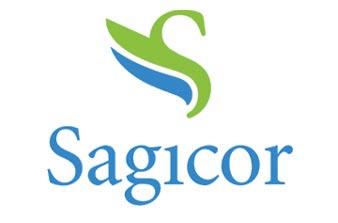
financial services respond to the unique needs of Sagicor’s communities and include individual life and health insurance, annuities, pensions, employee benefits, as well as investment services.
Sagicor’s social investment programmes are focused on sustainability, and delivering value through engagement with civil society, health initiatives and capacity building through education. Investments in education pay off in several ways but particularly as it provides the added advantage of generating sustainability of the Group’s business by growing the talent pool. Linked to its product line, this synergy between business focus and CSR agenda is also reflected in its social investment in healthcare, sports, and youth development.
Ambassadors’ Club
The Ambassadors’ Club has been up and running for four years at Sagicor and now boasts 40 ambassadors from six
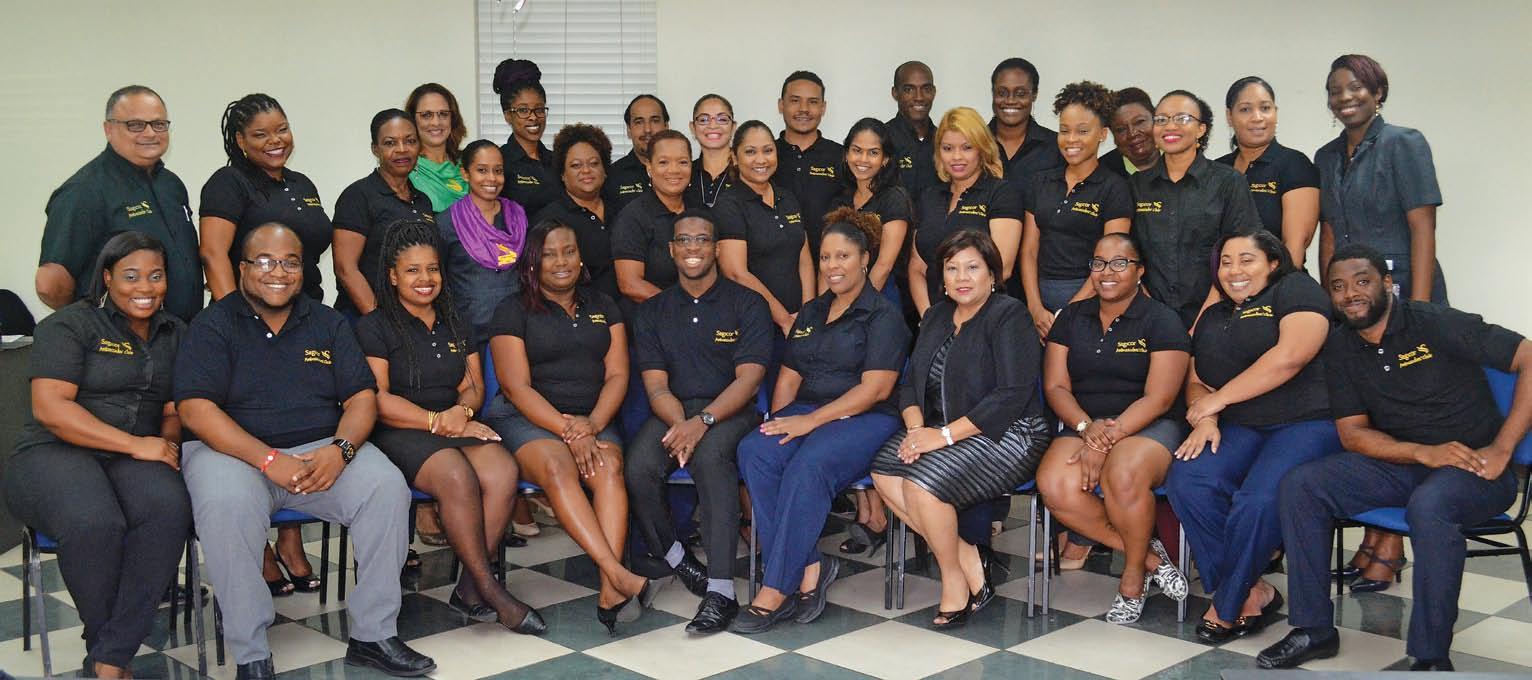
branches. When they are not working, this dynamic team of individuals vary their time by showing up to meet and greet shareholders, connecting with customers at company events, or becoming immersed in a number of community projects.
Sagicor’s Ambassadors, a blend of administrative staff and financial advisors, are high performers whose talents and skills are used to affirm the brand’s philosophy to develop and maintain long-term relationships with its customers, its employees and its communities. “We pride ourselves on being quite an exclusive team. We work hard and play hard,” jokes Marlene K. Chin, Club President.
The Club looks for exceptional time managers who can handle their jobs as well as the demands of “strengthening the brand from inside out.” Chin explains that “Ambassadors also benefit from training in areas of social etiquette such
26 Corporate Sustainability Review
CSR Story
Sagicor Ambassadors
as speech and deportment. These are essentials in public engagement and relations.” It seems like everyone wins in a Shared Value triangle of employer, employee, and community.
Adopt-A-Community
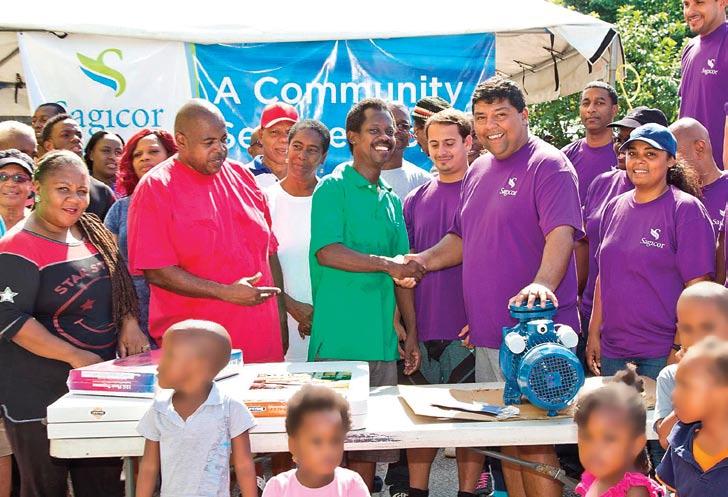
The Ambassadors are the first people you’ll meet at the annual golf tournament which has raised funds for the Friends of the Blood Bank and a number of other NGOs. They also have an instrumental role in Sagicor’s Adopt-A-Community programme, launched in 2015. At their respective branches and departments they collaborate with their teams ensuring that selected projects align with Sagicor’s CSR pillars: Youth Development through Education, Sport, and Health. They also guide and support teams as they prepare for community projects aimed at improving lives and livelihood.
When financial advisor Jessica Jobe of the Richard Daly Branch moved into a public housing complex in Belmont in 2015, she was surprised by the ritual that happened each time the water truck rumbled into the compound. “They have more than 100 apartments in that terrace,” says Jobe. “And every single man, woman, child, old person, people in wheelchairs, was rushing out to get water.”

The water pump was out of commission and when there was no water on the main, there was no water in the apartments. It had been three years.
Jobe went to her branch manager and said they needed to help. While working on the logistics of the water pump project, she also came across the community daycare. The preschool’s principal took in “normal” children, but she really specialized in preparing autistic kids for the school environment. Without a government subvention, she had been muddling along as best she could.
The Adopt-A-Community fund had more than enough for just a water pump. Jobe set to planning: they’d paint the daycare, buy some mats and cribs and hand over a phonics programme.
The financial advisor was “in shock” when she saw the huge staff turnout on a Friday. Even the agents put aside sales for the day. They all jumped in and were soon joined by preschool parents and the Terrace residents, with everyone only pausing for a quick lunch. “The principal was speechless,” says Jobe“. She cried when the gifts were handed over. It was so touching”. That’s the greatest reward for volunteers like Jobe.
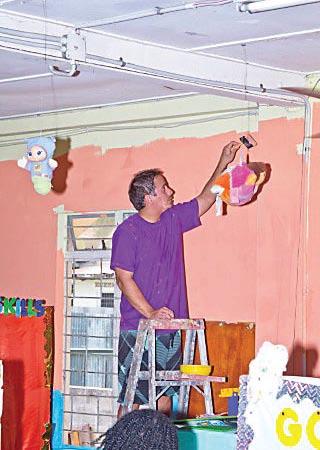
Corporate Sustainability Review 27
The Sagicor team keep it pumping
Sagicor employees team up for a paint refresh
Daycare fix by Sagicor volunteer
In Sagicor’s CSR terminology, Jobe is an “exciter” – the kind of employee who shakes colleagues out of their workday routines and into their communities, animating them into acknowledging that volunteerism can be fun.
Sagicor’s vision is “To be a great company committed to improving the lives of the people in the communities in which we operate”. In that spirit, every engagement has the potential to be mutually beneficial. Potential customers just might remember your brand.
CSR partnerships
In 2016, Sagicor branches completed ten CSR projects, mostly by partnering with established NGOs and community groups. But the ones that originated with creative, communityconnected staff were the most memorable.
Sagicor’s flagship CSR initiatives are a longstanding commitment to the Cave Hill School of Business, and the Sagicor Visionaries Challenge, which promotes innovation in the fields of science, technology, engineering and mathematics (STEM) to solve problems in communities. The 2016 regional winners, from Queen’s College, Barbados, tackled the island’s water scarcity, designing a water filtration system from coconut shells that allows users to recycle domestic water for flushing.
But long before students can engage in complex design, they’re learning much simpler maths.
One Wednesday morning in September 2015, staff of the De Vert Branch in South Trinidad rounded up a busload of primary-school students and took them to the Wildfowl Trust in Pointe-a-Pierre for some wildlife viewing and a basic finance lesson.
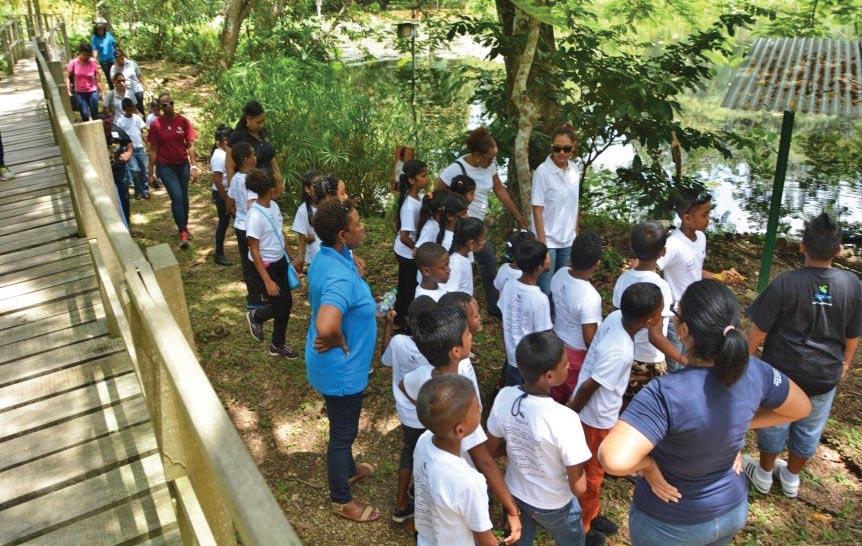
Financial advisor Charlene Ramkissoon had done the legwork, visiting five Fyzabad schools to find out which students were most deserving of new schoolbags. The branch was going to give the gathering of five - to ten-year-olds a few pointers on saving and risk management. It started with a piggybank, a dollar and a bag. “Where does money come from?” asked Susan Romano-Davis, Agency Manager. “It grows on trees?” (They were surrounded by trees, and wildlife, which must have added to the rhetorical impact.) “They were so happy to put their dollar in their piggybanks.”
Romano-Davis wanted the students to understand that they are the future. “That day was helping them to understand that anything is possible to them.” Even perhaps, winning the Visionaries Challenge.
Societal problems, and their solutions, are so often found close to home. Jessica Jobe found one on her doorstep. And Charlene Ramkissoon still meets the children she spent a day with. “Up to now, the kids say, ‘When we going to Sagicor?’”
For members of Sagicor’s 22-country communities, that could be any day.
28 Corporate Sustainability Review
Sagicor Kids on a nature stroll

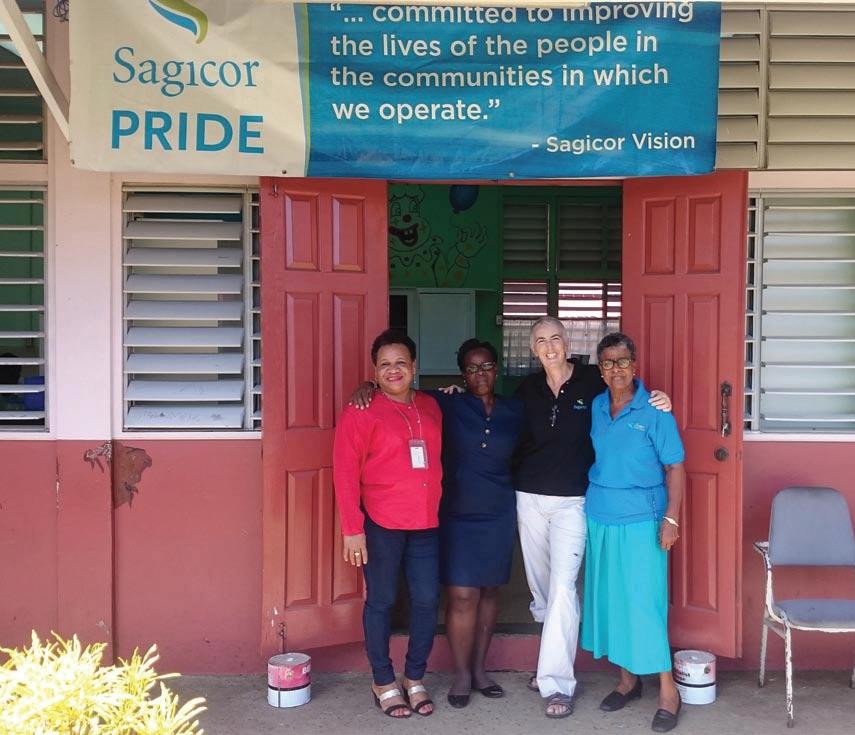
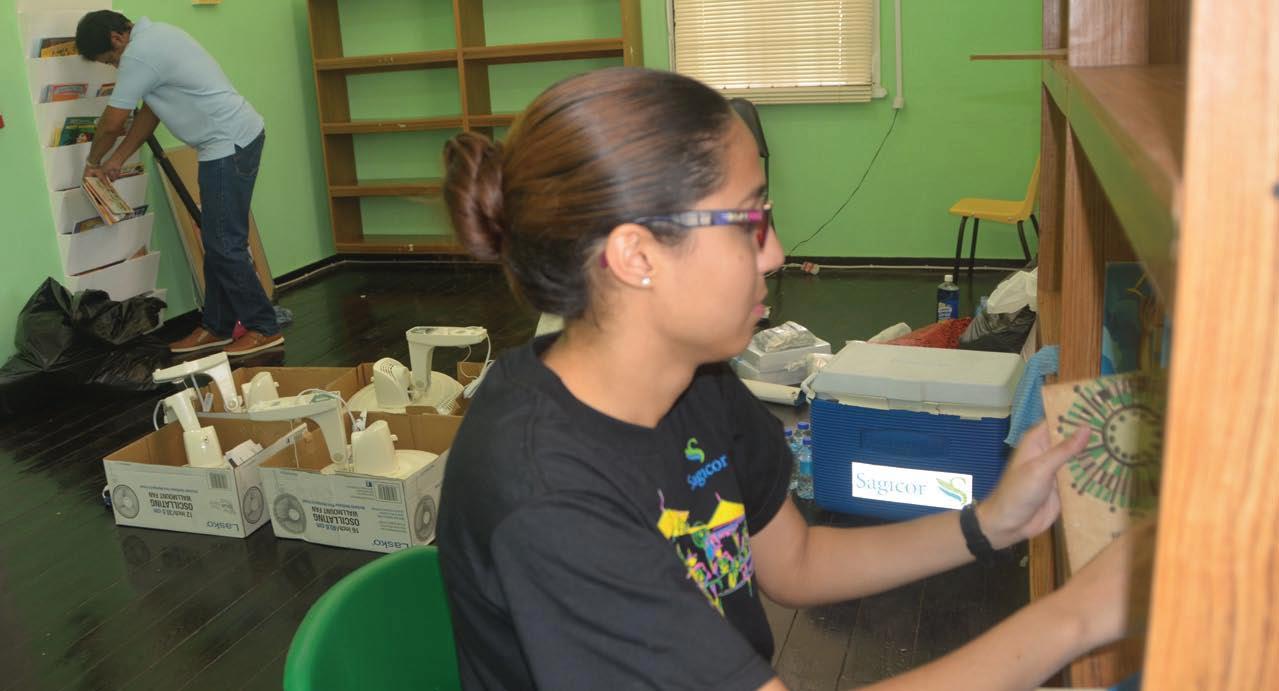

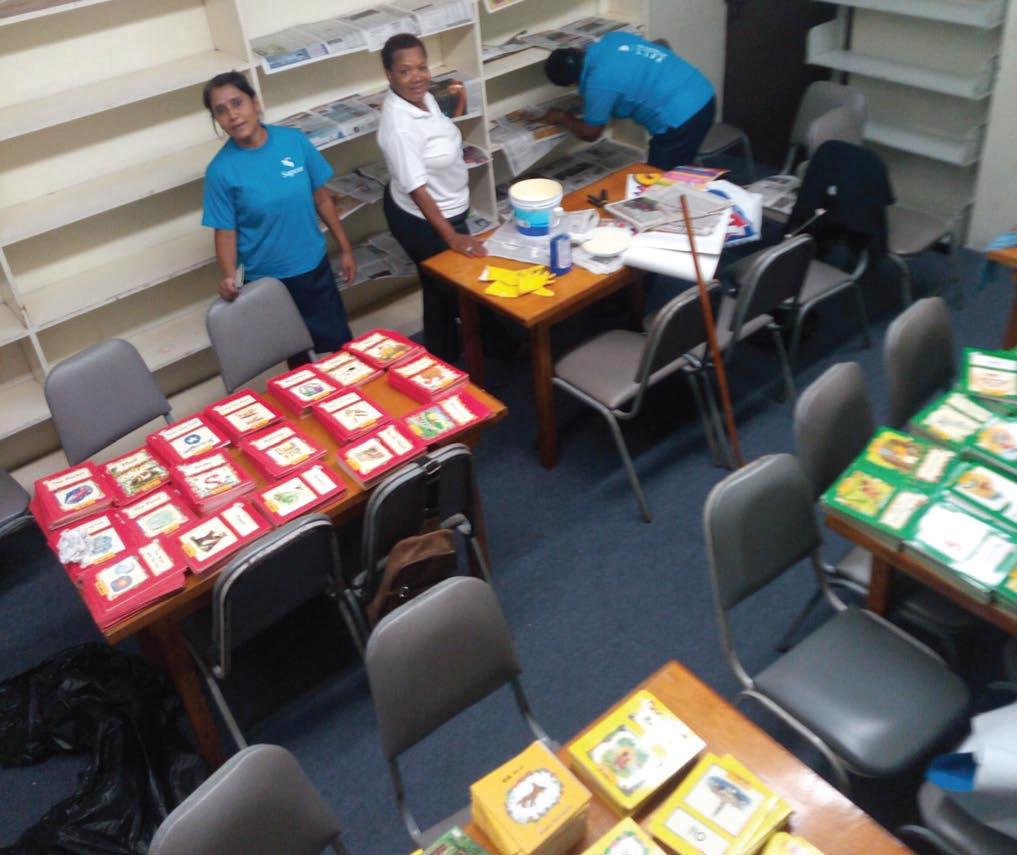
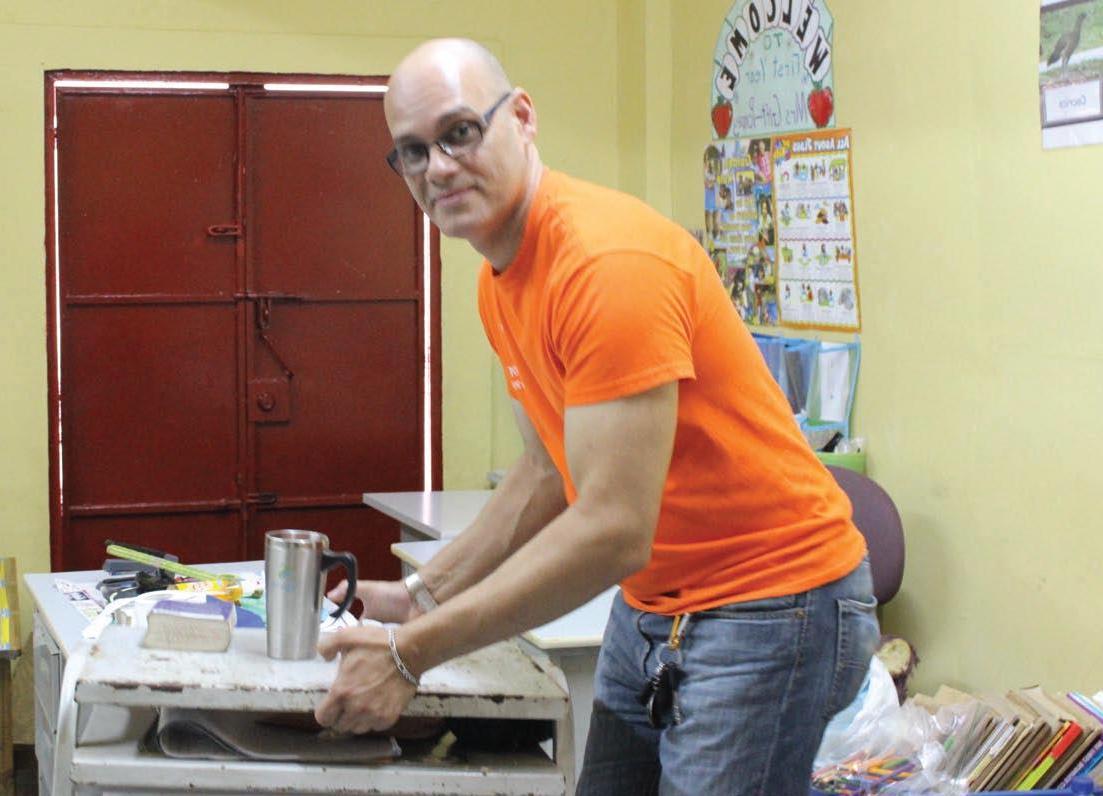
Conscious Leader
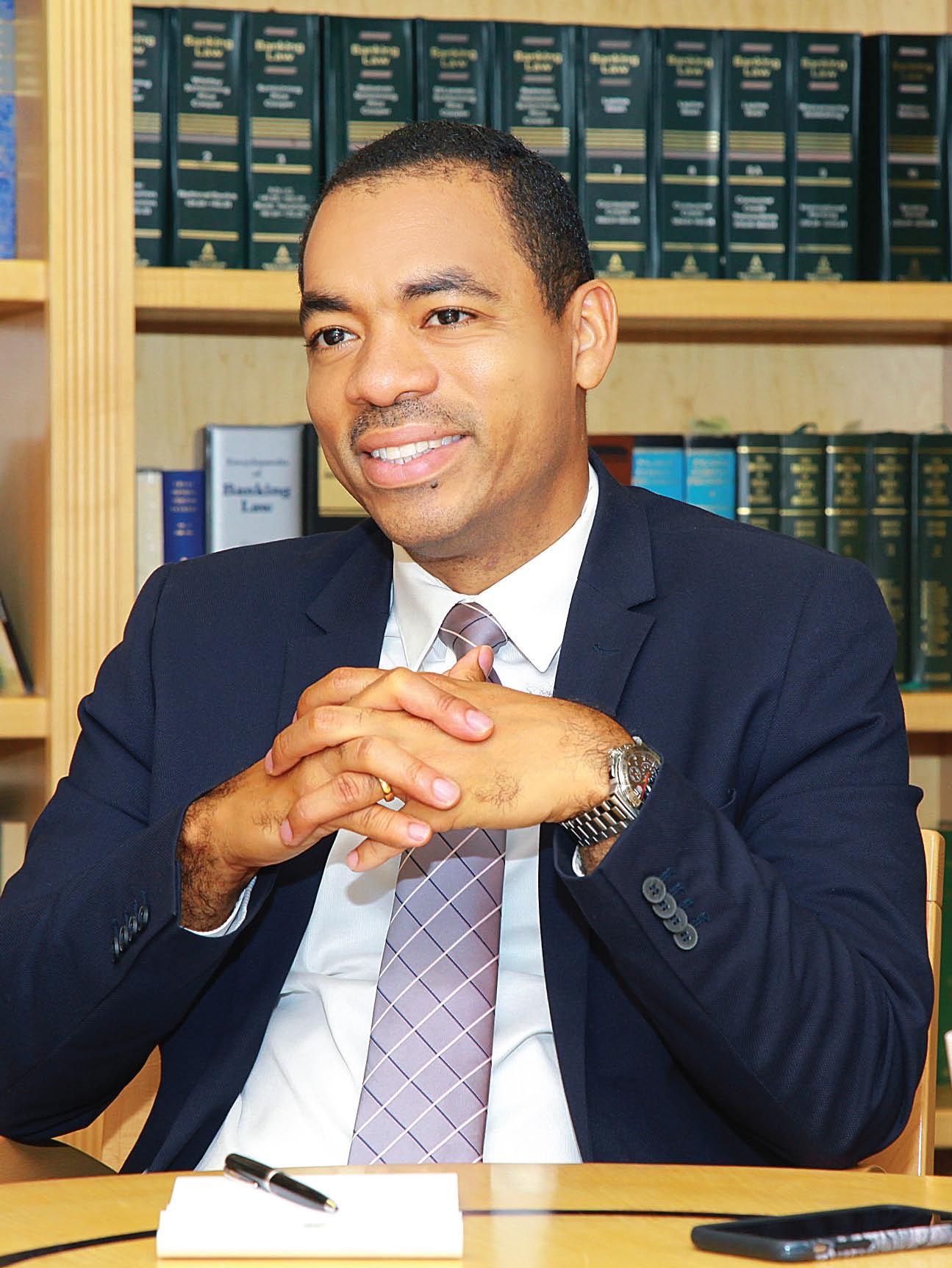 Jason Julien
Jason Julien
30 Corporate Sustainability Review
Deputy CEO Business Generation, First Citizens by Donna Ramsammy
volunteered to participate in a project of successful fashion designer and entrepreneur Anya Ayoung-Chee, to publicly address this crisis that faces our society.
The TCSR decided to dig a bit deeper to understand the man behind the message and discovered that he has been giving a voice to issues for most of his adult life.
Winner of a full UWI Scholarship and a graduate of the University of the West Indies, St. Augustine, young Julien spearheaded a protest against violence against women in the mid-90s following a spate of violent attacks on female students. The protest which saw a total lock-down of the campus including the chaining of the gates, resulted in tightened security measures and the introduction of a shuttle service on the campus. His mother was also an adult student on campus at the time which further fueled his resolve – even if it meant putting his scholarship and education at risk.
Jason Julien was valedictorian when he graduated in 1997. It was the start of a distinctive career in the financial services, beginning with his first work assignment at PricewaterhouseCoopers. Following becoming a CFA Charter
holder, he moved to Citibank and then to Guardian Holdings where he had responsibility for business development, mergers and acquisitions and later investment management in their Asset Management division. From there he took up a position with First Citizens Trinidad & Tobago as Head of First Citizens Investment Services. Today, he is the Deputy CEO, Business Generation at First Citizens.
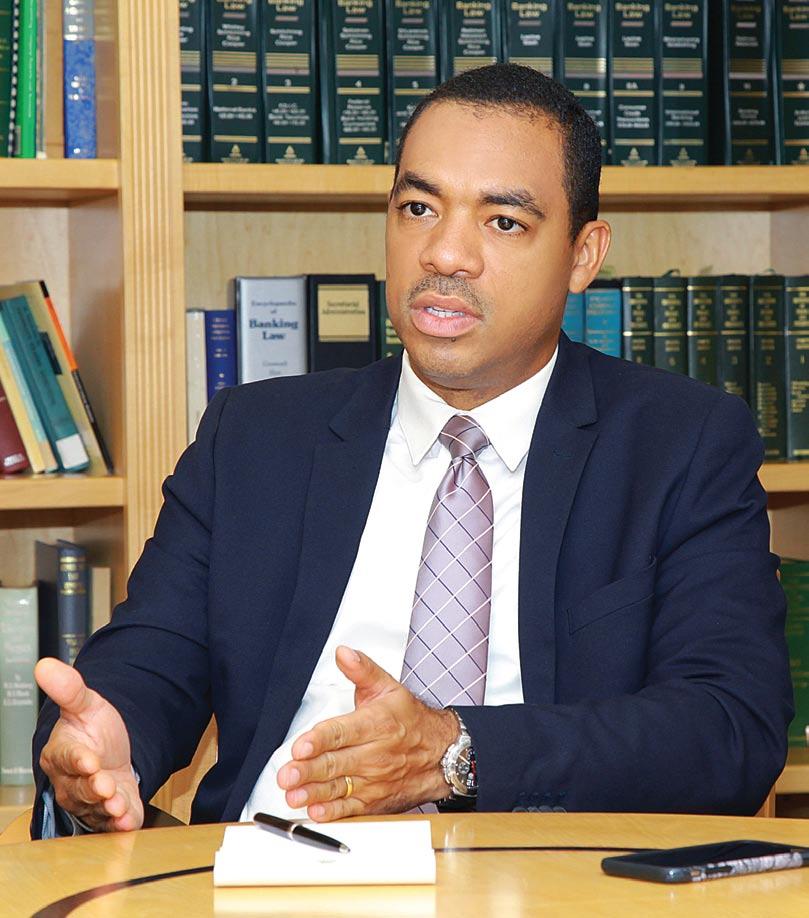
We asked him whether he felt that his lending his voice to the cause would make a difference. He was under no illusion that the matters of crime and violence are complex issues and that solutions present a real challenge – not only for the government but also for lawmakers and those assigned to protect and serve.
Julien says, “Some may choose to remain remote on the issue. I choose not to. I know we can’t boil the ocean but we can tackle it bit by bit, this is our home.” First Citizens invests in programmes focused on redirecting youth to a positive
Corporate Sustainability Review 31
You’ve seen him on the television advertising series which aims to build awareness about violence against women and children. Jason Julien, along with a number of other business leaders
“Unlike others who hide behind Facebook and hide in the shadows of Instagram and Twitter, some of us chose to come out into the spotlight to give the cause a face – and a voice.”
expression of self. His voice is among the many voices that First Citizens is channelling towards affirmation and positive action. The annual Spoken Word competition and the Schools Calypso Monarch competition provide platforms for social commentary and an outlet to express opinions.
Julien brings his perspectives on the equality of women and their unique value to the board room. “There’s no glass ceiling here”, he says of First Citizens. “Our Group CEO is a woman”he is speaking of Karen Darbasie who assumed the leadership mantle in 2015. He adds, “Prior to Sterling Frost, our last Deputy CEO of Operations and Administration was Sharon Christopher.” Currently a third of the management team is female and Julien believes that will change further in favour of more women in leadership positions. He explains that more than 60% of the Bank’s employees are female and that the trend is common in the Banking and Financial industry in Trinidad and Tobago.
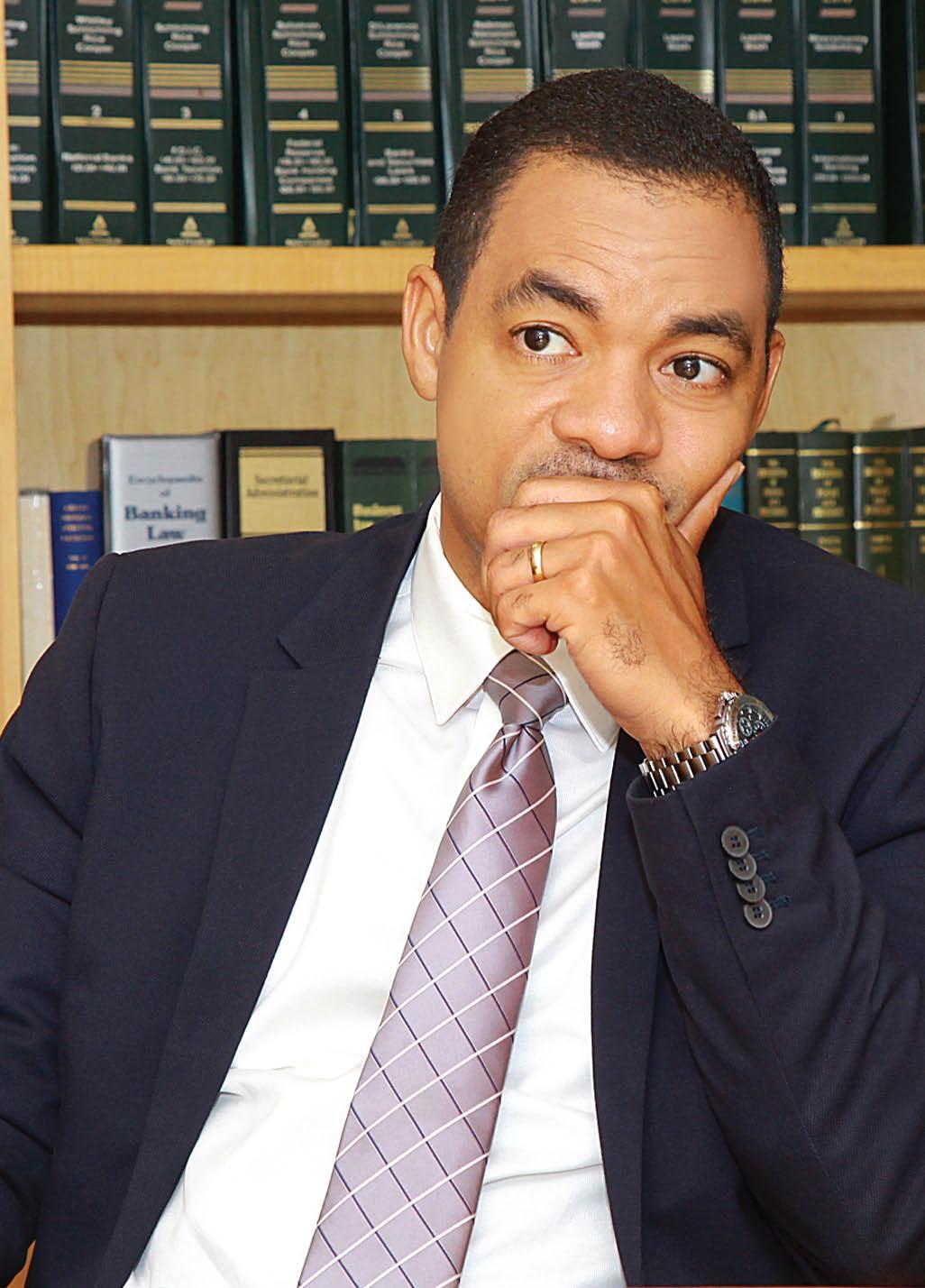
He laments however, that while women are rightly assuming greater roles in the workplace and in society, men are lagging behind. He believes that this is a growing trend which needs intervention. He reflects that the underperformance is not just in academia but also in sports and most significantly in the home. “Just look at the SEA, CXC and CAPE results” he says, “Girls are at the top. Look at women’s cricket or football
or the recent triathlon, the girls are doing better than the boys.” He wonders aloud about what will happen in the next generation.
We asked him to speculate on the source of the problem. He ponders the school system and what it might take to fix it. He explains that even at the entry-level into high school, postSEA, the requirements for the top schools vary by gender. If entry at the top male schools requires an 80-plus mark range and for girls it’s 90-plus, then it should be no surprise that the girls are the ones matriculating first for university entry. Clearly there’s a problem that begins at the feeder end of the education value chain.
“But it goes back to the family”, says Julien. Absent fathers are leaving young men to be raised by women – many of whom are very young, hardly adults themselves. While the evidence is not empirical, based on observation, the notion of family is changing and says Julien, “We are paying a price”. He is speaking about the correlation between the prevailing economic conditions and rise in crime. “We must invest in our young men”, he states “As the economy gets tighter, those in the margins will become more discouraged and can’t see a way of escape. There are practical realities of food and shelter that come with economic constraints, and we all have a part to play to ensure that there are safety nets for the more vulnerable.”
Julien knows that he cannot do everything. “My sphere of influence is finite. I have the ability to speak, to get attention, to move resources towards a cause and that’s what I will continue to do. Unlike others who hide behind Facebook and hide in the shadows of Instagram and Twitter, some of us chose to come out into the spotlight to give the cause a face – and a voice.”
“This is home” says Jason Julien. “I want the best world for my daughter – not just to give her an education, but to give her life in a free and safe society. To prepare her, I need to make my home better, I need to make my workplace better, I need to make my society better, I need to do my part to make Trinidad and Tobago better. So I begin with shaping her mind and her responses to the issues by becoming involved myself in shaping what’s out there in our homeland.”
For more on First Citizens and its social investment work, see our CSR profile in this and our 2016 issues.
32 Corporate Sustainability Review
“We must invest in our young men”

Caribbean Perspectives
The Corporate Social Responsibility Review is introducing a section on Caribbean perspectives on social responsibility and how the shared-value agenda is emerging in the region. In the first of this series, we bring you the Cooperative Republic of Guyana.
Social issues are everybody’s business
How CSR is thriving in Guyana

Guyana is a multi-ethnic society, rich in culture, and with vast mineral resources, much of which remains untapped. With the advent of oil, the country is poised for a major turn around and all the world is watching – none more closely than its closest Caribbean neighbour Trinidad & Tobago, whose own fortunes have been built on over a century of oil and gas production.
Guyana is the only English-speaking country in South America and shares cultural and historical bonds with the Anglophone Caribbean – this according to the 2017 CIA World Factbook. Guyana’s two largest ethnic groups are the Afro-Guyanese (descendants of African slaves) and the Indo-Guyanese (descendants of Indian indentured laborers), which together comprise about three quarters of Guyana’s population. A significant percentage (16.7%) of the population is classified as being of mixed origin and 9.1% are Amerindian –descendants of 12 major tribes. The remaining ethnic groups are Portuguese, Chinese and European Caucasian.
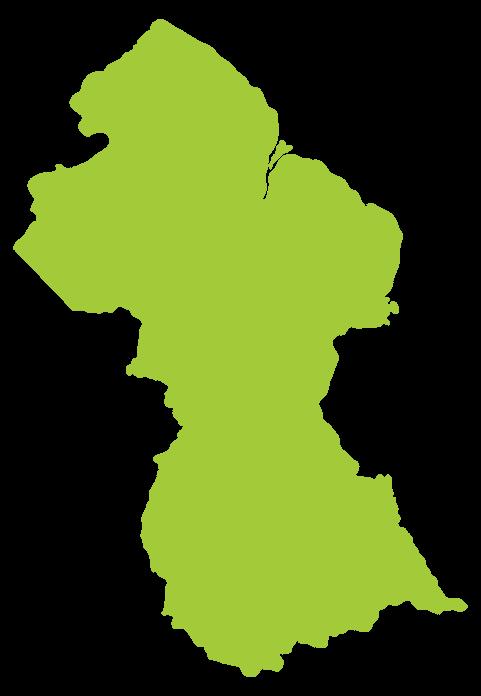
About one-third of the Guyanese population lives below the poverty line; indigenous people are disproportionately affected given the challenges of infrastructure in the heavily forested 84,000 square miles of territory that makes the country the largest in the Caribbean countries. Prior to Guyana’s oil find, the country’s emigration rate has been among the highest in the world - more than 55% of its citizens reside abroad. With first oil, many have reason to believe that
by Donna Ramsammy
this is going to change as the country draws from its highly skilled diaspora.
The Guyana government knows that it requires the power of tripartite collaboration to drive appropriate solutions to a number of social and economic challenges and corporate Guyana is stepping up to the plate.
Hon. Raphael G.C. Trotman, MP, Minister of Natural Resources, provides a clear perspective on such partnerships in his Ministry’s 2017-2020 CSR Framework. The Ministry of Natural Resources seeks to forge sustainable development of the country’s natural resources with industry stakeholders. Minister Trotman says, “This Corporate Responsibility Framework recognises the value of the thousands of lives that are impacted by the business of exploration and extraction of natural resources.” More specific to his agenda for collaboration on building shared value for business and communities, he states, “We are…joining hands, with the industries that are involved and with the communities where these activities take place to change the very way in which we view and respond.” He further emphasizes , that partnerships are important, “not only because they make labour more efficient, but also because they lead to cohesiveness.”
In this highlight, we present the work of three companies - New GPC, Demerara Distillers Limited and Scotiabank Guyana.
34 Corporate Sustainability Review
New GPC Building shared-value through health and wellbeing
The United Nations Sustainable Development Goals (SGDs) set out a vision for ending poverty, hunger and inequality, and protecting the Earth’s natural resources by 2030. These goals are reflected in New GPC’s Social Investment strategy through its focus on health through affordable access to medicine. Programmes that are designed to promote wellbeing through sports are also aligned to the SDG goals.
It should be noted that the CSR concept of shared-value in Guyana is still in its formative stage and while in other MDCs in the region there is a thrust towards strategic partnerships and global standards, this is not quite so for this territory – at least not just yet.
The New GPC does however work with NGOs to implement and monitor programmes. Its primary partner is the Guyana Diabetic Association. Based on data out of the Ministry of Public Health, as at last year there were more than 50,000 people living in Guyana with diabetes and that number is likely to be on the increase. The New GPC team works with registered nurse Mrs. Glynis Alonzo-Beaton, President of the Association, to conduct educational outreach, health assessments including free HBIC tests and distribute free drugs to communities.
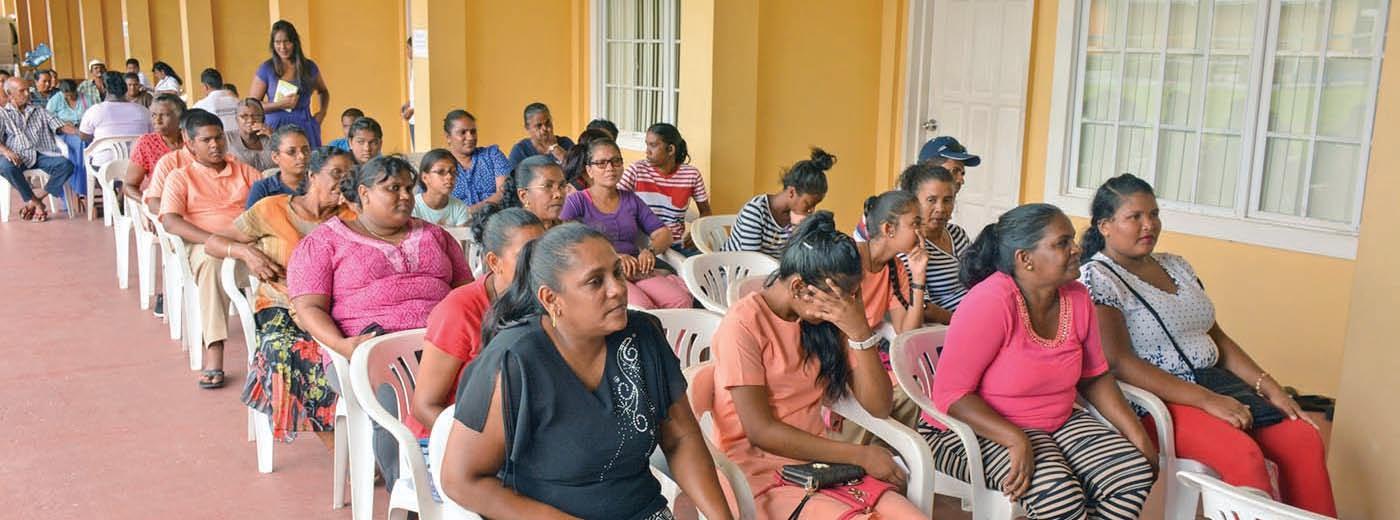
The New GPC CSR strategy is built on Shared Value principles where business objectives and social responsibility converge. The health outreach provides a marketing value to products that are locally produced and more affordable than imported drugs. The company’s investment in sports is aligned with its

core objectives of a healthier Guyana through healthy lifestyles.
In partnership with the Diabetic Association, NGPC’s medical outreach has a structured programme to bring awareness to the disease using pictorial aids to ensure that persons who are not literate can also benefit from the programmes. Due to lack of electricity in some areas, video is not an option. The Company has established drug distributors throughout the country including remote areas to ensure continuous availability and cost-efficient drugs. Most of the generics provided by NGPC cost on average 500% less than imported drugs. Apart from standard drug treatments such as atrostatin and metformin, the Company also produces and distributes especially for diabetics, sugar-free medicines for colds and flus, tonics, vitamins and even a generic form of Viagra called Excite.
The outreach targets one community per month and staff volunteers organize to set up and take sample drugs to support the programme. The programme also includes the services of a nutritionist to address food and nutrition as a necessary intervention to combat and prevent diabetes and other lifestyle diseases. The team is accompanied by a medical doctor who is able to conduct on-site examinations and administer prescriptions as required. The programme is able to reach hinterland communities in regions one, two, seven, eight, nine and ten, by setting up in markets where many indigenous people travel to trade goods. Due to limited human resources and the capacity of the Diabetic
Corporate Sustainability Review 35
Persons waiting to be attended to at the New GCP’s medical outreach.
Association, the programme is somewhat limited but still gets to remote regions though the efforts of Mrs. Baton’s team. The team often travels for days using speedboat, ferry and trucks to get to hinterland areas. Now in its sixth month, an average of about 250 persons attend the monthly sessions.
The major challenge is funding. The Diabetes Association does its own funding and staff at NGPC also do fund raising to conduct community sessions. Money is needed for independent eye testing equipment as ocular diseases are a common side effect of diabetes. Although many communities are in need of foot care and eye care clinics for diabetic; but most rural clinics are not equipped to meet these needs and patients are unable to travel because of the costs and distance. The Company hosts a weekly talk programme on Radio Guyana 89.5 to get to those persons who cannot be accessed by the team.
New GPC’s social investment also includes corporate outreach through school tours of its facilities and sponsorship of medical students in its ongoing efforts to promote the sciences. Its recruitment of local talent also helps in building capability and capacity in country for the industry. The complement of over 100 staff covers several disciplines including chemists, biologists and microbiologists, machine operators, batch leaders, pharmacists, plant engineers, maintenance technicians, inventory, information technology, accounting and finance, human resource, procurement, quality analysts and technical and administrative staff.
The Company is best known for its investment in sport. The company sponsors career athletes including the Amazon Warriors cricket team. Discussions are underway with the Ministry of Culture, Youth and Sports and the Caribbean Premier League to strengthen the sport among the the youth of the hinterland community. The company also sponsors football, hockey and rugby.
The Company is aspiring to grow its sponsorship of cricket with the Guyana Amazon Warriors through a new 5-year initiative aimed at engaging and inspiring indigenous peoples. Cricket in the Jungle is a structured five-year programme. Phase One targets youth 6-16 year olds and provides coaches, equipment and mentorship for two years. Phase Two takes the cream of the crop into competitive cricket and Phase Three, the final year identifies the cricket stars for regional and international participation.
The programme can benefit from additional funding of equipment, uniform and coaches if a co-sponsor comes on board to broaden the reach, impact and sustainability.
Business Profile
The New GPC Inc. is a private company which has its roots in the Bookers Drug Store of the 1920’s colonial period. Bookers manufactured principal proprietary medicines that were, up to that time, been imported into British Guiana.
The Company’s product line quickly expanded to include products such as Limacol and Ferrol, which were immediate successes on both local and international markets. Over the years these and many other of the Company’s products became household names in Guyana and throughout the Caribbean.
In the years that followed the company underwent several corporate changes both in ownership and name culminating in its nationalisation in 1976 and the establishment of the Guyana Pharmaceutical Corporation Ltd. In December 1999 pursuant to the Government of Guyana’s Privatization Policy, the Guyana Pharmaceutical Corporation Ltd. was privatized and the present company, New GPC Inc. (new GPC) was formed. Government is a 10% shareholder.
New GPC carries on a ninety-year tradition as the Caribbean’s oldest and largest pharmaceutical manufacturer of generic pharmaceuticals and over-the-counter preparations of the highest quality. The Company is proud to be a major contributor to the economy and to be one of the largest companies providing continuous employment.
New GPC manufactures approximately two hundred generic, over-the-counter and veterinary products. The Company’s product line also extends to cosmetics, household cleaning agents and an array of essences. These products are all sold on local and international markets.
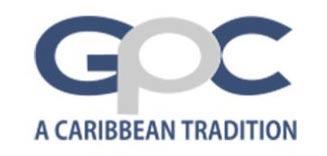
36 Corporate Sustainability Review
Guyana Distillers Limited poverty alleviation through investment in education
Headed by President and Chairman Mr. Komal Samaroo, the management team of Demerara Distillers Limited (DDL) has focused the Group on value-added brand development and diversification of its sources of revenue. With an operating profit of US $16.9 million in 2015 and listed assets of US $57.4 million, DDL has done well both at home and abroad. That goodwill is also redounding to the benefit of DDL’s community.

Attendant to this objective, the company’s sustainability is inextricably linked to its Shared Value principles in social responsibility. The company believes that as it prospers so should its communities. Its CSR focus is on the development of youth through education and sport. The company believes that it is critical to focus on building capacity among the youth to position the company to grow business and to position the country to respond to an increasingly complex and volatile global market space.
DDL has as part of its management structure, the DDL Foundation which manages its community investment, monitoring and reporting. Some of the DDL projects are run through strategic partnerships such as the University of Guyana and sporting bodies such as the Guyana Amateur Boxing Association, the Cycling Federation, Cricket Board and the Guyana Hockey Board.

The signature CSR programme of the company is the DDL Foundation Scholarship programme which provides subsidies to students to cover transport, meals and books. An important feature of the programme is its mentorship dimension which sees the direct involvement of the company’s leadership. The programme currently engages 26 students and 26 company mentors. Each child is paired with a mentor who monitors the performance of the child and provides the necessary moral and other support during the period of their relationship with the Foundation.
Students are supported for five (5) years from entry into high school to form five. Following a public canvas through press advertisements, candidates from all over the country apply. A rigorous assessment looks at the most needy and most capable students and provides funding scholarships to ensure that they are able to stay in school and to perform well. Very often children come from female-run, single parent households.
Funding is done through a matching programme by the company. DDL staff raise funds through a number of staff activities such as lunches or cake sales. Corporate marketing initiatives also provide funding. For example part proceeds from our 50th Anniversary Special Edition Rum sales went to the Foundation. Funding covers books and transport as well as meals in most instances. Additional funding for special circumstances is considered on a case by case basis.
The work of the DDL Foundation ensures that bright and promising youth are allowed to pursue an education especially where their social circumstances could prevent them from doing so. Beneficiaries are all nationals of Guyana regardless of race, religion or creed. In this way, DDL is ensuring that the country benefits from the best minds and talent through investment in the early stages of the education value chain. These students must satisfy criteria that demand high levels of continuous academic performance.
Poverty is a key factor in considering suitability for awards as the company sees this as the primary reason for investing in the programme. DDL believes that poverty presents obstacles to bright and capable students pursuing higher education and breaking the cycle. Therefore lack of financial resources is a primary consideration.
Corporate Sustainability Review 37
Andre Russell of the Jamaica Tallawahs receives an El Dorado commemorative bottle of rum from DDL Chairman Komal R. Samaroo
The programme relies heavily on volunteerism as a means of mentorship of awardees and is supported by an enthusiastic team of staff volunteers who provide mentorship to assigned awardees. They meet and review report cards, take them on supervised social events and advise them on matters of schooling and family life as necessary. Mentors contribute personal time. Because students are in school, interactions are reserved for weekends. The company ensures that a safety clause is duly signed as a security and protection measure as minors are involved. Mentors are not permitted to provide gifts of any kind, or money or to organize home visits. Visits must be in public space and accompanied.

Business Profile
The Demerara Distillers Limited Company (DDL) is located at Plantation Diamond on the East Bank of the Demerara River in Guyana. An amalgam of some 300 estates dating back to 1670, the company which is wholly locally owned and operated, has maintained the standards and methods of this age-old industry through the centuries, and the unique original heritage stills and equipment have been preserved – “all operating in tandem with the most up to date production technology.”


Distinguished for its unrivalled bulk rum capacity, the distillery can produce in excess of 26 million litres of pure alcohol annually, and is the largest supplier of bulk rums and alcohols from the Caribbean to brand owners in Europe and North America with a clientel that includes companies such as Diageo, Jim Beam Brands, Hiram Walker, Allied Distillers, and Corby’s.
Committed to the protection of the environment and preservation of national history, the Company possesses its own CO2 plant, utilising the waste product from the distillery to produce piped liquefied gas for its aerated beverage plant, as well as cylinder gas for industrial use and dry ice for the fishing and frozen food industries.
38 Corporate Sustainability Review
DDL is keen to expand the programme through partnerships.
Best and brightest - DDL Foundation Awardees
DDL’s historic warehouse holds 50,000 barrels and contains rums as old as 25 years.
Guyana
Focus on indigenous communities
Scotiabank’s CSR principles are built on the philosophical belief that every customer has the right to become better off. The Bank’s CSR strategy is encapsulated in this phrase, “Better Future, Better Off. By action through our priorities, we aim to create a better future for both society and Scotiabank.” This shared-value concept of mutuality is reflected in a corporate catch phrase - Building the Economy of Everyone.
Scotiabank’s social engagement is built around five strategic commitments. In actualizing the Company’s commitments, it seeks to address the priorities that are most important to the success of its customers, its business, and the communities in which it operates. The five strategic CSR commitments are to: Customers, Employees, Community, Environment and Corporate Governance – which requires the institution to act with integrity as it responds to the diverse and complex challenges, opportunities and interests it faces.
Scotia is a signatory to the UN millennium goals. At Scotiabank, investing in communities has been a focus for decades. In 2016, Scotiabank contributed over $70 million to help our communities around the world. In addition, Scotiabank employees dedicated more than 400,000 hours of volunteering and fundraising time to local causes.
Primary social investment targets are young people. This is consistent with the bank’s belief that investing in young people is the path to achieving long-term security, stability and prosperity for both communities and business.
Scotiabank supports organisations and programmes that are committed to helping young people reach their full potential, particularly in the areas of health, social well-being and education.

Scotiabank Guyana complies with corporate global guidelines for administering and deployment of CSR funding. Under the guidelines, the Bank will consider support for organisations that are either registered charities or nonprofit organisations in their jurisdictions, organisations with a sustained record of achievement, and in programmes that have measurable impact.
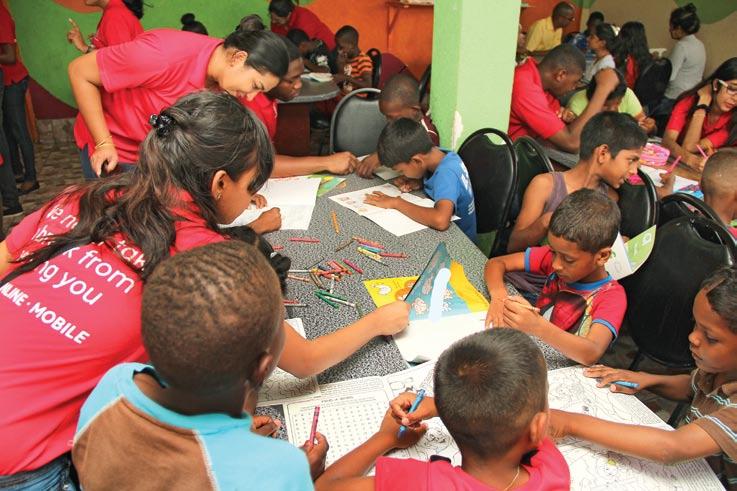
Scotiabank Guyana’s CSR focus is in sports, education, arts and culture as well as health specific to HIV/AIDS and cancer. Funding is received from the corporate office under the Scotiabank Community Programme, where an established committee reviews CSR project submissions for financing. Under the Community Programme, employee volunteers raise funds through various activities and these are matched by the bank and gifted to successful organisations or charities.
Scotiabank’s community investment strategy relies on employee volunteerism and partnership with NGOs and CBOs to deliver approved programmes. Scotiabank Guyana employees through its branches, engage in fund-raising activities that further benefit from Scotiabank’s matching programmes and annual corporate donations. Scotiabank will match programmes up to the value of CAN $10,000.
Apart from Kiddy Cricket which aims to help primary school children develop a life-long passion for the game and has defined the Scotia brand in Guyana and the Caribbean since 2000, Scotiabank Guyana’s Community Programme is the main mechanism for stakeholder engagement and CSR investment and satisfies UN Sustainable Development Goals in health, education and inequality. The Bank has a rigorous monitoring and reporting system – especially for multi-year commitment and does due diligence on every project it supports.
Corporate Sustainability Review 39
Scotia Bankers volunteer at a children’s home
Beneficiary organisations must be focused on improving the well‐being of youth and making a measurable impact on helping to develop children and young people under the age of 18 or young adult dependents up to the age of 25 years old who are enrolled in school.
Some programmes which have benefitted from the Scotiabank Community Programme are:- The Guyana Foundation which is focused on suicide prevention; the Tina Insanally Foundation which teaches music to under-privileged children; NGOs dedicated to cancer prevention programmes; Education and Health programmes through the local Lions or Rotary organisations; Habitat for Humanity; and Youth Entrepreneurship through a partnership with the Georgetown Chamber of Commerce. The Scotiabank Vision Achiever Programme LivePitch Business Plan competition which provides winners with GUY 500Kand a $250Kstart-up business account and business training through ActionCoach Guyana.
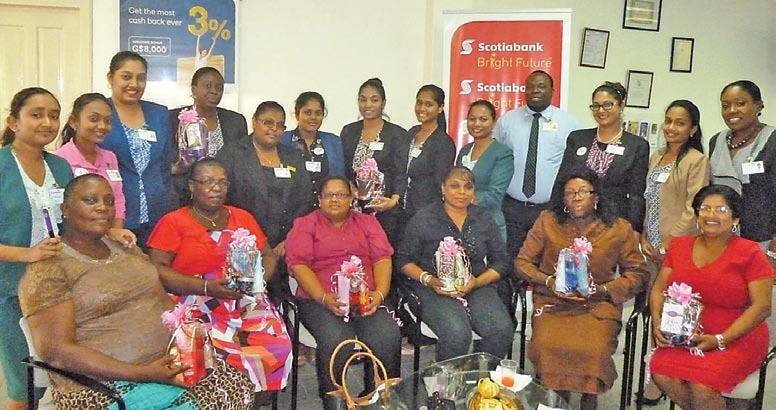
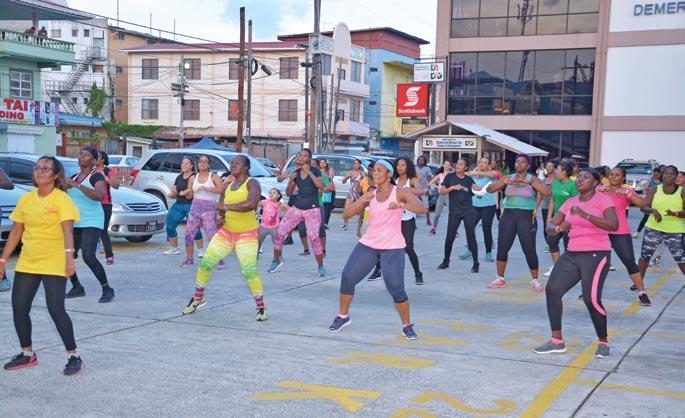
International Women’s Day (IWD) is big for the branches, which often support sponsorship of programmes, lectures and forum on issues affecting, or of interest, to women. The bank uses the opportunity to educate women in prudent financial management.
In recent years, the bank has focussed its attention on the country’s rural communities where issues of alcoholism, lack of educational and entertainment resources and unemployment drive some of the highest suicide rates per capita in the world. Through the Guyana Foundation Sunrise Centre, at risk persons are targeted with skills development programmes and counselling.
Through the Rotary Club of Georgetown, the Bank contributed to the production of a film focused on building awareness of suicide and mental health issues through public education. Film is used as a teaching tool, by interviewing survivors, affected families and community members to get perspectives and deepen understanding of causes and triggers and how to avoid or manage them. The film is scheduled for release by end of 2017.
Business Profile
Scotiabank is a leading multinational financial services provider and Canada’s most international bank. The bank provides innovative financial products and services to individuals, small and medium-size businesses, corporations and governments across Canada and around the world.

Scotiabank employs some 90,000 persons. With over 23 million customers, Scotiabank is a leading financial services provider in North America, Latin America, the Caribbean and Central America, and Asia-Pacific.
In 2016 Scotiabank delivered strong operating and financial results, earning $7.4 billion in revenue. Growth was driven by steady performances in personal and commercial banking in Canada and internationally –approximately 80% of which was generated by Canada alone.
The bank’s strategy of diversification underpins our potential for sustainable earnings’ growth in each of our business lines: Canadian Banking, International Banking and Global Banking and Markets, over the long term.
Scotiabank has been operating in Guyana since 1968. The bank has five branches across the country and offers a complete range of retail and commercial banking services — including online banking and electronic cash management and Merchant Services. The Bank also offers business banking services to smalland medium-sized businesses.
40 Corporate Sustainability Review
A zumba dance party by Scotia raises funds for school supplies
Scotiabank honours female educators in Parika


The Sterling Stewart Royal Reading Room
Prisoners find solace in books
by Robert Clarke
The walls of the old condemned cells in the Port of Spain prison were thick. Thick because anyone who found himself between them was supposed to remember he would never be leaving. And thick because they were built of stone and mortar alone, as things were done when jails were built in 1812. But now they’re gone — sledge-hammered away to make room for Debbie Jacob’s dream — a proper prison library.
The diminutive school librarian and literacy teacher arrived at the Port of Spain prison a couple years ago with experience in penal institutions. Outside of her day job at the International School of Port of Spain, she had taught a CXC English class to teenagers at the Youth Training Centre (YTC), learning along the way that an appetite for reading often led to selfexpression. “My students found solace in books,” recounted Jacob at the launch of the Sterling Stewart Royal Reading
Room at the Port of Spain prison in March of this year, “and they began to write about their lives.”

When one of her young charges disappeared from YTC, she followed his trail and found him in the adult system at Port of Spain. “YTC gave up on him,” she says. “I wasn’t ready to give up on him.” But the facilities for his ongoing education were depressing — a tiny room known as “The School” that doubled as a classroom and tailoring shop. The only books he might come across were holy ones or perhaps a bit of newsprint, much sought-after at bathroom time.
Through her NGO, Wishing for Wings, Jacob started down the path toward a prison library. First she got the buy-in of Prisons Commissioner, Sterling Stewart, then she convinced another NGO, The Children’s Ark, that the children of the prisoners would benefit. “I told them my dream has always been to start
42 Corporate Sustainability Review Feature Story
“Because these are guys who live in the moment. One of the reasons they’re in trouble is because they can’t see consequences from what they do at this moment.”
a programme in prison where inmates would be able to read to their kids.”
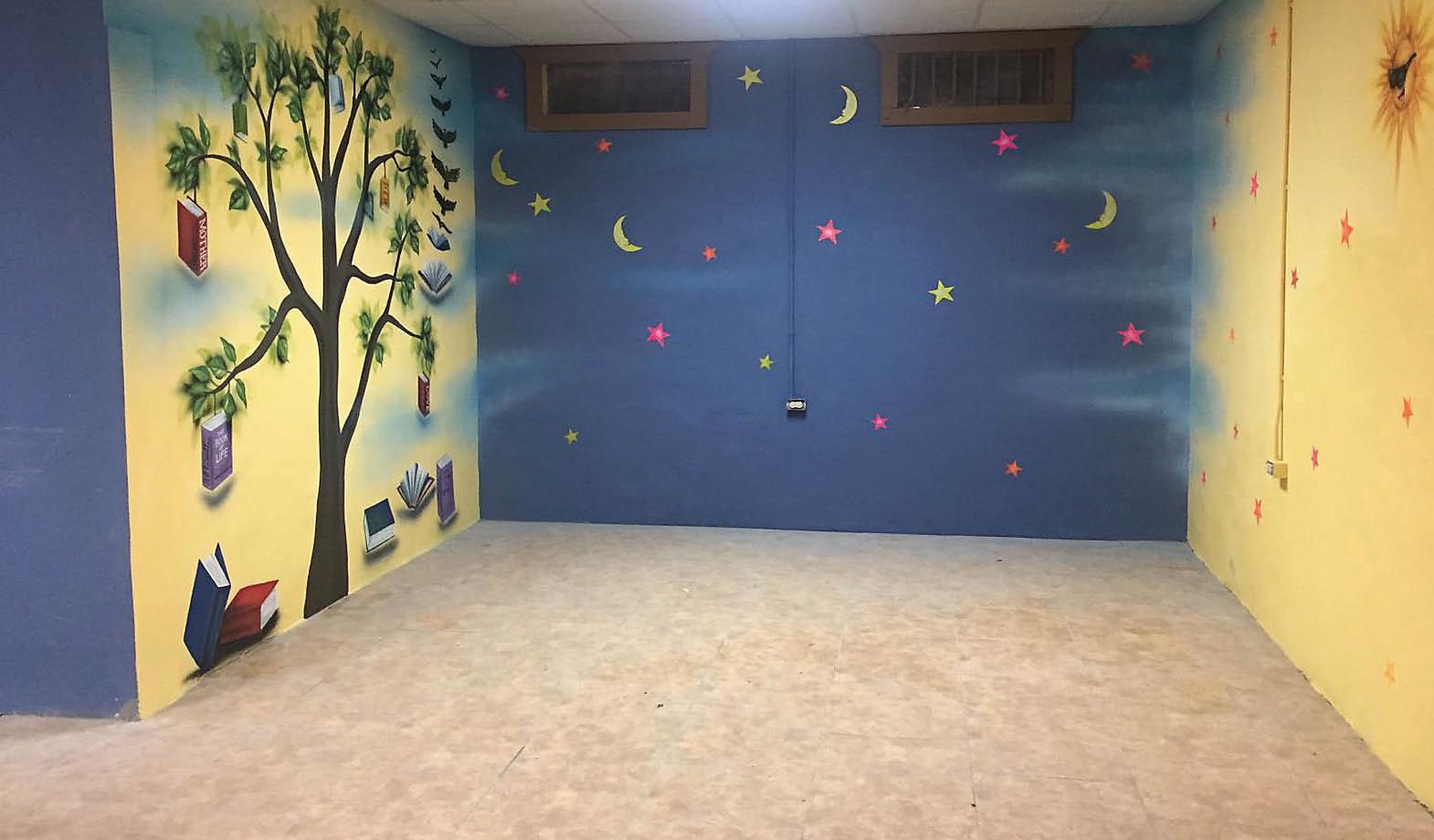
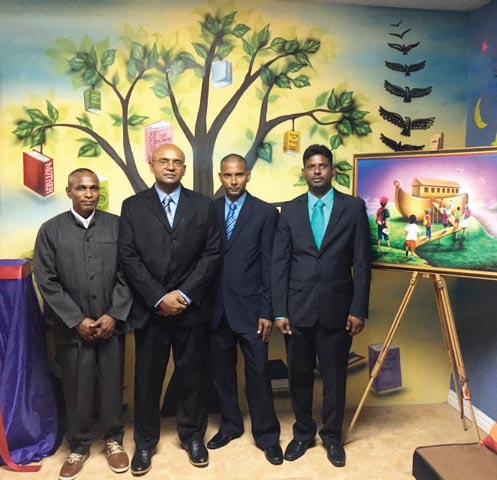
A space would be needed. “The School” was not appropriate. The search began for somewhere secure but relatively accessible, so the children could get in without having to forge deep into the prison. The old condemned cells were eventually earmarked.
The Children’s Ark paid for demolition, plastering of the new walls and tiling. Inmates from the Carrera prison, some of whom had spent time in the now-demolished cells, were brought in to paint scenery on the walls. “To have that power to pull down those cells and build something so positive –light and beautiful and positive inside of there. And then be able to paint that scenery and everything, meant a lot to them.” The space was large, with a classroom and a “goodsized” library, and an area designated for inmates to read to their children.
Wishing for Wings found a corporate sponsor. The National Gas Company paid for an electronic check-out system and library training for a prisons officer. They donated e-readers and devices for listening to audio books, although the prison’s painfully slow internet connection prevented most downloads. And Jacob started teaching.
She teaches 12 students — all on remand for murder — once a week, adopting innovative techniques to draw out their creativity. For two straight years they have held debates and even though Jacob has lamented the results (the “For” team won both years while arguing for corporal punishment and discrimination by religion), she was heartened by the development of their arguments.
She has also coached them to write a soap opera for the prison radio station and found that an unforeseen consequence was
Corporate Sustainability Review 43
Carrera inmates in front of their artwork at the Port of Spain prison’s Sterling Stewart Royal Reading Room.
The children’s reading area.
Debbie Jacob says the sums needed to keep the Royal Reading Room afloat are relatively small. Wishing for Wings could use $6,500 to run its PVC furniture-making class, and $9,000 for a tiling class. “These are skills we could send them back out into society with.”
The literacy component also requires support. Jacob was pleased recently when she saw one of her former students protesting for water; not because he was protesting, but because he was articulate about what he wanted for his community.
that they began thinking two steps ahead of their characters. “They soon started to realise, ‘He can’t say this because he said this in the past,” which was good because it demonstrated that they could see beyond the present. “Because these are guys who live in the moment. One of the reasons they’re in trouble is because they can’t see consequences from what they do at this moment.”
The Children’s Reading Room remains unused for now. The gritty details of ensuring that prisoners don’t take advantage of the new privilege have yet to be sorted out, and the prison administration still has to provide a separate entrance for inmates. But the new classroom is being used for Jacob’s literacy class as well as Wishing for Wings-sponsored courses in PVC furniture-making and tiling.
For inmates to read to their children from picture books, fluently and with emotion, Jacob says they’ll have to be coached by volunteers. That system is also being worked out, since volunteers will have to be screened by the prison authority, but Jacob expects the Children’s Reading programme to start “soon”.
In the meantime, she’s learning about male adult inmates’ reading preferences, in part because her daughter Ijanaya did a prison reading survey while working on her degree in Library Information Services. They like biographies — Martin Luther King; Pakistani advocate for girls’ education, Malala Yousafzai; cosmologist Stephen Hawking — and history. They don’t like science fiction. “They want to deal with reality,” says Jacob. “How to make their real lives better. They’re not looking to escape to some fantasy thing.”
She has also found that the prisoners still call the Port of Spain prison, the Royal Jail, so she went with their preference in calling it The Royal Reading Room, with the name of the former Commissioner of Prisons tacked on for good measure.
How would a corporate citizen benefit from contributing to a prison reading programme? “I wish corporations would really see that’s probably the biggest investment we can make,” says Jacob. “And if you can’t see the importance of investing in prison programmes or inmates, think about their kids. Think about the next generation. (The prisoners) say to me all the time, ‘I wish we had a teacher like you.’ Somebody who took the time to understand what their needs were.”
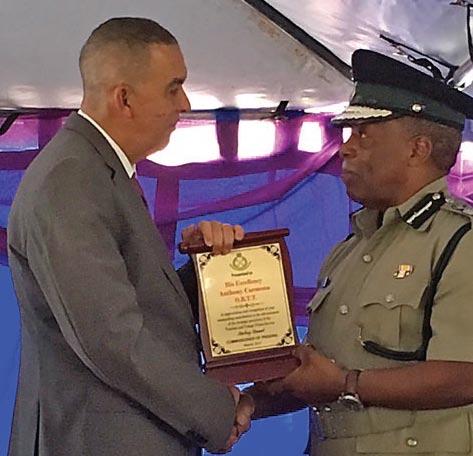
44 Corporate Sustainability Review
President Anthony Carmona and Commissioner of Prisons Sterling Stewart at the launch of the Royal Reading Room in March, 2017.
Sister Arlene Greenidge could use some targeted corporate hand-holding. At the top of a hill off Belmont Circular Road, she presides over the St Dominic’s Children’s Home, which houses 60 socially displaced children.
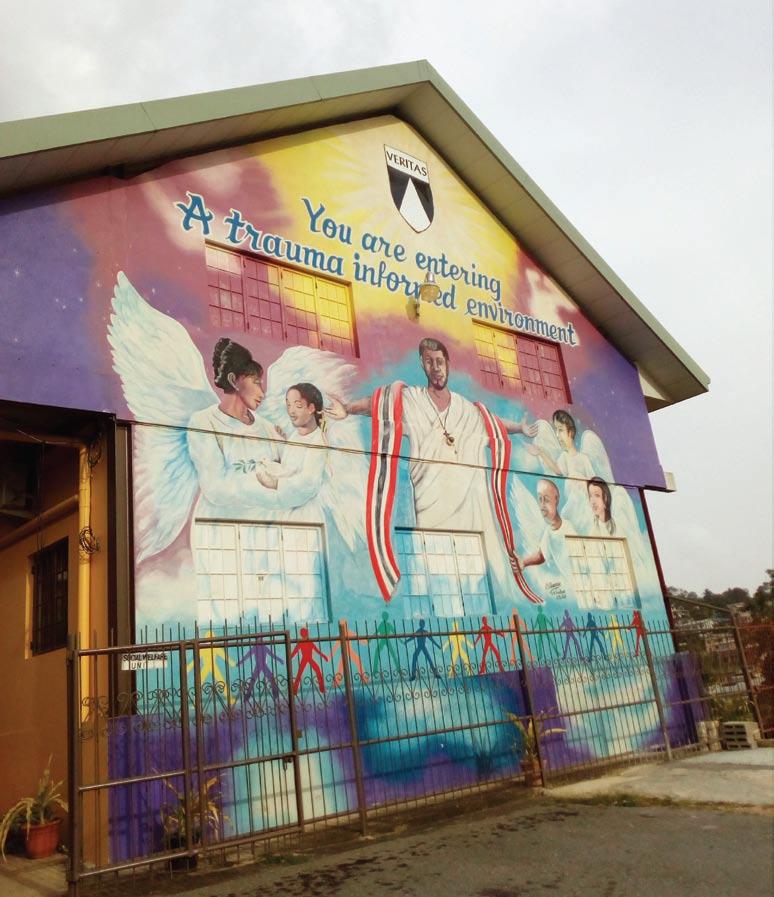
It’s not so much your money that Sister Greenidge wants. “Don’t get me wrong: We do need the money,” says the Home’s Manager, doing a decent impression of an advertising pitchman, albeit one wearing a black and white habit. “But there are other ways in which, especially at this point in our history, the corporate community can make a huge difference.” This story is about those other ways.
There was a time when the Home was referred to as the Belmont Orphanage, and the 300 socially displaced children housed in its large dormitories were identified as orphans. That time is past. The children of the Home now live in households of eight, so reasonable staff to child ratios can be maintained. And child care providers are now governed by laws that say it isn’t enough to love a child and do what you think is best for her; you have to conform to standards established by best practice.
Since 2015, when a package of children’s rights legislation was enacted and the Children’s Authority established, organisations that provide care for children have been increasingly regulated. They now require licenses.
The St Dominic’s Children’s Home Corporate voices are needed to help legislate change
by Robert Clarke
Greenidge calls it a radical paradigm shift, a “quantum leap” to a system of care based on the rights of the child, where staff skills and competencies are critical to success. “We’re trying to move from this archaic, unregulated system, and we’re trying to jump into the First World standards. But it means we need to catch up. Our stakeholders also need to catch up.”
Some have. Massy Group, for example, has provided St Dominic’s with the services of a Change Management consultant to help them navigate the complexities of the new regulatory environment. “And that is huge for us! We can’t say thank you enough for that.”
But corporate citizens are also needed to help the Home hone its messaging and lobby the authorities for reform and unification of the fractured governance structures that regulate the child care sector. “We may not necessarily have a loud enough voice on our own to bring about the change, or to cause the people who can bring about the change to expedite the change that needs to take place. But if there are people in our community who are on board and who can help raise that voice…”
Sister Greenidge sees St Dominic’s transitioning to a continuum of care, providing support for children in the family setting after they’ve left the home. They’d also like to get involved in foster care, which provides greater
Corporate Sustainability Review 45
Feature Story
permanency. And respite care is a possibility — providing a temporary home for children whose parents need time and space to get through a rough patch.
Gone are the days of instutionalization, when an “orphanage” was a total institution where children lived, ate, slept and attended school and church. Many St Dominic’s children are “mainstreamed”, going out to school and extra-curricular activities. “Our young people are no less exposed to the tastes, the values, the influence of teenagers in households, in families,” says Greenidge, recalling that the week before our interview, five St Dominic’s students had run off. They were
teenage girls, and especially vulnerable. Although they were all found safe and returned to the Home, Greenidge says the incident was another “indicator of the need for us to step up.”
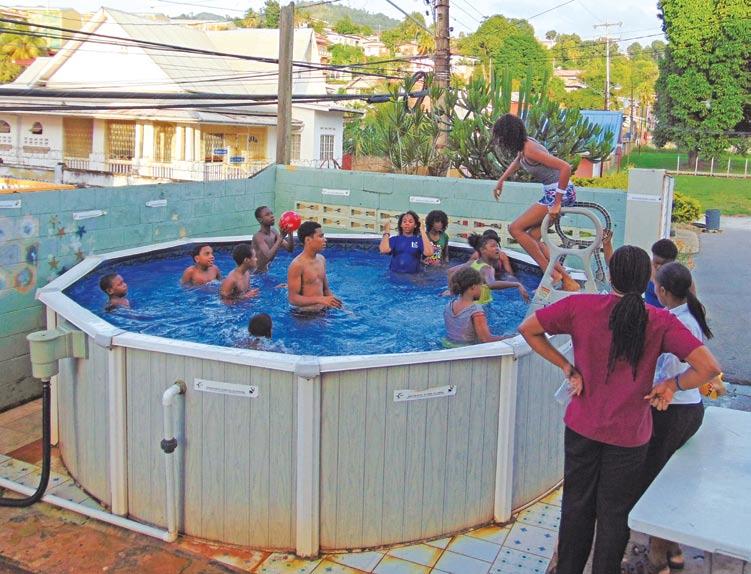
The Manager has a firm grasp of management jargon: She speaks in terms of organisational structure, change management, and skills and competencies. Increasingly, civil society institutions like St Dominic’s are applying the principles of business. So it’s fairly obvious that “corporate citizens” are the ones best placed to help her improve the lives and prospects of socially displaced children.
Gone are the days when corporate involvement meant donating gifts at Christmas. “Yeah, it’s nice to receive gifts, it’s important, but maybe we could move a little beyond that,” she says, acknowledging that businesses have every right to seek mileage for having positive impacts in their communities. Yet she finds some corporate partners more receptive to the Home’s needs than others. They ask how they can help, rather than presenting plans for what they’d like to do.
Ideally, Sister Greenidge envisions mutually beneficial partnerships in which corporate T&T burnishes its image while strengthening the social fabric. “I think it’s really a winwin situation. Not only are they able to present who they are in a way that’s very palatable for their publics, but they’re also investing in their own future. Because if they do not, you’re going to have to import personnel, or you’re going to have to make bigger and bigger and higher and higher walls.”
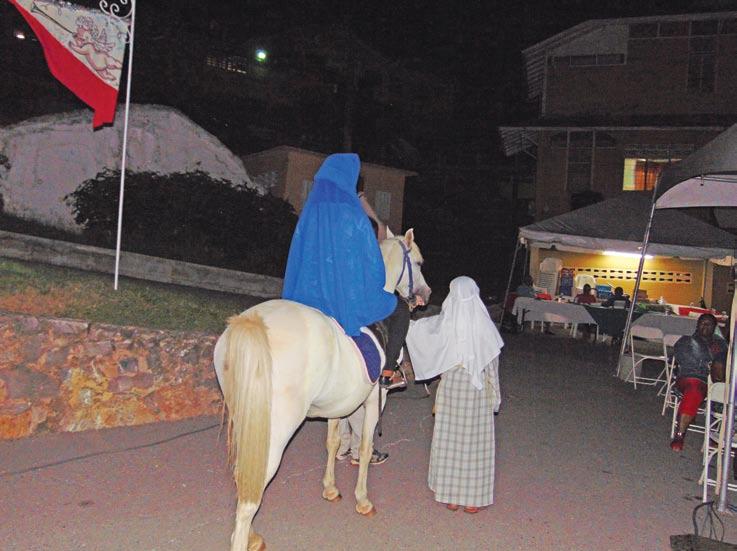
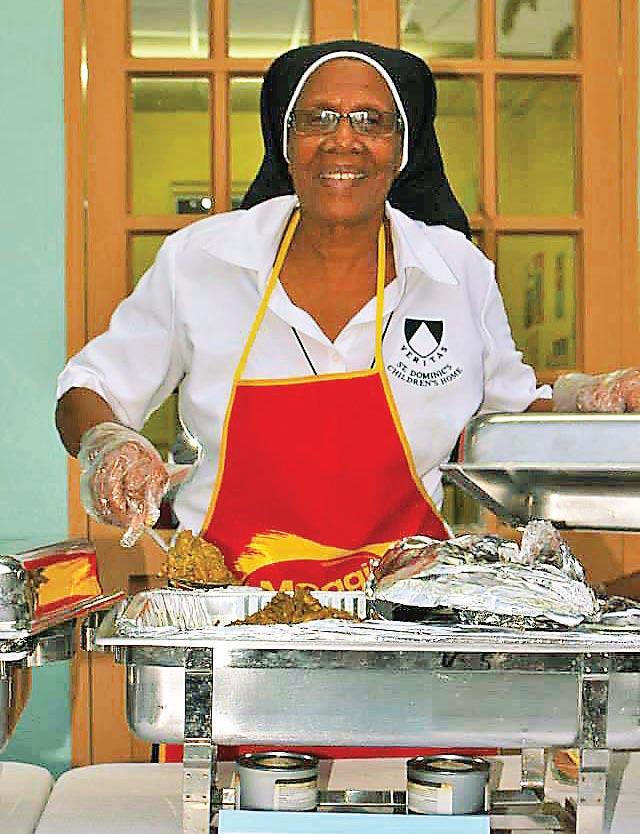
46 Corporate Sustainability Review
St Dominic’s children take a dip at the Shalom Centre.
One of the Dominican Sisters stirs up a pot of flavour
The St Dominic’s nativity play, 2016.
The St Dominic’s Children’s Home in Belmont can be reached at stdominicschildrenshome@gmail.com.
Opinion
CREATING SHARED VALUE Can

CSR Enhance Competitiveness?
by Kyle Santos BUSINESS SOCIETY
A sad state of affairs
It is news to no one that Trinidad & Tobago currently faces a maelstrom of economic, social and environmental challenges (“societal challenges”). A prolonged period of structural adjustment, spiralling crime rates, rampant corruption, ubiquitous land and marine pollution, creaking public institutions, a lack of public trust . . . we have them all and then some.
No one is completely immune to these challenges. The corollary of this however, is that each of us has an incentive and perhaps an obligation to help solve them. Government, the private sector, NGOs and individuals all have critical roles to play.
The sad reality is that only a handful can say that they are truly pulling their weight and making a meaningful contribution to our nation’s challenges. For example, in its 2017 report entitled, Are oil and gas smothering the private sector in Trinidad and Tobago? the Inter-American Development Bank concluded that, “The private sector is not up to the challenge of supporting economic growth, creating employment, contributing to government revenues in a significant way or improving the economic welfare of the nation’s citizenry.’ Admittedly, this statement is taken slightly out of context in this instance, and the report met with its fair share of
resistance; but, you would need to be wearing the most rosetinted of glasses not to see the truth in it.
In-keeping with this sentiment, this article considers the role of business in helping to solve some of our most pressing societal challenges.
The business of business . . .
In 1970, the economist Milton Friedman famously stated: “The business of business is business”, thus perfectly capturing the view that the only social responsibility of business is “. . . to use its resources and engage in activities designed to increase its profits so long as it stays within the rules of the game”. Put another way, a business’ role is to generate wealth, create employment, pay taxes and obey the law.
So
where
does this leave
Corporate Social Responsibility
(CSR), which the World Business Council for Sustainable Development’s (WBCSD) defines as, “the continuing commitment by business to behave ethically and contribute to economic development while improving the quality of life of the workforce and their families as well as of the local community and society at large”?
Surely it is worth considering whether, in their efforts to generate wealth, companies are solving or exacerbating societal issues and practising good corporate governance.
The rise (and fall) of CSR
Unfortunately, many companies see CSR as a public relations exercise, with little genuine interest in solving societal challenges, or indeed belief that they can drive real change.
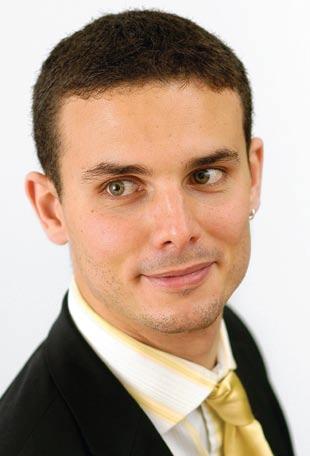
Corporate Sustainability Review 47
That being said, there are some incredible companies out there, who truly have responsibility ‘baked into their DNA’. Patagonia, Unilever, Tesla, and IKEA are a few current leading examples. Even Walmart, which isn’t necessarily a company that many think about in this context, has begun to change its tune, as the following quote indicates:
“Ultimately, we believe that serving customers and society is the same thing. You can’t have one without the other because, in the long term, their interests converge. Putting the customer first means delivering for them in ways that protect and preserve the communities they live in and the world they’ll pass on to future generations.”
Doug McMillon, President and CEO of Walmart
As highlighted in this CSR Review, most common in Trinidad and Tobago is a philanthropic approach to CSR; often with the aim of ‘giving-back’ to society. This may involve some combination of sponsorship, financial contributions and inkind donations (i.e. goods or services other than cash). Several companies also encourage staff to volunteer in support of a range of societal causes. Some even develop volunteering policies, which set aside a number of working hours or days that staff can spend volunteering each year.
These are all traditional CSR activities and they have a role to play in creating some positive impacts on beneficiaries. They are also very powerful employee engagement tools – that’s right, your staff are beneficiaries too, don’t forget that!
However, more and more companies are realising that by limiting themselves to traditional CSR approaches they are leaving value on the table. For instance, the impacts on beneficiaries tend to be narrowly focused and shortlived. Importantly, an organization’s ROI for these activities is also low. Of course, there are reputational benefits, strengthening of stakeholder relationships and improvements in employee engagement, but in reality, purely philanthropic approaches only scratch the surface of business value creation (table 01 outlines some of the potential business benefits of a strategic approach to the management of societal challenges).
It is no wonder why CSR budgets are constantly under threat and often among the first to be reduced in difficult economic conditions. Over the last 10 years I have worked with CSR practitioners from around the world and they are all acutely aware of the continual need to justify their existence. Luckily, there is another way.
Creating shared value
The concept of shared value, introduced by Michael Porter and Mark Kramer in their 2011 Harvard Business Review
Business benefits of a strategic approach to societal issues
• Greater impact on beneficiaries and societal issues.
• Demonstrable contributions to national development priorities.
• Revenue growth through the development of new or improved products and services.
• Access to the best talent, many of whom want their employer’s values to align with their own.
• Improved employee engagement and lower turnover.
• Strengthened stakeholder relationships.
• Compliance with supplier requirements.
• Identification of business
article, Creating Shared Value: How to reinvent capitalism – and unleash a wave of innovation and growth is defined as, “policies and operating practices that enhance the competitiveness of a company while simultaneously advancing the economic and social conditions in the communities in which it operates. Shared value creation focuses on identifying and expanding the connections between societal and economic progress.”
Shared value has a subtle but critical difference from CSR, which the World Business Council for Sustainable Development (WBCSD) defines as, “the continuing commitment by business to behave ethically and contribute to economic development while improving the quality of life of the workforce and their families as well as of the local community and society at large.”
The difference is in their respective approaches to value creation. CSR initiatives derive social value through a company’s efforts to ‘do good’, with business value an afterthought. Efforts to create shared value utilize a company’s core skills and resources (financial, human, intellectual, technological, physical, relational) to solve societal challenges through better business performance and practices. For example, Unilever articulates its corporate vision through its Sustainable Living Plan (SLP), which aims to grow the business whilst decoupling their environmental footprint from growth, and increasing positive social impact. Among the SLP’s goals is an ambition to help 1 billion people improve their sanitation and hygiene by 2020. This is achieved through an extensive behaviour change program, including Lifebuoy’s handwashing scheme - the world’s largest. By the end of 2015 they reached almost 500 million people, improving the life chances of new-born babies and children under five, who
48 Corporate Sustainability Review
table 01
are particularly vulnerable to hygiene-related life threatening illnesses. All while boosting sales of Unilever’s personal hygiene, cleaning and water filtration products.
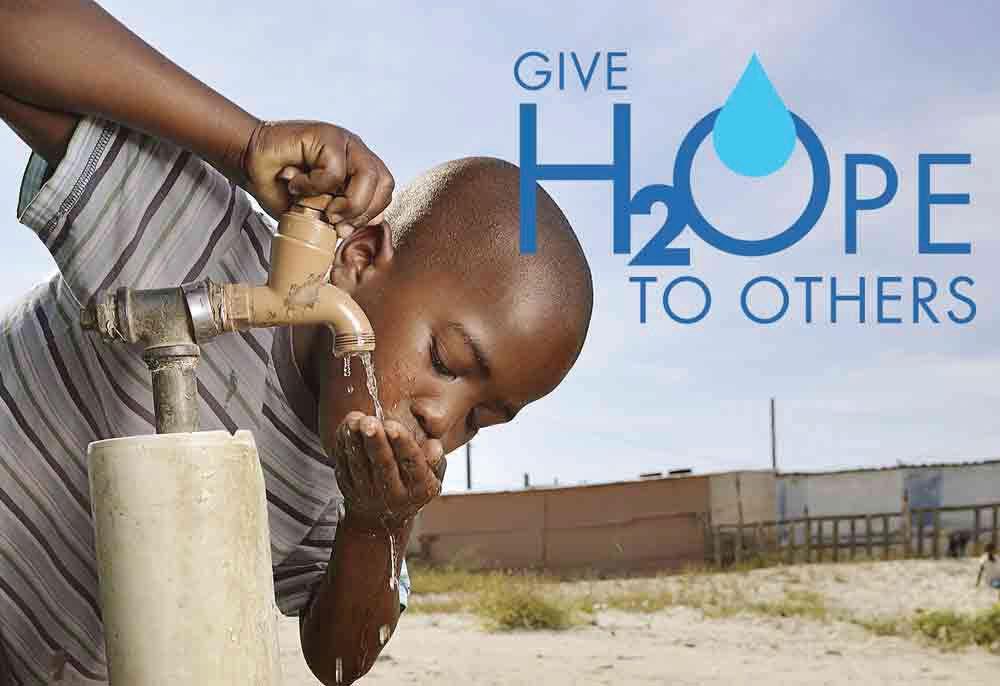
Examples like this show that with a bit of imagination, social and business value creation can be two sides of the same coin.
Some people take issue with this last point. They argue that when it comes to CSR, companies should ‘do the right thing’ without trying to generate business value. Such opinions cannot simply be dismissed, but there is a wealth of research which suggests that companies who are committed to societal issues outperform their peers. This is important not just for business, but also for investors – with a recent review1 of over 2000 empirical studies finding a clear business case for investing in companies with robust approaches to the environment, society and corporate governance.
The way forward
So, how can your business help solve some of our country’s greatest societal challenges? You can start by taking the following steps.
i. Understand your business’ purpose and values.
ii. Identify the relevant skills, experience and relationships that your business can leverage to drive change on societal issues.
iii. Engage your key stakeholders to understand their expectations of the business.
iv. Identify the societal challenges you are best placed to impact and the contributions you can make.
v. Assess how your existing CSR activities align to the above and adjust your approach accordingly.

vi. Create a coherent strategy & implementation plan to guide your approach, including relevant qualitative and quantitative targets and KPIs to track progress.
vii. Communicate progress, celebrate successes & acknowledge failures internally / externally.
Like anything else that is worth doing, it will take time and effort to generate true shared value, but consider it an investment in your career, your business, your community and your country.
Trinidadian by birth, Kyle Santos has spent over 10 years helping businesses to understand their social and environmental relevance and create shared value. Prior to establishing Kyle Santos Consulting, he spent eight years working with some of the UK’s leading companies as part of PwC UK’s world renowned sustainability & climate change advisory team and as a Senior Manager in the PwC network’s Global Corporate Responsibility team. Kyle Santos can be reached at ksantos@kylesantosconsulting.com I http://kylesantosconsulting.com/ I
+1-868-327-2359
Corporate Sustainability Review 49
1. Gunnar Friede, Timo Busch & Alexander Bassen (2015) ESG and financial performance: aggregated evidence from more than 2000 empirical studies, Journal of Sustainable Finance & Investment, 5:4, 210-233.
Unilever and Walgreens partner in clean water for African communities
Owning your FUTURE Knowing the Mindset, Gaining the Knowledge.
by Jaysen Francis
An entrepreneurial mindset together with the right mix of knowledge and skills can create the opportunity for building small businesses that propels competitiveness in the local economy. So, thinks Jaysen Francis, owner and founder of Shuffran Business Consulting.

Social and economic forces
of entrepreneurial activity existed as long as the beginning of society. As civilization became more developed, trade as an entrepreneurial skill was obtained through formal education. Knowledge, skills and expertise acquired from the educational sector play a significant role in entrepreneurship development, although some of the world leading entrepreneurs such as Norman Sabga, Richard Branson and Theo Paphitis, made their way in the field of business, without formal business education. There is also no universally accepted definition or model of entrepreneurship and business management theorists argue that entrepreneurship is set of activities that are taken by a person to draw together numerous resources and ideas and syndicate them into a commercially conventional product.
Benefits of Entrepreneurship
The importance of entrepreneurship for achieving economic growth in contemporary economies is widely recognized both by the policy makers and economists. Wealth and the majority of jobs are created by small businesses started
by entrepreneurially minded individuals, many of whom go on to create big businesses. Individuals exposed to entrepreneurship frequently express that they have more opportunity to exercise creative freedoms, higher self-esteem, and an overall greater sense of control over their own lives. Consequently, many experienced business people, political leaders, economists, and educators believe that fostering a robust entrepreneurial culture will maximize individual and collective economic and social success on a local, national, and global scale.
The Mindset of the Entrepreneur
As an entrepreneur, I advance that entrepreneurship is more about the mindset of the entrepreneur rather than the experience. The entrepreneurial mindset refers to that state of mind which orientates individuals towards entrepreneurial activities and outcomes. Individuals with entrepreneurial mindsets are often drawn to opportunities, innovation and new value creation (Fayolle and Lyon in Financial Times). However, moving from mindset to action is important and this can be achieved through gaining the right mix of knowledge and skills.
Entrepreneurial Education and Competitiveness
The lack of Entrepreneurial skills remains a challenge for the Trinidad and Tobago economy, which must be addressed if we are to increase our competitiveness on the global arena. Entrepreneurship education, in addition to the personality and mindset of the entrepreneur is a prerequisite for every successful entrepreneurial venture. While personality characteristics are thought to be innate, there are various skills and abilities which must be learnt if entrepreneurs are to

50 Corporate Sustainability Review
Opinion
be successful. These skills such as product and service design, business methods, knowledge of the industry, leadership, administrative, financial management, and the ability to acquire operating resources can be acquired through the formal education process.
Yet, entrepreneurial education has been challenged for not being able to produce entrepreneurs since it has been the established understanding among business professionals that some people are born entrepreneurs and will succeed with or without education once they possess the entrepreneurial spirit. Conversely there is a school of thought which argues that creativity and innovation which is the art of entrepreneurship is not teachable, except through experience. To increase competitiveness both the art and the science should be complimentary which is the subject of much debate.
The Nature/Nurture Debate
Entrepreneurship education and training has been growing rapidly, yet there continues to be a debate on whether the “entrepreneurial spirit” comes from nature or nurture. Most entrepreneurs come from families who were entrepreneurs leaving the question unanswered. Still, if a school of thought argues that if it emanates from the families of entrepreneurs, it does not necessarily mean it is genetic, as it can also be learnt through formal education and training. However, this author proposes that entrepreneurship education is a lifelong learning process which should start as early as elementary
school and progress through all levels of education, including adult education thereby presenting students with the opportunity to have better entrepreneurial opportunity and career intentions. This can be achieved by using a combination of entrepreneurship development models.
Regional Entrepreneurship Models
Integrating innovation and entrepreneurial thinking into the education process is a prerequisite to build and foster the 21st century skills, aptitudes, attitudes and entrepreneurial mindsets that the youth of the region must acquire to succeed and create opportunities. Some countries including Trinidad and Tobago, have already started to develop their entrepreneurial ecosystems, but the focus is on the higher education level and, only a handful of countries in the region are actively introducing national policies related to the implementation of entrepreneurial learning in their national education curricula. This must be done with urgency since the Trinidad and Tobago government has also highlighted the need for fostering entrepreneurship as the engine for radical and much needed transformation and diversification of the economy given the low oil and gas prices and its impact on the national economy
Fostering 21st Century Entrepreneurs - Tri-Level Strategy
It’s important to note that no entrepreneur or business opportunity is the same, and, as such the skills that are learnt in the classroom should complement the entrepreneurial mindset. On the same note, the talents of most entrepreneurs

Corporate Sustainability Review 51
lie in their capability to align their passion and skills with potential opportunities which can be identified through formal training including communication and marketing. The strategy for entrepreneurship education should be in three levels that entail tertiary, secondary, and primary levels. When curriculum is taken into account, it is imperative for policy initiatives to address all the requisite aspects that are required when developing innovative curricula relevant to the current economic condition.
Networking and entrepreneurial behavior, mentoring and marrying potential entrepreneurs with other successful entrepreneurs should also form part of the curricula. Additionally, entrepreneurial education should have specific modules such as establishing new ventures, enhance creativity, promote the recognition of opportunities, assist in the creation of ideas, foster leadership and facilitate acquisition of management skills.

Care must also be taken to have an educational system that does not exclude potential entrepreneurs who are not in the formal education system and emphasis must be placed on groups that shy away from entrepreneurship. Furthermore, there is need to grant owners of small business the necessary entrepreneurial skills to enhance their innovation capacity by introducing theory into business practices.
The curriculum should be developed in a way that many students can be trained to be entrepreneurs reducing the dependency on public and private sector employment opportunities that are becoming more and more competitive and rare. In fact, our local curriculum should explore the possibility of making the programme part of schools’ curriculum to test its viability for promoting entrepreneurship education in primary and secondary schools to support the development of an entrepreneurial mindset at an earlier age where entrepreneurial intention may be more sustained.
Jaysen Francis, is the founder and owner of Shufffran Business Consulting. He holds a B.Sc. Business Administration from New Brunswick in Canada and an MBA from the Lord Ashcroft Business School, Anglia Ruskin University. He can be reached in Trinidad at +1.868.482.7411
52 Corporate Sustainability Review
GOLD FROM GARBAGE: The Case for a Material Recovery Facility by Saarah Khan



Last year the World Atlas named Trinidad and Tobago the number one generator of waste per capita, producing 14.4 kilograms per capita per day. More than 1548 tonnes per day goes to the Beetham landfill, which has been in use since the 1960s1. According to the Trinidad and Tobago Solid Waste Management Company Ltd (SWMCOL), the landfill will reach capacity within the next few years (Swmcol.co.tt, 2016).
There are a number of benefits, not only economical but social and environmental as well, to introducing a material recovery facility (MRF) as a viable alternative that can manage the waste produced from an increasing urban population.
A Material Recovery Facility, or MRF, is a facility in which waste, either presorted or mixed, is brought in, sorted, separated and processed. This processed waste can then be sold in batches for recycling or remanufacturing, effectively reducing the waste sent to landfill.
Due to the poor management and overcapacity faced at the Beetham landfill, there are numerous toxins that are released into the air and the ground. Landfill gas emissions are made
up of mainly greenhouse gases (GHGs), the majority of which consists of carbon dioxide (CO2) and methane gas, with a varying percentage of other toxic gases, such as sulphur and ammonia, depending on the composition of the decomposing matter (EPA.gov, 2016).
As the Beetham was never intended to be a landfill, there is also the problem of leachate, as water filters through the decomposing waste, seeping into the ground and into the water table, polluting the land, water systems, and delicate ecosystems of the swamps and mangroves nearby. There have also been countless fires at the landfill over the years resulting in toxic gases being released causing the total shut down of the capital city, with forced closures of schools, offices and motorways. This toxic smog also results in serious health problems for the population, including severe increases in respiratory problems.
The implementation of an MRF at the Beetham landfill site would reduce the emissions of greenhouse gases (GHGs) and other toxic gases, as well as gain additional value from the more than 1500 tonnes of waste collected and brought to the site each day. The process should result in a 70-85% reduction in waste going to landfill.
According to the National Waste Recycling Policy, the characterisation of the waste can be broken down into 32% Organic Material, 21.4% Paper, 16% Plastic, 8.7% Glass, 8.2% Textiles, 2.8% Metals, 0.8% Beverage Containers and 1.8% other. This shows that the vast majority of the waste
Corporate Sustainability Review 53
Opinion 1. The Trinidad Guardian Newspaper, Aug 15 2015
can be recycled, redistributed and/or resold, resulting in many significant impacts such as the reduction of harmful greenhouse gases and land pollution, a profitable business opportunity for the government and job creation for the population.
As of 2012, the Trinidad and Tobago government spends ~$49M USD ($321M TTD) per annum to collect and dispose of the country’s waste into the landfills around the country2
Assuming mid range values, 1500 tonnes/day delivered into the facility, and waste characteristics as clarified by the National Waste Policy 2015, annual revenue earned from the sale of sorted recyclables is estimated at $27M USD, solidifying the economic reasons for such a facility.
The implementation of a MRF can reduce greenhouse gas emissions and reduce the impact of the toxins released on the population and ecosystem, not only helping Trinidad and Tobago meet their Sustainable Development Goals, but will also provide a cleaner and healthier environment for the surrounding populations.
This type of facility can also provide several and wide ranging job opportunities to a population facing economic recession, as a facility of this nature would need a range of skilled and
semi-skilled labour to maintain operation. It can also result in profitable business opportunities out of something that is currently a huge sunk cost to the government, seeing as for this type of facility to be most efficient, an island wide recycling programme would be necessary, with a successful partnership between government, business and community.
To build and equip the MRF will cost approximately $13.56M USD3 with an operating budget of about $7M USD annually (Resource Recycling Systems, 2012). If the purpose of the MRF is to sort and the materials, the revenue from the recycled materials are estimated as follows:
- Plastics: $150-200 USD/tonne,
- Paper: $ 70-250 USD/tonne,
- Glass: $ 15-35 USD/tonne,
- Metals-Steel: $20-40 USD/tonne,
- Metal-Aluminium: $800-970 USD/ tonne,
- Textiles: $200-650 USD/tonne (letsrecycle.com, 2016).

2. Calculations
from costs of a medium single-stream 2 shift Ontario plant, including; with exchange rate of $1 CAD = $0.77 USD.
Saarah Khan is a graduate of Cranfield University, United Kingdom. (MSc Management & Corporate Sustainability), and a member of the Chartered Management Institute, United Kingdom (CMI Level 7 Dip Strategic Management and Leadership (QCF). You can email Saarah to work with corporate in-house sustainability teams at: saarah.khan812@gmail.com
54 Corporate Sustainability Review
adapted
3. Calculations adapted from similar sized facility, accounting for labour, maintenance costs and taxes.
Tyre & Twine Table





Over 20 years experience in international media relations and content generation. Expert PR provides you with target accurate media placement and creates a expanded business #268 Harold Fraser Crescent, Valsayn, Trinidad | (868) 645-0368/(868) 686-9797 | hutchlin@gmail.com | caribbean-pr-agency.com
FOOTBALL ROLE MODELS

Carenage’s Wall of Fame
by Junior Baptiste
Few of us remember the players on the Trinidad and Tobago national football team from the early 1980s. Even if we don’t remember their names, a few of these players are making sure their legacy lives on. Endorsing and ensuring love of the sport, discipline, consistency and health, the Role Models of Carenage support a weekly coaching clinic in the Carenage Recreation Grounds at Haig Street. Junior (Phillip) Baptiste talks about the football clinic for the children of Carenage. It’s a labour of love that was launched in 2014, and that he now bears responsibility for, almost single-handedly.
A group of us, ex-national football players have always stayed in touch. As a police officer, I was/ am more keenly aware of the deterioration in society, in family life, that has led to unmanageable youth, children without role models. So when I retired from the police service in 2014, I decided to dedicate myself to providing role models and to working to rebuild purpose and character in the youth. A group of us, footballers, including people like Angus Eve, Ian Pacheco, Nigel Henry, Kenwyn Jones, Dexter Lee, Andre Ali, Kevin Molineau – most of us with roots in Carenage – decided to form this association.
Role Models honours not only footballers from Carenage. We have dedicated a wall at the Haig Street grounds to be a Wall of Fame in tribute to people from Carenage who have excelled in their fields. We have people like Bernard Julien, Ron La Forest, Michelle Lee Ahye (track), Claudia Applewhite (hockey), Paul Newallo (swimming) and others. The wall
is a reminder of some of the people who have come from Carenage and succeeded. It is intended to inspire the children and youth who use the grounds.
We started on August 2, 2014. And the Role Models football coaching clinic has continued every Saturday (except Carnival and Easter) since then. From 9am to noon on Saturday, we have over 150 children (boys and girls), five to 15 years, in training. It is healthy, disciplined, sporting activity that is necessary at this important time in children’s lives. Many have discovered that they have talent. Most are learning focus, coordination, commitment, teamwork and acquiring lifetime qualities and character.
The group of about 150 children is graded into different age groups with coaches; Tony Peters and Ruben Charles work with me. I try to bring TT overseas players back home on vacation to play with them.
We try to organize occasions for our kids to play with their age group, in teams around the country. We’ve gone to Chaguanas, Siparia, Tunapuna. We would like to take them to Tobago or Grenada to play football. We would also like to take them on outings, to the zoo, or to the pitch lake in La Brea. Right now, we have an under-14 team competing in the Republic Bank tournament. The play offs are in the stadium. This means transportation to get them there, and also ensuring they are outfitted in full gear, including team shirts. Every Saturday, we need to provide water, juice, snacks.
56 Corporate Sustainability Review
Opinion
Championing the challenges
These are some of the challenges of managing a group almost singlehandedly. Even though we ask parents to pay a monthly subscription, we don’t turn away any child. Of course, some parents can’t spare $100 a month; but many of them forget. So we are actually carrying a hefty number of children. How do we get parents interested in the welfare of their children, when they don’t, or can’t, pay fees; when they are happy to just have a place where they know their children are safe on Saturday mornings. We organize a barbecue and invite parents to assist, support, contribute, and two turn up.
We ask the businesses in the area to provide some financial assistance, but many of them don’t want to be asked for support all the time. They don’t see their contributions as investments in the community.
How do we build community through the young people when the elders seem not to be interested? I really thought that I could start the process by coaching football. Now, it seems that I need a lot more. I need to be able to pay coaches consistently. I have a volunteer secretary but there’s so much behind the scenes work that I would like to have full-time support. I think this clinic has already expanded beyond my
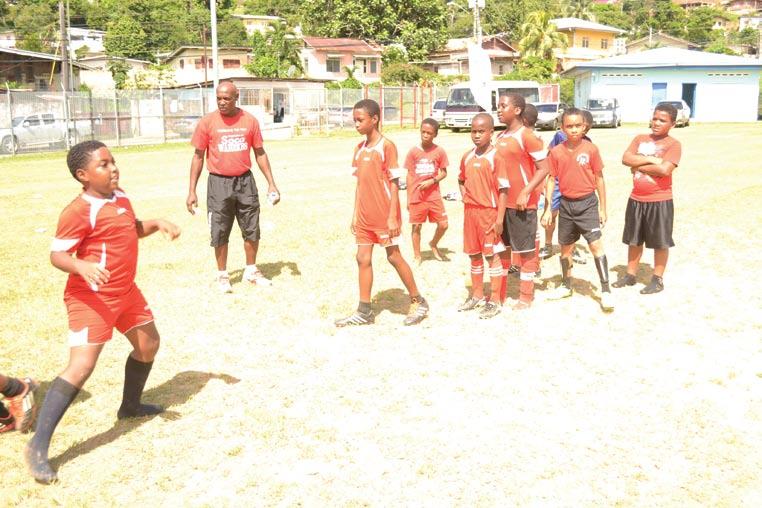
pocket, but I cannot stop now. There is need for the Role Models Football Academy to be more organized and to be able to mobilise the community behind us.
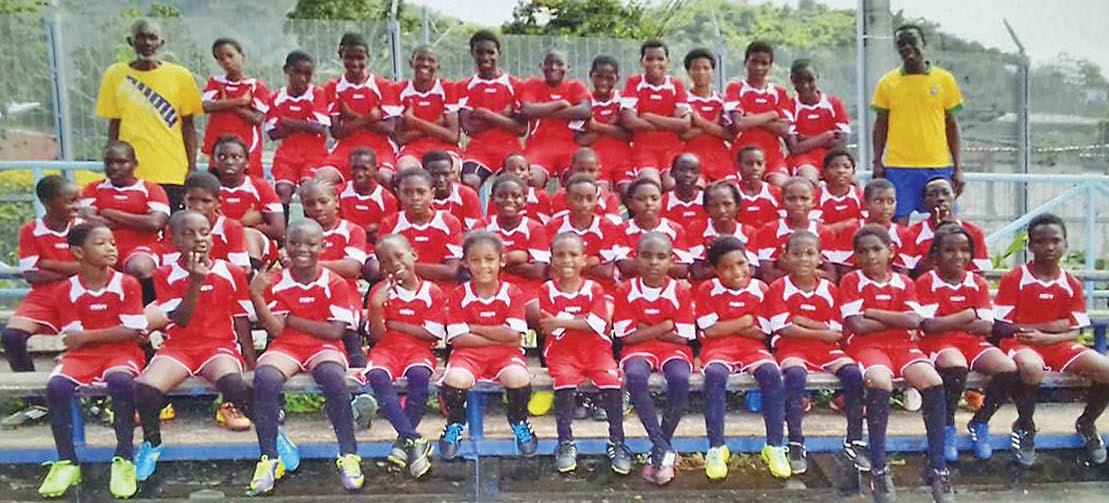
This is the real motive, community building.
Sharing the vision
My son Cleon Baptiste who works with a law firm, has registered the Role Models Football Academy as a non-profit organization. So we are ready to partner with a sponsor that would allow us to be properly administered, with good management, and to have a plan for growth and sustainability. My interest continues to be the coaching. Through that contact with children, we can provide mentorship, help them to be coordinated in movement and thought. My vision was always to keep the kids off the street, to occupy them; to help expand their minds and motivate with possibility, even international possibility. I want to see the Wall of Fame fill up with other Role Models from Carenage.
In order to build a community that supports our young people, I need the help of other members of the community. Anyone who wants to help is welcome.

Corporate Sustainability Review 57
Carenage’s young footballers in training.
ISM:
Corporate Heart & Soul
By Wendy Singh
Slow growth in some Caribbean economies, as well as credit rating downgrades of others; lower oil prices; and a lower percentage of tourist arrivals due to a slow recovery of the US and European economies; have caused companies to contract their social investment programmes as they try to come to terms with their lower profitability margins.
However, many companies are aware of the positive impact that social programmes have on their growth and they are beginning to look at creative ways to invest in their communities other than solely through monetary grants.
Companies like these are focusing more on increased volunteerism by their personnel in an effort to promote value creation through social issues such as health, education, poverty reduction and environmental protection. They realise that under the triple bottom line approach, investment in social and environmental issues is as important as economicfinancial gains. So, although profit maximization is key for ensuring business continuity, their engagement in CSR practice not only produces a positive impact for their business, but adds value to their shareholders’ investments.
Volunteering benefits organisations in many ways, as evidenced right here in the Caribbean with companies such as Scotia Bank, which is known for its unusual Volunteer programme. For instance, in Jamaica, the ‘Scotia Volunteers’ programme embodies “a novel dimension to the bank’s charity outreach” (www.scotiabank.com/jm). This was the result of a paradigm shift in its philosophy on the best way to transform the country through volunteerism. New staff members are introduced to the programme during their
orientation process, and are encouraged to become involved in projects supported by the Scotia Bank Foundation. The Bank, in turn, gives priority to these programmes through an annual internal competition, by honouring the work of staff members who advance the Foundation’s mission.
The dedication of staff at Scotia Bank is seen in the mentorship programme that they have developed to meet their commitment to recipients of scholarships. These scholars are diligently monitored and given homework assistance. The recipients are also encouraged to submit term reports and mentored if they are found to be falling behind with their school work. “Currently, over 1,000 Scotiabank staff members participate in the volunteer programme, in addition to hundreds of their close family members and scholarship recipients”. (www.scotiabank.com/jm)
The Grace & Staff Community Foundation in Jamaica matches their employees’ financial contribution to community projects 2:1.
There is an urgent need for companies to engage in CSR programmes if they are going to operate successfully in their communities. Programmes should also be linked to the UN Sustainable Development Goals and the development goals of the country, and should as such focus especially on education, poverty alleviation, health and well-being and the environment.
It should be noted that while “one-day” volunteering programmes are good for public relations, programmes that require a deeper commitment and partnering with

58 Corporate Sustainability Review
Opinion
communities throughout the year, help to build better relations and are proven to be better for business. This of course should not prevent companies from giving “one off” assistance in cases of emergencies such as environmental disaster.
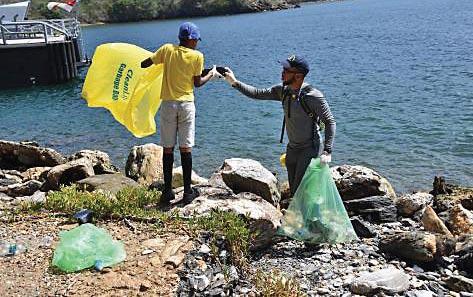
Caribbean countries as Small Island Developing States are subject to hurricanes and floods. Companies in the Caribbean have usually been very generous in providing financial assistance and even volunteering with “clean up” after floods and hurricanes. This was clear during the freak storm in some Eastern Caribbean countries, hurricanes Tomas and Matthew and the massive earthquake in Haiti. However, companies should move beyond assistance during environmental disasters by encouraging staff members to actively commit their time and energy to environmental preservation throughout the year.
In Trinidad and Tobago, RBC promotes volunteerism through various initiatives since the Bank views volunteering as “a fundamental act of citizenship” (www.rbc.com), while companies such as BG T&T and BP TT support their EmployeePartnering programmes. A UNDP publication “Corporate Volunteerism – Developing a Business Culture of Caring in Trinidad & Tobago”, published in April 2014, featured companies such as Scotia Bank, the Guardian Holdings Limited, the Association of Female Executives of Trinidad and Tobago and Digicel for their very successful volunteer programmes, however, it was found that corporate volunteerism was practiced by just under a quarter (24.7 %) of companies in this country.
One wonders why there is such hesitancy by companies to engage in more volunteerism, especially during a time of economic hardship since there are many examples of the positive impact of volunteerism on the companies, their employees and their communities.
According to the organization Frontstream, which helps both charities and corporations to fundraise, research by the Pew Research Centre has shown that “volunteering enhances employee recruitment”, especially by the estimated 54% of millennials who currently occupy the work force and are actively seeking career opportunities that will make a positive impact. It was further determined that millennials prefer being part of a company project as opposed to donating money to a campaign –hence their preference for volunteerism.
Second, it was found by the Corporate Institute in the USA that “volunteering increases employee engagement” in CSR programmes. Similar to the policy adopted by Scotia Bank as mentioned earlier, Price Waterhouse Coopers introduces new employees to its volunteer programmes during their orientation period.

Third, it was determined that volunteering is better for corporations’ bottom line. When employees volunteer, their companies are in a better position to serve the communities where they operate. Communities will likely respond favourably to companies that invest in their communities. In this way, volunteering results in a win-win situation for the company, the employees, and the communities where they operate.
In addition, research indicates that volunteerism increases employees’ morale and retention. This in turn, leads to increased efficiency. Volunteering is not only good for the company, but it is good for the individual employee since it helps them to become involved in worthy causes in their communities. In this regard, volunteering could help keep employees mentally stimulated and give them a sense of purpose, which in turn results in their health and happiness. Employee health and wellbeing are key factors to better performance at work, bringing benefit to the company.
Corporate Sustainability Review 59
EMA Volunteers in Coastal Clean Up
TT National Clean up - Chacachacare Island
A GIVING EMPLOYEE MAY BE A HAPPY EMPLOYEE
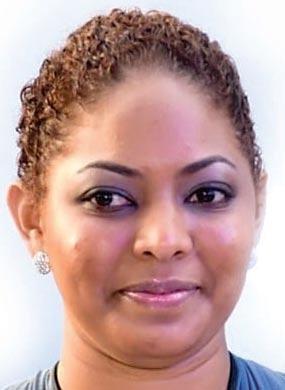
The psychology of prosocial goals and employee happiness
 By Monique Mata
By Monique Mata
Happiness is often one of the most important goals in a person’s life and prosocial or ‘giving attitudes’ have proven to be very effective in achieving it.
Often times, the list of ways a person can be prosocial or charitable is endless. How, as an organization, can you narrow down which most positively affects your employees? Although ‘employee happiness and engagement’ has been a rather loosely thrown around term in recent years, studies suggest that activities framed in concrete versus abstract terms make all the difference when it comes to having happy and engaged employees.
When it comes to business performance, all the evidence shows that happy and engaged employees far outperform and are more productive than unhappy ones. Similarly, there has been a great deal of research which highlights factors that lead to employee happiness. One of the crucial types of activities linked to employee engagement has been prosocial behaviour. The findings of this University of Zurich (UZH) study, “A Neural Link Between Generosity and Happiness,” were published online ahead of print July 11 in the journal Nature Communications. The study shows that small acts of generous behaviour cause the brain of the person giving to light up with a “warm glow” marked by increased levels of happiness. The brain imaging data also showed that Scrooge-
ish people—who acted solely out of self-interest—were less happy and did not emit a warm glow in the fMRI.
Generous behaviour tends to put one’s own resources at risk, but standard economic theories and ‘finance gurus’ have failed to clearly explain what motivates giving behaviour since this is less profitable than knowing what motivates buying behaviour. Until recent years, organizations have given less time and attention to determining what makes their employees happy, even whilst being able to see direct correlations between employee dissatisfaction and productivity. A more distinct line has often been drawn between customer-facing employee engagement and sales.
‘Prosocial behaviour’ it seems, not only benefits the recipient but the giver as well; for example, a number of researchers have shown that those who engage in volunteer work have been associated with greater happiness and fewer symptoms of depression. The difference however, between strategic planning and reality in corporate social responsibility and charitable giving is whether the act of helping a person or group becomes a source of happiness or unhappiness for the employee being drafted in to contribute. In other words, when the givers take on a largely abstract goal, it becomes easy to frustrate and disappoint employees when that goal appears to not have been accomplished.
Research suggests that simply framing prosocial goals in more concrete and achievable terms can lead to much greater satisfaction among employees and thus a more sustainable pattern of prosocial behaviour, until the company becomes
60 Corporate Sustainability Review
Opinion
known for its efforts. Employees and even customers engage better when happy, so naturally it is with great interest that every leader should desire to know whether their employees are genuinely happy and engaged.
In other words, money can buy happiness, so long as you spend the money on someone else! Understanding this, leaders could support the happiness of their employees by encouraging them to make charitable donations to, for example, a particular charity that their organization may have chosen to support.

As for the science of it all, the abovementioned neuroscience study proved that even small amounts of generosity and kindness light up the brain using fMRI. Until now, human neuroimaging studies haven’t investigated brain areas associated with generous behaviour and happiness simultaneously. Economists were keen on specifically identifying just how much or what degree of generosity was necessary to light up someone’s brain. Before the experiment began, some participants were asked to verbally commit to be generous with others. As part of the game, this group was also asked to accept slightly higher costs in order to do something nice for someone else. The control group was given instructions to self-deal and behave generously only towards themselves and to be stingy with everybody else. Then, all study participants were given a “slush fund” of money that they could spend on someone else or spend on themselves.
Throughout various aspects of this experiment, a series of decisions were made concerning generous or selfish behaviours as participants were observed in the fMRI. The researchers were able to pinpoint specific brain areas that lit up during times of generosity. Altruism and overcoming egocentricity bias have previously been correlated with functional activity and structural properties of the temporoparietal junction (TPJ). As would be expected, the TPJ lit up when people displayed prosocial behaviours and generosity by giving to others during the game. Rewardrelated brain areas such as the ventral striatum and the
orbitofrontal cortex (OFC) are correlated with feeling good and also lit up when someone was being generous.
One of the most surprising aspects of this study is that the amount of generosity did not correlate directly with the degree of someone’s happiness or contentment. Very small amounts of generous behaviour could elicit the warm glow of feeling happy. Interestingly, the researchers also found that simply making a verbal commitment to behave more generously in the future activated altruistic areas of the brain and intensified the warm glow within brain areas associated with positive emotions.
These findings can have a big impact on employees when strategic goals for corporate social responsibility are framed in concrete terms. Some examples include IBM’s programme “Celebration of Service” that allows employees to volunteer to extend social good to societal issues and managed to log over 300,000 hours. Verizon matches employee donations to various organizations 1:1 and also encourages employees to volunteer. Tom’s “One for One” gives a number of its products to children in need which its employees travel and deliver year round. There is opportunity here to also apply these results to other areas of the business such as marketing and advertising when they targets personal goals of a consumer (for example Coca Cola’s “Have a coke and smile”).
When applied to employees and engagement, organizations don’t need to shell out hundreds of thousands in nonimpactful donations. What becomes more important and beneficial to the company, and by extension the happiness of its employees, are clear and meaningful acts of generosity. Delivering on social responsibility plans that are concrete, simple and easy to measure create the ultimate win-win. We know that civil society benefits when all of us are cooperative and generous in some way, but it’s also nice to have evidence that reminds us all that even the most miniscule amounts of day-to-day prosocial behaviour and giving attitudes can trigger neurobiological changes in the brain that are clinically proven to increase happiness and contentment. After all, isn’t happiness what we all search for?
Corporate Sustainability Review 61
SO YOU CALL THIS
By James Epstein-Reeves
It’s not a good sign when an entire profession can’t agree on what to call itself. Here’s a short list: Corporate responsibility (CR), sustainability, corporate social responsibility (CSR), sustainable development, corporate accountability, creating shared value (CSV), citizenship and just plain social responsibility. These are all terms that are thrown about with nothing but the glue of disagreement about their ultimate meanings to hold them together.
In large part these terms are synonymous and therefore interchangeable. But if you’ve ever held a debate about what the minor difference are, if you’re like me, it gets pretty tiring. So what’s a CSR/CSV/CR, etc., professional supposed to do? My advice is to pick one (or two as the case may be) . . . and move on.
For me, describing what it is that I do has been an evolution over the course of my career. Lately I’ve actually picked two of these terms, a term I wish I could use and a term I have to use, sustainability being the former and corporate responsibility the latter.
Over the past year or so, I’ve been trying on these choices like different shirts. At networking events, conferences and
CSR
cocktail parties, I found that anytime I answered the inevitable question, “So what do you do?” with “CSR,” philanthropy was always the next topic of conversation, much to my dismay.
You see, CSR is much broader than philanthropy. Rather, CSR looks to change business operations in a way that maximizes a company’s benefits to society and minimizes the risks and costs to society—all while keeping the company focused on creating business and brand value. The idea that a company can be socially responsible while only and exclusively focusing on philanthropy is as old-fashioned as my grandmother serving me Ovaltine while we huddle around waiting for the latest news from the telegraph.
But the term CSR, at least here in the United States, is the equivalent of good comfort food. It’s probably the most widely used term stateside, even if it’s often misunderstood by non-practitioners. So I tried a little experiment and found that the term “corporate responsibility” tends to thwart the immediate association with philanthropy. Perhaps this is due to the mere omission of the word “social.” I’m then freed up to segue the discussion into describing what the field does,
rather than spending time explaining that our work is bigger than a company’s philanthropic efforts.
Sustainability, on the other hand, is the more widely term used in Europe and is also my more favoured term. And it’s not my favourite simply because I regularly take “mental vacations” and imagine myself nibbling Parisian croissants by the Seine. Rather, sustainability connotes that a company is truly incorporating social and environmental issues into its business model.
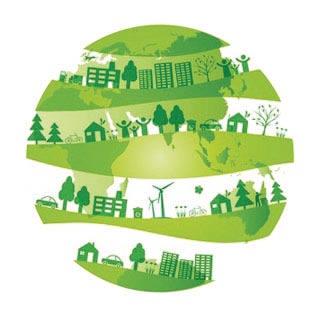
CSR or CR tends to be a collection of programs that address social and environmental concerns. Sustainability, however, makes these issues a part of the company’s DNA. And ultimately, that is what my profession is striving toward: making sustainability “business as usual.”
What about you? If you’re a sustainability professional, what term do you use? If you’re not involved in the profession day-to-day, what terms confuse you or, alternatively, resonate with you?
This is a reprint of the 2011 Forbes CSR Blog by James Epstein-ReevesCorporate social responsibility.
James Epstein-Reeves is a Chicago-based expert on corporate social responsibility, philanthropy, and cause-marketing. James started his career in the think-tank world of Washington, DC researching corporate social responsibility and public policy. He is the co-author of the 2002 book Corporate Responsibility in the Global Village which looks at government-led initiatives in Europe and North America that promote socially and environmentally responsible practices among businesses operating overseas. You can Tweet James at James Epstein-Reeves (@ChicagoCSR).
62 Corporate Sustainability Review
Opinion
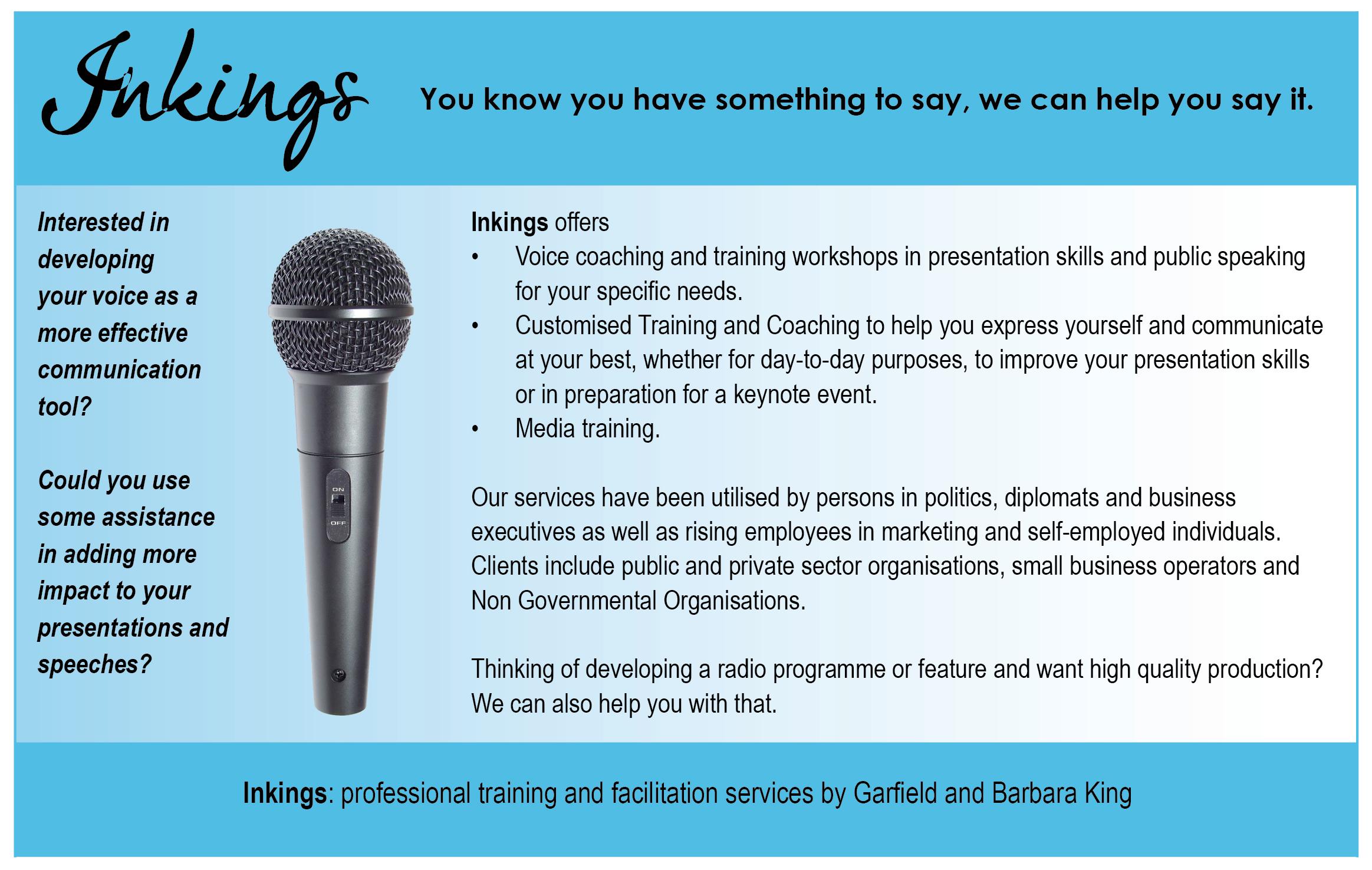



TRINIDAD AND TOBAGO CORPORATE CSR DIRECTORY
Name: Ansa Mcal Group of Companies
Address: Head Office, 11th Floor Tatil Building, 11 Maraval Road, Port of Spain
Contact: Ms. Sharon Balroop
Position: Manager, Corporate Communications
Phone: (868) 625-3670/ (868) 624-8753
E-Mail: Sharon.Balroop@ansamcal.com
Web: www.ansamcal.com
Name: Angostura Group of Companies
Address: Corner Eastern Main Road and Trinity Avenue, Laventille
Contact: Ms. Giselle Laronde-West
Position: Senior Manager, Public Affairs & Communications
Phone: (868) 623-1841 Ext. 257; (Fax) (868)-623-1847
E-Mail: glarondewest@angostura.com
Web: www.angostura.com
Name: Atlantic LNG
Address: Princes Court, Cor. Keate and Pembroke Streets, Port of Spain
Contact: Ms. Camille Salandy
Position: Head of Sustainability & Corporate Operations
Phone: (868) 624-2916; (Fax) (868) 624-8057
E-Mail: csalandy@atlanticlng.com
Web: www.atlanticlng.com
Name: Shell Trinidad
Address: 5 St. Clair Avenue, Port of Spain
Contact: Mr. Leslie Bowrin
Position: Head, Social Performance
Phone: (868) 628-0888; (Fax) (868) 622-6520
E-Mail: leslie.bowrin@bg-group.com
Web: www.bg-group.com
Name: BHP Billiton Trinidad &Tobago
Address: Invaders Bay Tower, Audrey Jeffers Highway, Port of Spain
Contact: Ms. Carla Noel-Mendez
Position: External Affairs/Community Manager, TTPU
Phone: (868) 821-5146 (Fax) (868) 635-9255
E-Mail: Carla.Noel-Mendez@bhpbilliton.com
Web: www.bhpbilliton.net
Name: BP Trinidad & Tobago LLC
Address: 5-5a Queen’s Park West, Port of Spain
Contact: Ms. Ronda Francis
Position: Manager, Corporate Responsibility
Phone: (868) 623-2862
E-Mail: franrh@bp.com
Web: www.bp.com
Name: Blink|B-Mobile (Foundation)
Address: TSTT House, 1 Edward Street, Port of Spain
Contact: Ms. Anjanie Ramesar Soom
Position: Manager, Corporate & Community Affairs
Phone: (868) 624-5703; (Fax) (868) 623-3836
E-Mail: aramesa@tstt.co.tt
Web: www.tstt.co.tt
Name: Blue Waters
Address: #2 Orange Grove Estate, Trincity
Contact: Mr. Pradeep Suvrin
Position: Sales & Marketing Manager
Phone: (868) 640-8824; (868) 289-8824
E-Mail: Pradeepsuvrin@bluewatterstt.com
Web: www.bluewaterstt.com
Name: Carib Glassworks Ltd.
Address: Eastern Main Road, Champs Fleurs
Contact: Mr. David Hadeed
Position: Marketing Manager
Phone: (868) 662-2231
E-Mail: david.hadeed@ansamcal.com
Web: www.caribglass.com
Name: Caribbean Airlines Ltd.
Address: Piarco International Airport, Piarco
Contact: Ms. Alicia Cabrera
Position: Senior Marketing Manager
Phone: (868) 669-3000 Ext. 2992; (Fax) (868) 669-1520
E-Mail: aliciacabrera@caribbean-airlines.com
Web: www.caribbean-airlines.com
64 Corporate Sustainability Review
Directory
Name: Centrica T&T Limited
Address: Eleven Albion, Corner Albion and Dare Street, Port of Spain
Contact: Mr. Ko Jacobs
Position: Country Manager
Phone: (868) 821-700
E-Mail: ko.jacobs@centrica.com
Web: www.centrica.com
Name: Citibank (Trinidad & Tobago) Limited
Address: 12 Queen’s Park East, Port of Spain
Contact: Ms. Lesley Taylor-Gouveia
Position: Public Affairs Officer
Phone: (868) 625-1040 Ext. 6906
E-Mail: Lesley.taylorgouveia@citi.com
Web: www.citibank.com/trinidad
Name: CL Financial Group
Address: 29 St. Vincent Street, Port of Spain
Contact: Ms. Crystal Lapope-Bradshaw
Position: Senior HR Officer
Phone: (868) 625-4444, Ext. 1217
E-Mail: crystall@clico.com
Web: www.clico.com
Name: Colonial Life Insurance Company (Trinidad) Limited
Address: 29 St. Vincent Street, Port of Spain
Contact: Mr. Gerard Barnes
Position: Senior Manager, Corporate Communications
Phone: (868) 625-4444 Ext. 1530; (Fax) (868) 625-4440 Ext 1621
E-Mail: gbarnes@clico.com
Web: www.clico.com
Name: Columbus Communications Trinidad Ltd. (FLOW)
Address: 29 Victoria Square, Port of Spain
Contact: Ms. Monique Mata
Position: Corporate Social Performance Specialist
Phone: (868) 224-2348
E-Mail: mmata@columbustrinidad.com
Web: www.columbustrinidad.com
Name: Courts/UNICOMER (Trinidad) Ltd
Address: 22 Mulchan Suchan Road, Chaguanas
Contact: Ms. Bhano Surujbally
Position: Marketing Unit
Phone: (868) 672-7577; ext. 2317; (Fax) (868) 672-1984
E-Mail: tbhano_surujbally@unicomer.com
Web: www.unicomer.com www.shopcourts.com
Name: Dansteel Ltd.
Address: South Trunk Road, La Romain
Contact: Mr. B. John
Position: Marketing Manager
Phone: (868)- 627-8335; (868) 623-6731
E-Mail: bjon@bhsil.com
Name: Digicel Trinidad & Tobago Ltd
Address: Ansa Centre, 11C Maraval Road, Port of Spain
Contact: Ms. Penny Gomez
Position: Corporate Communications Manager
Phone: (868) 355-5508
E-Mail: penny.gomez@digicelgroup.com
Web: www.digiceltt.com
Name: Direct TV Trinidad Limited
Address: 31 Mulchan Seuchan Road, Chaguanas
Contact: Ms. Tamara Ragoonath
Position: Marketing Manager
Phone: (868) 672-8111 Ext. 1410
E-Mail: tragoonath@directvtt.com
Web: www.directvcaribbean.com
Name: EOG Resources Trinidad Ltd.
Address: 10-12 Sweet Briar Road, St. Clair
Contact: Ms. Lisa Steele Pujadas
Position: Mgr. Corporate Communications & External Affairs
Phone: (868) 622-8653 Ext. 25652
E-Mail: lisa_steele-pujadas@eogresources.com
Web: www.eogresources.com
Name: First Citizens Bank
Address: 2nd Floor, DHL Building, Cor. Churchill Roosevelt Highway & El Socorro Extension Road, El Socorro
Contact: Ms. Jennifer Armstrong Khan
Position: Senior Communications Officer
Phone: (868) 623-4778 Ext. 5857
E-Mail: Jennifer.Armstrong-Khan@firstcitizenstt.com
Web: www.firstcitizens.com
Name: Flavorite Foods
Address: 128 Boundary Road, San Juan, PO Box 597, POS
Contact: Mr. Keenon Roper
Position: Marketing Manager
Phone: (868) 638-2236/7, 2221
E-Mail: kroper@flavoritefoodstt.com
Web: www.flavoritefoodstt.com
Corporate Sustainability Review 65
Name: HCL Group of Companies
Address: Long Circular Mall, Long Circular Road, St. James
Contact: Mr. Colin Carty
Position: Marketing Manager
Phone: (868) 622-4925; (Fax) (868) 628-7156
E-Mail: colin.carty@hcltt.com
Web: www.hcltt.com
Name: Happi Products
Address: 82 Bamboo Settlement #2, Valsayn
Contact: Mr. Brent Salick
Position: General Manager
Phone: (868) 645-5040, 645-5041, 645-5365
E-Mail: brent@happiproducts.com
Web: www.happiproducts.com
Name: Hilton Trinidad Hotel & Conference Centre
Address: 18 Lady Young Road, Belmont
Contact: Ms. Darlene McDonald
Position: Director, Sales and Marketing
Phone: (868) 624-3211 Ext. 6210
E-Mail: darlene.mcdonald@hilton.com
Web: www.hiltontrinidadhotel.com
Name: Hyatt Regency Hotel
Address: 1 Wrightson Road, Port of Spain
Contact: Ms. Neemah Persad-Celestine
Position: Marketing Manager
Phone: (868) 623-2222 Ext. 6467; (Fax) (868) 821-6401
E-Mail: neemahpersad.celestine@hyatt.com
Web: www.trinidad.hyatt.com
Name: IBM World Trade Corporation
Address: 91-93 St. Vincent Street, Port of Spain
Contact: Ms. Seiske Roberts
Position: Manager of Human Resources & Brand Services
Phone: (868) 624-5110 Ext (9) 6153; (Fax) (868) 625-6971
E-Mail: robertss@tt.ibm.com
Web: www.ibm.com
Name: K C Confectionery
Address: 95-97 Southern Main Road, Couva
Contact: Ms. Sharon Shah
Position: HR Manager
Phone: (868) 636-2360 ext. 229/3061
E-Mail: hr@kccandy.com
Web: www.kccandy.com
Name: Kenson Group of Companies
Address: 64-84 Lady Hailes Avenue, San Fernando
Contact: Ms. Nikeda Baker
Position: Human Resources Manager
Phone: (868) 657-2457; (868) 652-0095; (Fax) (868) 652-5906
E-Mail: nikeda_baker@kenson.co.tt
Web: www.kenson.co.tt
Name: Maritime Financial Group
Address: Maritime Centre, 29th Tenth Avenue, Barataria
Contact: Ms. Mika Ella Tang
Position: Marketing Coordinator
Phone: (868) 674-0130; (Fax) (868) 638-6663
E-Mail: mikatang@maritimefinancial.com
Web: www.maritimefinancial.com
Name: Methanex Trinidad Ltd.
Address: Maracaibo Drive, Pt. Lisas Industrial Estate, Couva
Contact: Ms. Deborah Samaru
Position: Manager, Public Affairs
Phone: (868) 679-4400; (Fax) (868) 679-2400
E-Mail: dsamaru@methanex.com
Web: www.methnex.com
Name: National Flour Mills Ltd.
Address: 27-29 Wrightson Road, Port of Spain
Contact: Ms. Cheryl Lee Kong
Position: Marketing Manager
Phone: (868) 625-2416
E-Mail: cheryl.leekong@nfm.co.tt
Web: www.nfm.co.tt
Name: The National Gas Company
Address: Orinoco Drive, Point Lisas Industrial Estate, Couva
Contact: Ms. Christine Punnett
Position: Head, External Communications
Phone: (868) 636-4662; (Fax) (868) 679-2384
E-Mail: ChristineP@ngc.co.tt
Web: www.ngc.co.tt
Name: National Lotteries Control Board
Address: 119-121 Duke Street, Port of Spain
Contact: Ms. Amryl Rivers Rodriguez
Position: Marketing & Public Relations Officer
Phone: (868) 623-1831; (Fax) (868) 627-8030
Web: www.nlcb.co.tt
66 Corporate Sustainability Review
Name: Massy Group of Companies
Address: Level 1, Uptown Mall, Edward Street
Contact: Ms. Candace Ali
Position: Group Communication Officer
Phone: (868) 625-3426; (Fax) (868) 627-9061
E-Mail: candice.ali@massygroups.com
Web: www.neal-and-massy.com
Name: Nestle Trinidad & Tobago Ltd.
Address: Church Roosevelt Highway, Valsayn
Contact: Ms. Denise D’Abadie
Position: Manager, Corporate Social Responsibility
Phone: (868) 663-6832; (Fax) (868) 663-6840
E-Mail: denise.dabadie@cbr.nestle.com
Web: www.nestle.com
Name: Oscar Francois Ltd.
Address: 133-135 Duke Street, Port of Spain
Contact: Ms. Jackie Francois
Position: Chief Executive Officer
Phone: (868) 225-1635
E-Mail: info@oscarfrancois.com
Web: www.oscarfrancois.com
Name: Pan American Life Insurance (formerly ALGICO)
Address: 91-93 St. Vincent Street, Port of Spain
Contact: Ms. Cheryl-Ann Jordan
Position: VP, Human Resources
Phone: (868) 625-4426 ext. 3081
E-Mail: cjordan@palig.com
Web: www.palig.com
Name: Petroleum Company of T&T (Petrotrin) Ltd.
Address: #31 Casuarina Ave, Pointe-a-Pierre
Contact: Ms. Gillian Friday
Position: Manager, Corporate Communications
Phone: (868) 658-4200 Ext. 2026; (Fax) (868) 658-3775
E-Mail: gillian.friday@petrotrin.com
Web: www.petrotrini.com
Name: Power Generation Company of T&T (Powergen) Ltd.
Address: 6a Queen’s Park West
Contact: Ms. Sonya Lequay
Position: Communications Manager
Phone: (868) 624-0383; (Fax) (868) 625-0983
E-Mail: selequay@powergen.co.tt
Web: www.powergen.co.tt
Name: Repsol T&T Ltd.
Address: Repsol Tower, 4 Queen’s Park West, Port of Spain
Contact: Ms. Heidi Diquez
Position: Mgr. Corporate Communications & External Affairs
Phone: (868) 623-2244; (868) 623-1770; Fax) (868) 627-2753
E-Mail: HDIQUEZD@repsol.com
Web: www.repsol.com
Name: RBTT Financial (Caribbean) Limited
Address: St. Clair Place, 7-9 St. Clair Avenue, Port of Spain
Contact: Ms. Wendy Alleyne
Position: Senior Manager Brand and CSR
Phone: (868) 623 1322; (868) 624 7288
E-Mail: anna-maria.kurbanali@rbc.com
Web: www.rbc.com
Name: Republic Bank Limited
Address: 9-17 Park Street, Port of Spain
Contact: Ms. Tisha Lee
Position: Group Corporate Communications Manager
Phone: (868) 625-4411; (868) 625-4425
E-Mail: tlee@republictt.com
Web: www.republictt.com
Name: S.C.G International Limited
Address: #5 Keate Street, Port of Spain
Contact: Ms. Ray Pan
Position: Marketing Manager
Phone: (868) 625- 7388/ (868) 780- 8252
Fax: (868) 623- 4056
E-Mail: info@scg.caribbean.com
Web: www.scg.caribbean.com
Name: Sagicor Life Inc. (Trinidad & Tobago)
Address: 16 Queen’s Park West, Port of Spain
Contact: Ms. Marlene Chin
Position: Manager, Corporate Communications
Phone: (868) 628-2652; (868) 624-4754
E-Mail: Marlene-Chin@sagicor.com
Web: www.sagicorlife.com
Name: Scotiabank Trinidad & Tobago Ltd.
Address: 56-58 Richmond Street, Port of Spain
Contact: Ms. Heidi Batson
Position: Marketing Manager
Phone: (868) 627-2684; (868) 625-3566; (Fax) (868) 627-5278
E-Mail: Heidi.batson@scotiabank.com
Web: www.scotiabank.com
Corporate Sustainability Review 67
Name: SM Jaleel & Company Limited
Address: Otaheite Industrial Estate, South Oropouche
Contact: Mr. Naim Mohammed
Position: Group Head of Recruitment & Employer Branding
Phone: (868) 677-7520; (868) 677-7523; (Fax) (868) 677-7825
E-Mail: roger.bertely@smjaleel.com
Web: www.smjaleel.com
Name: Telecommunications Services of Trinidad & Tobago (TSTT)
Address: 52 Jerningham Avenue, Belmont
Contact: Ms. Camile Campbell
Position: Marketing Officer
Phone: (868) 624-8788; (868) 800-2255
E-Mail: ccampbe1@tstt.co.tt
Web: www.tstt.co.tt
Name: Trinidad Cement Ltd.
Address: Southern Main Road, Claxton Bay
Contact: Ms. Maria Lewis
Position: Community Relations Officer
Phone: (868) 659-2381
E-Mail: marial@tclgroup.com
Web: www.tcl.co.tt
Name: Trinidad & Tobago National Petroleum Company (NP)
Address: Sea Lots, Port of Spain
Contact: Ms. Rae Kelly Gilbert
Position: Manager, Corporate Communications
Phone: (868) 625-1364
E-Mail: rgilbert@np.co.tt
Web: www.np.co.tt
Name: Trinidad & Tobago Electricity Commission (T&TEC)
Address: 63 Frederick Street, Port of Spain
Contact: Ms. Annabelle Brasnell
Position: Corporate Communications Manager
Phone: (868) 623-6291; (Fax) (868) 624-3724
E-Mail: abrasnell@ttec.co.tt
Web: www.ttec.co.tt
Name: Trinidad & Tobago Postal Corporation (TT Post)
Address: Golden Grove Road, Piarco
Contact: Mr. Ryan David
Position: Business Development Manager
Phone: (868) 669-5361/ (868) 800-7678
E-Mail: ryan.david@ttpost.net
Web: www.ttpost.net
Name: Trinidad & Tobago Unit Trust Corporation (UTC)
Address: 82 Independence Square, Port of Spain
Contact: Mr. Rory Rostant
Position: Assistant VP, Marketing Communications
Phone: (868) 625-8648
E-Mail: rgerald@ttutc.com
Web: www.ttutc.com
Name: Unilever Caribbean Ltd.
Address: Eastern Main Road, Champs Fleurs
Contact: Ms. Helen Julien
Position: Administrative Assistant, HR Department
Phone: (868) 663-1787 Ext. 2205; (Fax) (868) 662-1780
E-Mail: Helen.julien@unilever.com
Web: www.unilever.tt
Name: West Indian Tobacco Company (WITCO)
Address: Eastern Main Road, Champs Fleurs
Contact: Ms. Josiane Khan
Position: Corporate & Legal Services
Phone: (868) 662-2271/72
E-Mail: josiane_khan@ttma.com
Web: www.ttma.com
Name: Water & Sewerage Authority (WASA)
Address: Eastern Main Road, St. Joseph
Contact: Mr. Daniel Plenty
Position: Senior Manager
Phone: (868) 662-9272; (868) 223-1000-6
E-Mail: Plen1059@wasa.gove.tt
Web: www.wasa.gov.tt
To get listed here, email: team@virtual-tt.com
68 Corporate Sustainability Review

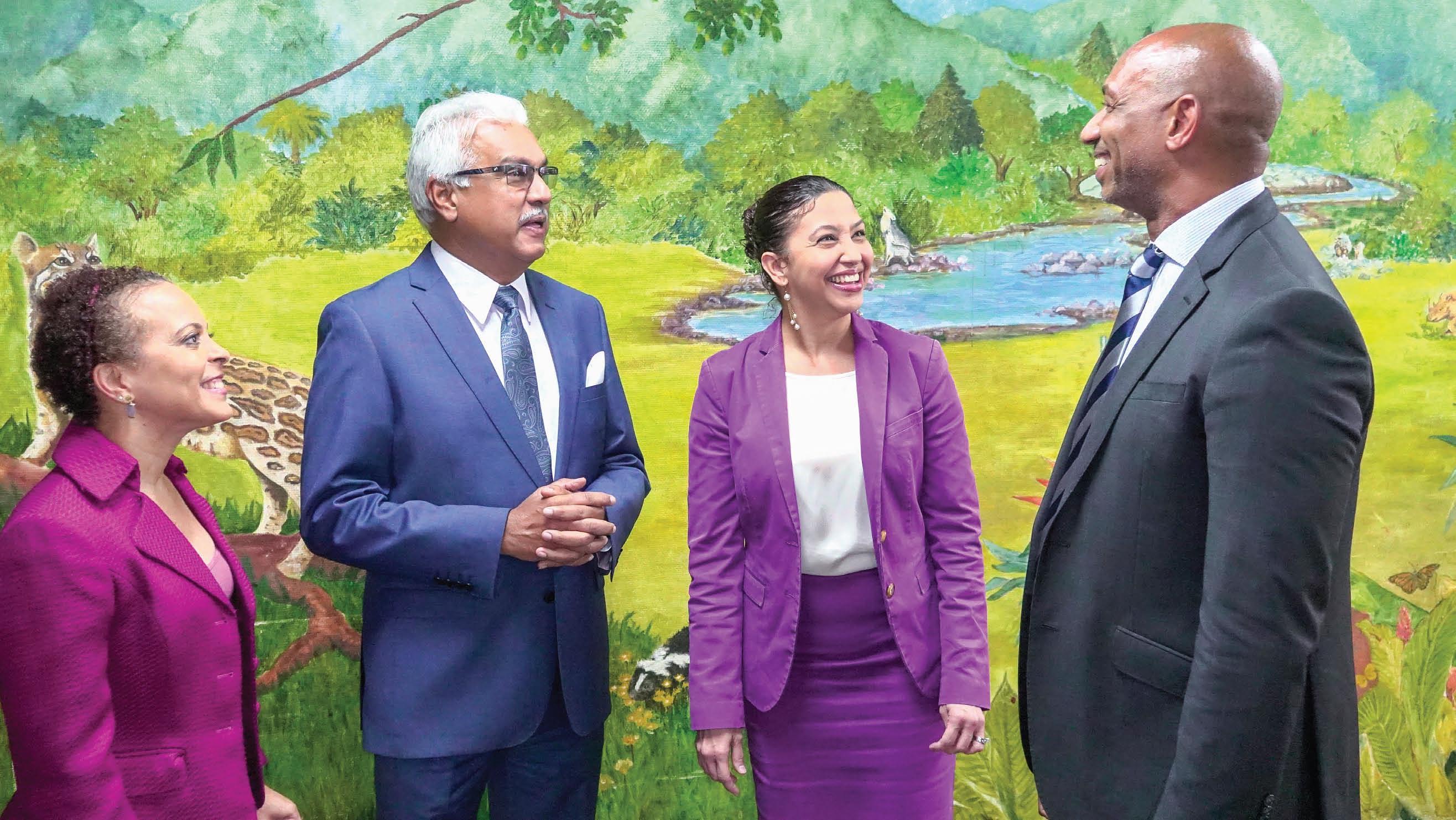


























































 Jason Julien
Jason Julien





















































 By Monique Mata
By Monique Mata










